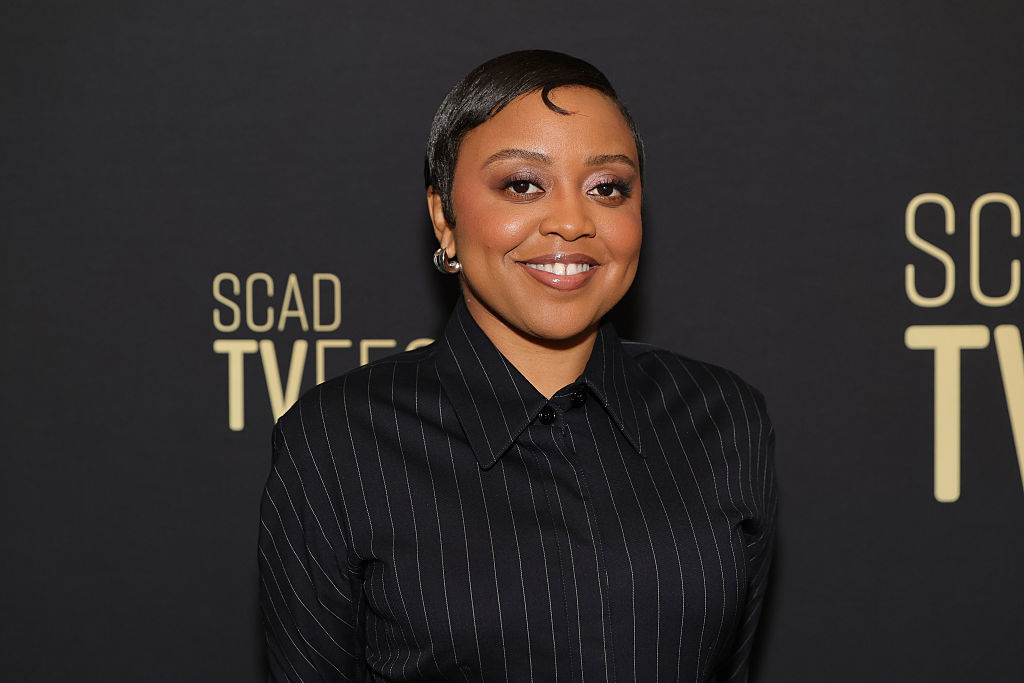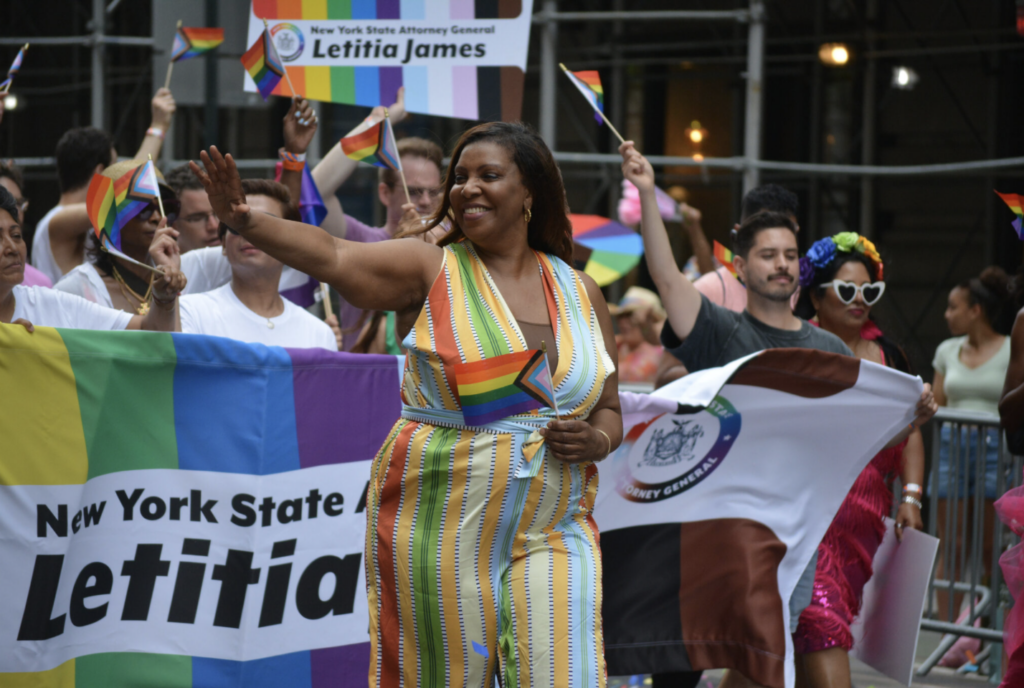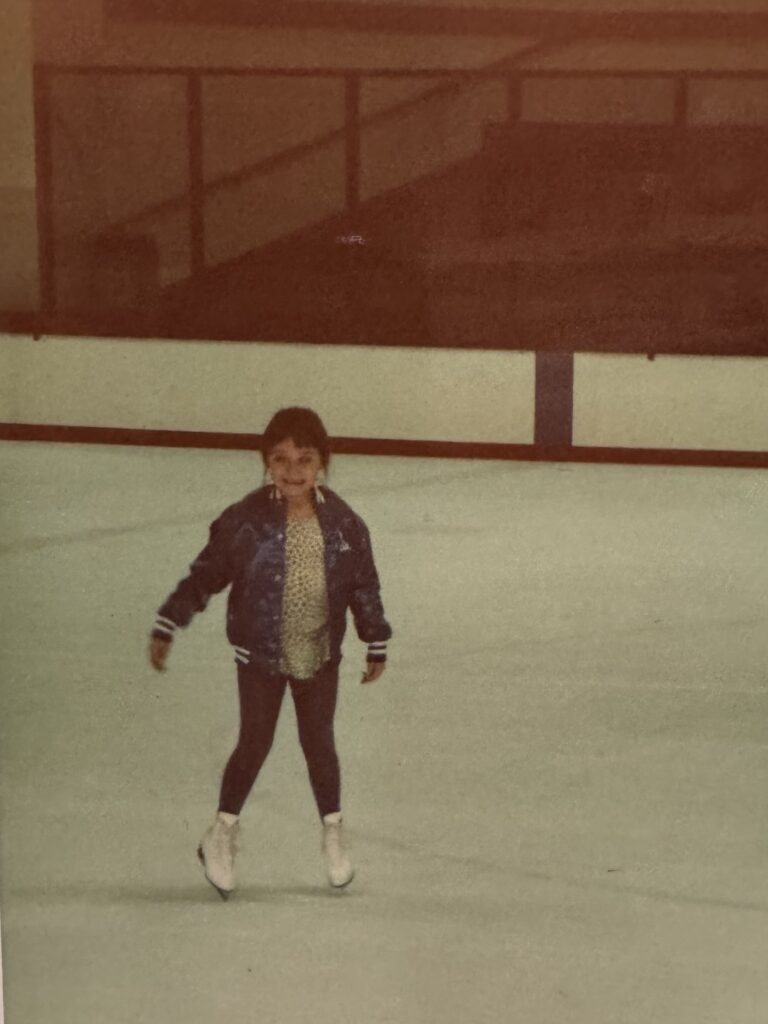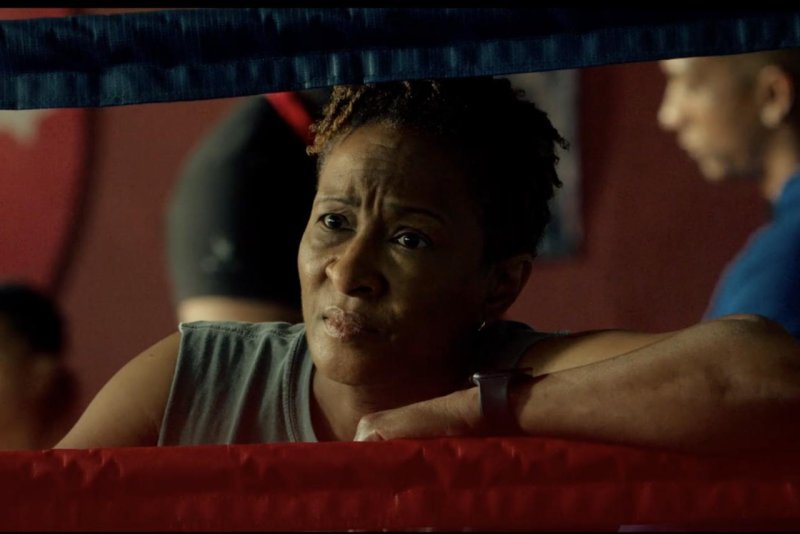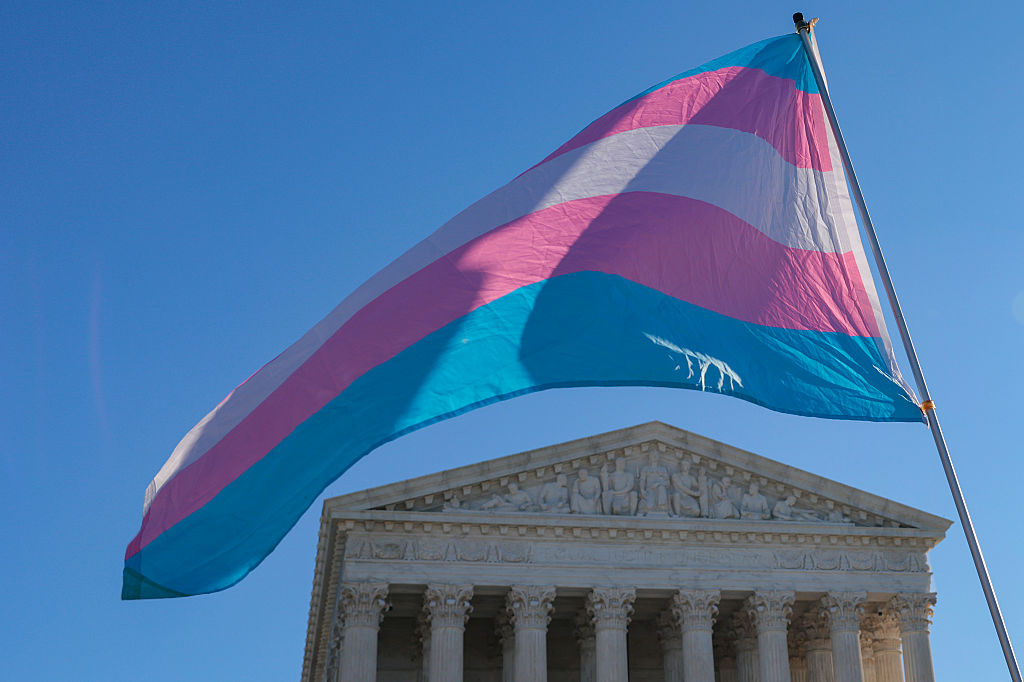100 Women We Love: Class of 2019
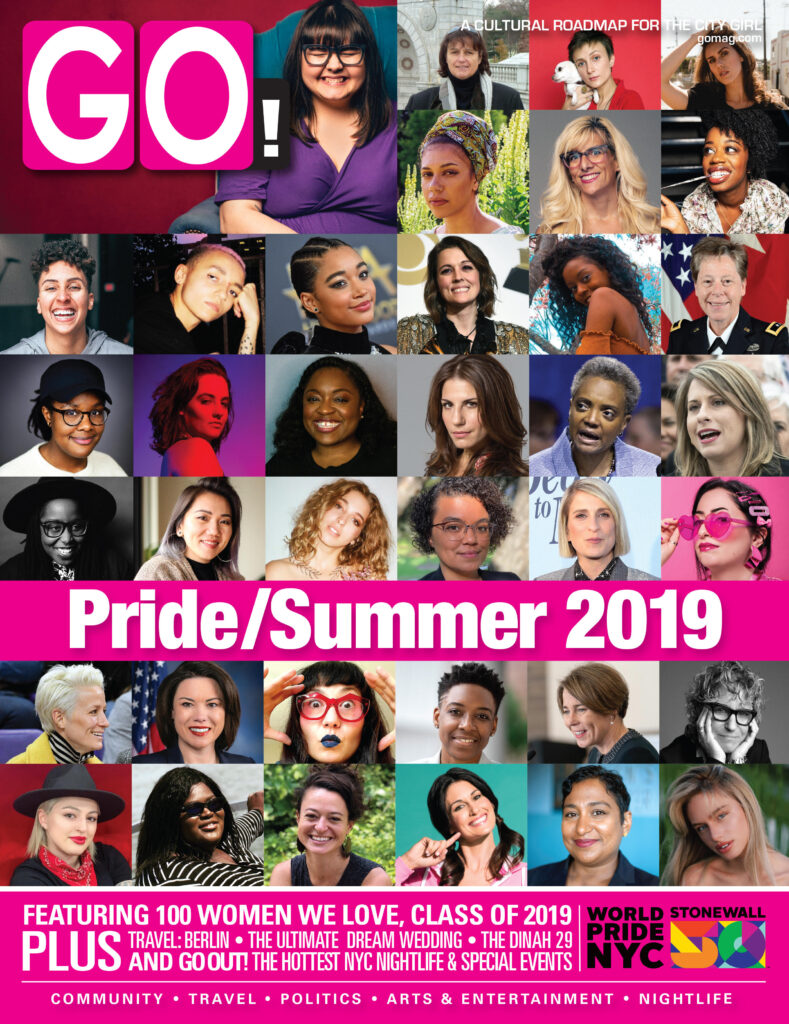
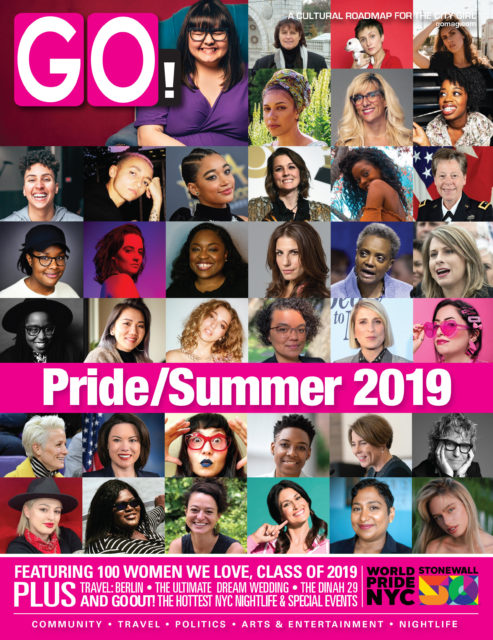
We are thrilled to present this year’s 100 Women We Love—a diverse group of out entertainers, athletes, artists, activists, business leaders, and elected officials. Each one of these women, in her own unique way, is a role model who exemplifies the best of the LGBTQ community. Their achievements enrich our lives and make our world a better place. Their contributions help to raise awareness, increase our visibility, and accelerate our progress to-ward equality.
There are no rankings or numbers. We salute them all!

Amandla Stenberg
Amandla Stenberg won acclaim for her portrayal of a young African-American woman who witnesses the killing of her friend at the hands of police in last year’s “The Hate U Give.” Like her character in the movie that made her a star, Stenberg is not afraid to speak out. Her Twitter feed addresses weighty social topics like intersectional feminism, biracial and sexual identifies, and cultural appropriation, as with her satiric viral video, “Don’t Cash Crop My Corn Rows.” In 2018, Time Magazine hailed her as a “next generation leader.” In addition to Teen Choice and BET awards, Stenberg has been honored with NAACP Image awards and, this past February, became the recipient of the Human Rights Campaign’s 2019 Visibility Award. It may be easy to imagine that Stenberg has always been confident in her own skin, but as she said in an interview with Wonderland in 2018, “[t]he continual process of unlearning heteronormativity and internalized homophobia can be difficult, but one of the biggest blessings lies in the magic that comes from having to understand love outside of the confines of learned heterosexual roles… Once I was able to rid myself of those parameters, I found myself in a deep well of unbounded and untouchable love free from the dominion of patriarchy.” —RK
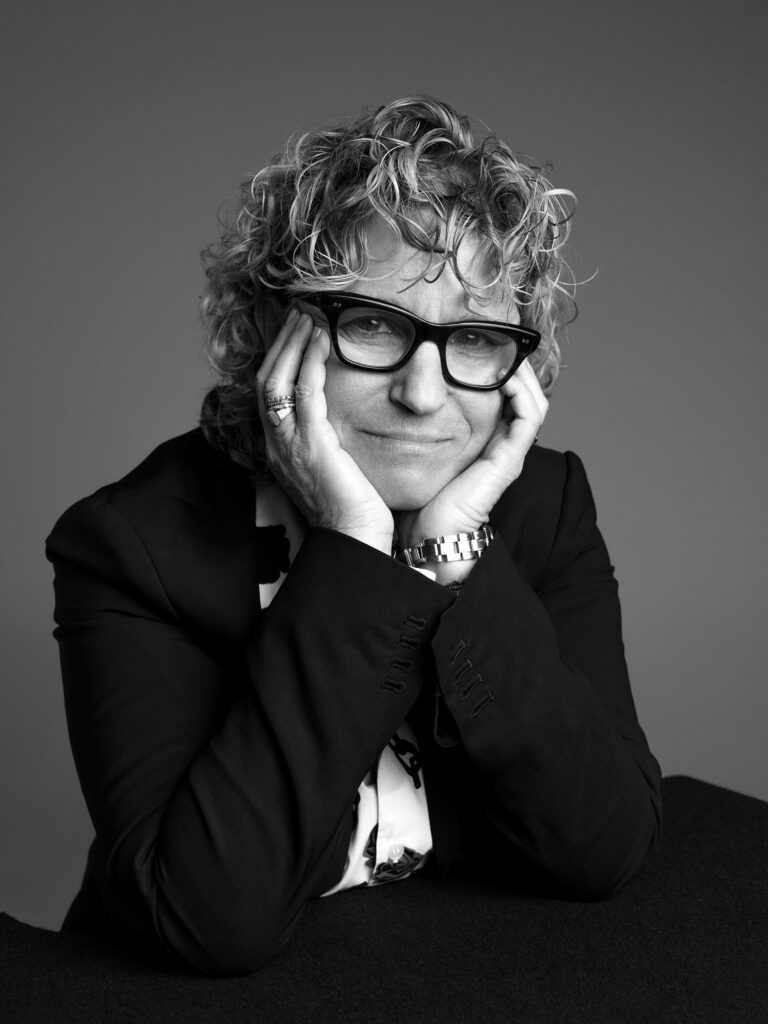
Claudia Eller
Diversity and inclusion aren’t always synonymous with the entertainment industry, but Variety’s Editor-in-Chief Claudia Eller is determined to change that. For her, making Hollywood a more inclusive space is both a personal and professional passion. “The most rewarding part of my work,” she tells GO, “is sharing the stories of women, people of color, those from the LGBTQ community and others in entertainment media. Providing a platform for those who might not otherwise have one is something of a top priority for me as editor.” As one of the most respected entertainment journalists in the business, Eller is no stranger to the changing dynamics of the industry. As a reporter and editor at the Los Angeles Times, she covered the ways Hollywood altered its business practices in light of economic and technological innovations. Now at Variety, diversity and inclusion are her top priorities. “I’m very proud of the cover stories and comprehensive packages that we have published over the years,” she says, “including our upcoming Power of Pride issue and past editions that focused on Transgender Hollywood, marriage equality, and lack of diversity and gender parity throughout the movie, television, music, and other business sectors we cover.” For her work, the Association for LGBTQ Journalists (NLGJA), honored her with its 2019 Lisa Ben Award for Achievement in Features Coverage. —RK
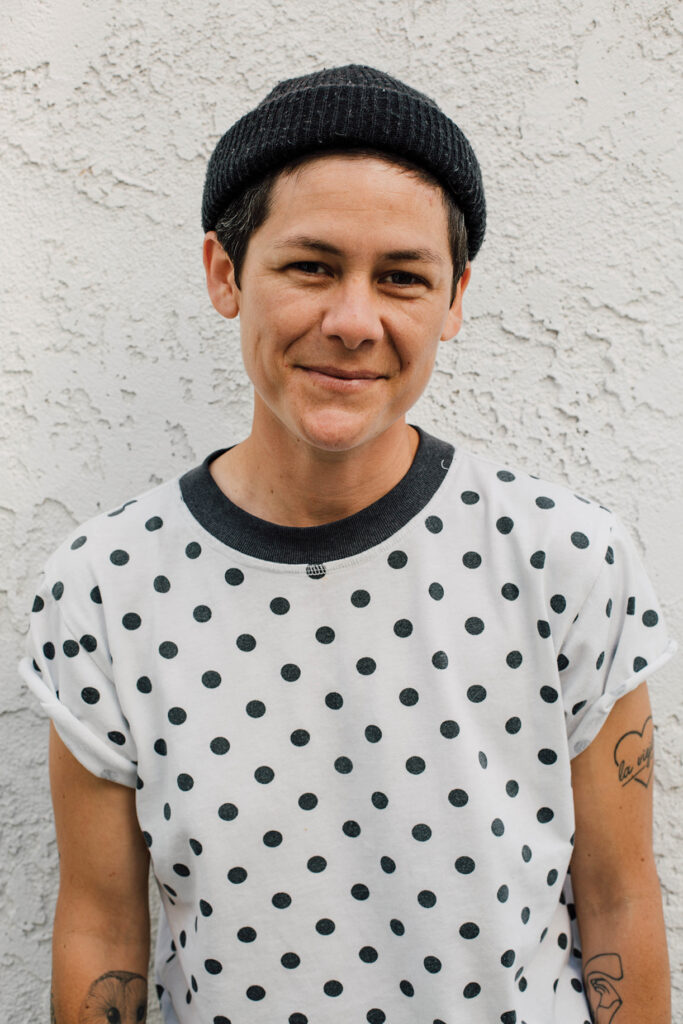
Vanessa Torres
The first year the X Games featured female skateboarders was 2003, and Vanessa Torres showed the world how it was done. Torres placed first and won gold in the street event. “Skateboarding chose me,” says the powerhouse, who is considered one of the top female skateboarders in the world. “It owes me nothing and has given me everything.” Torres has been featured in several women’s skateboarding videos including “AKA: Girl Skater,” “Getting Nowhere Faster,” and “Quit Your Day Job.” She also shows up in video game form in Tony Hawk’s “Proving Ground” as only the third female playable skater to appear in this series of games. Her sponsorships include Meow Skateboards, Kingswell Shop, and CHPO Brand. But, “I am not just a professional skateboarder,” Torres declares. “I recognize my privilege and am here to utilize my platform and presence in this world to uplift, support, and empower all of you, as you have done so lovingly for me.” Torres has always felt inspired and encouraged to be her “most authentic self,” she tells GO. The most rewarding aspect of her work, she says, is all about recognizing the importance of her presence, the power and impact that has on her community, and the “the privilege of having a voice to shine light and bring awareness on what really matters,” she says. “I see you. I love you. Thank you.” —JDG
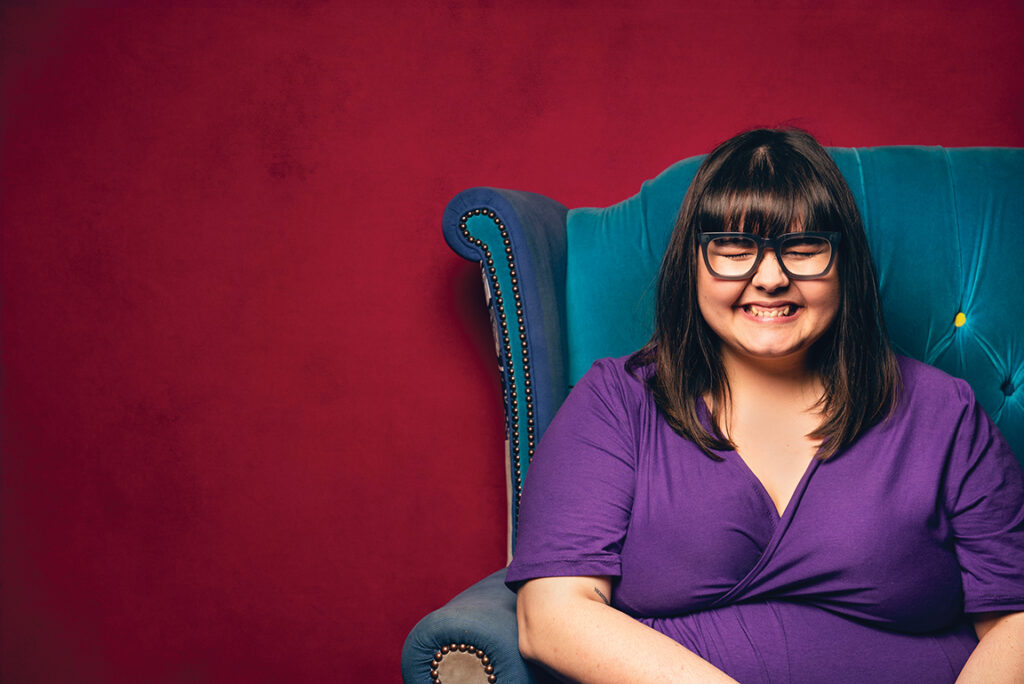
Sofie Hagen
Danish, bisexual, and “filthy and graphic, but somehow polite” as Time Out describes her, comic, podcaster and author-activist Sofie Hagen is pushing boundaries with her new book, “Happy Fat: Taking Up Space In A World That Wants To Shrink You” (published by 4th Estate). The book is about how Hagen found self-acceptance in a world where judgement and discrimination are rife, and how she eliminated fatphobic references from her life. Lena Dunham has said the book “is for anyone who has ever felt out of place in the world… Sofie Hagen is who we don’t deserve, but all need.” Hagen herself says, “Not fitting into the box that society deems acceptable is hard, really hard. It’s also a beautiful thing—a radical thing.” And Hagen has been incredibly radical in her practice, metaphorically building her “own castle, and keep[ing] your gate open to whoever you want,” she says. Her castle looks something like the worlds she attempted to create for her last two tours: venues that are wheelchair accessible and have gender neutral bathrooms, with an experience that is “anxiety safe,” as she describes it, and comes with a trigger warning. “Navigating the world as queer is a struggle,” Hagen says. “So, it’s important that we don’t forget to include other groups. Fatphobia, racism, and sexism still thrive in many queer communities and it’s inexcusable.” As she points out, “we know what it’s like to not be accepted. And we are not free till we are all free.” A modern legend in her native Denmark, Hagen’s star has risen beyond her home country thanks to her work as host of podcast “Made of Human,” and co-host of “Secret Dinosaur Cult.” She’s filmed her own series for Comedy Central online, which looks at the sex lives of fellow comedians. Her show “Shimmer Shatter” is “about being an introverted weirdo,” she says. “It is about family and daddy issues. It’s funny. I love it.” And she should, having just finished her biggest tour to date of a show packed with offbeat observations, passionate arguments, and, most of all, humor. —JDG
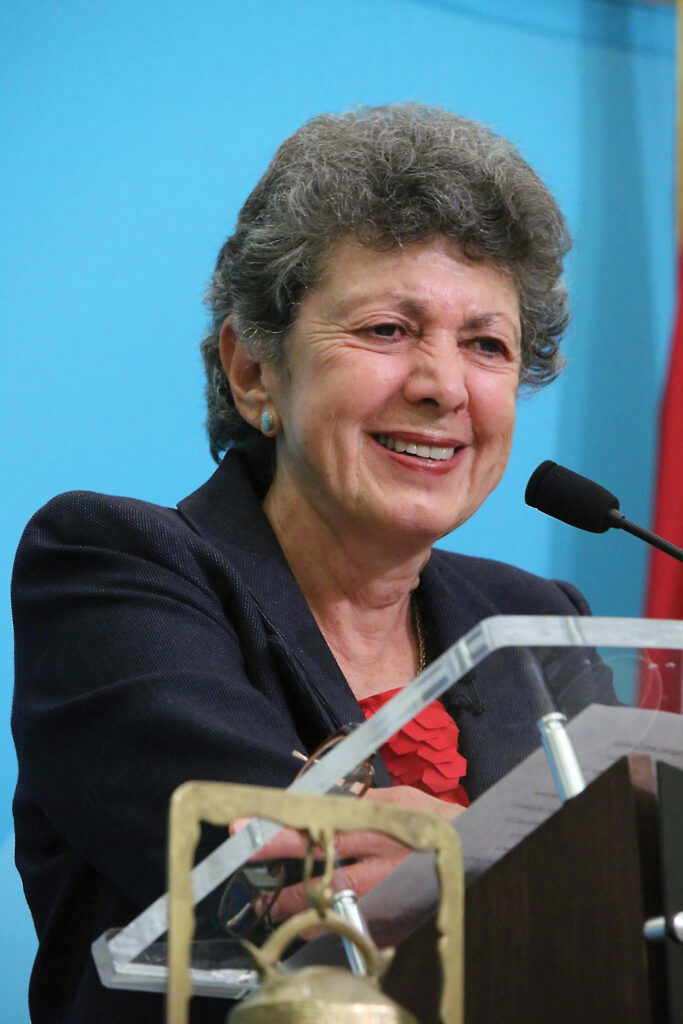
Lillian Faderman
“When I came out into the ‘gay girls’ bar culture in the 1950s as a teenager,” says best-selling author and noted LGBTQ historian, Lillian Faderman, “there was no such thing as lesbian history. No one had dignified us with a history. All we knew was that what we loved was against the law.” Faderman changed this with two ground-breaking works, “Surpassing the Love of Men: Romantic Friendship and Love Between Women from the Renaissance to the Present” and “Odd Girls and Twilight Lovers: A History of Lesbian Life in 20th Century America,” both of which made visible the long-neglected histories of gay and lesbian women. The former, which was written in 1981, was a product of the women’s movements of the 1970s. “I felt it was time to write the essays and books that would have made a difference in my life as a young lesbian.” She began writing and publishing prolifically and in two years she wrote six articles about lesbian history. “More than 40 years later, I’m still writing with a white-hot passion.” This passion has led her to become one of the most distinguished writers in her field. She has been awarded with numerous honors, including two American Library Association Stonewall Awards and the Anisfield-Wolf Award for Nonfiction Writing. Her most recent work, “Harvey Milk: His Lives and Deaths,” which explores how the gay icon’s Jewish upbringing in the mid-20th century shaped his understanding of the persecution facing the LGBTQ community, was released to critical acclaim in 2018. —RK
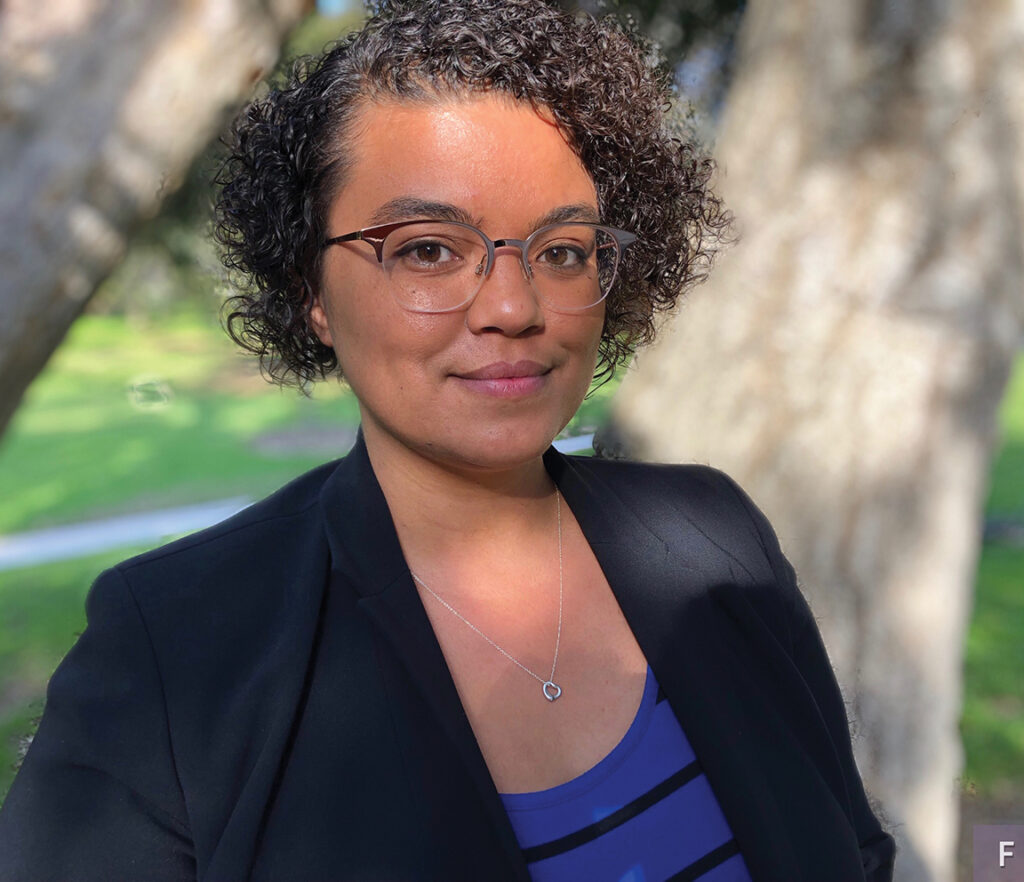
Hanna Garth
Anthropologist Hanna Garth has “always been perplexed and troubled by the fact that inequality, injustice, and discrimination persist and sometimes seem to get worse over time.” Therefore, she examines inequalities in the food system, conducting research in Cuba and Los Angeles on communities that struggle with food scarcity and how that impacts health and wellbeing. An assistant professor in the Department of Anthropology at the University of California, San Diego, Garth teaches courses on food, race, inequality, and social justice. Published in many academic journals, her forthcoming book “Food in Cuba: The Pursuit of a Decent Meal” will be released in early 2020. Outside of the academic realm, “most people that I encounter on an everyday basis assume that I am straight, and have a husband,” Garth tells GO. “I am quick to correct their assumptions, telling them that I identify as queer and my partner identifies as female.” As she describes it, “Coming out is an ongoing process for me,” and taxing as it may be to “always correct heteronormative assumptions,” it is also valuable to the people around her. “Many LGBTQ students have thanked me for being out on campus and shared that I am either the only out queer professor they have had or one of few.” And “with the current political climate, the ability to live a queer life is increasingly in danger and we need to do all that we can to fight against the withering of our rights.” —JDG
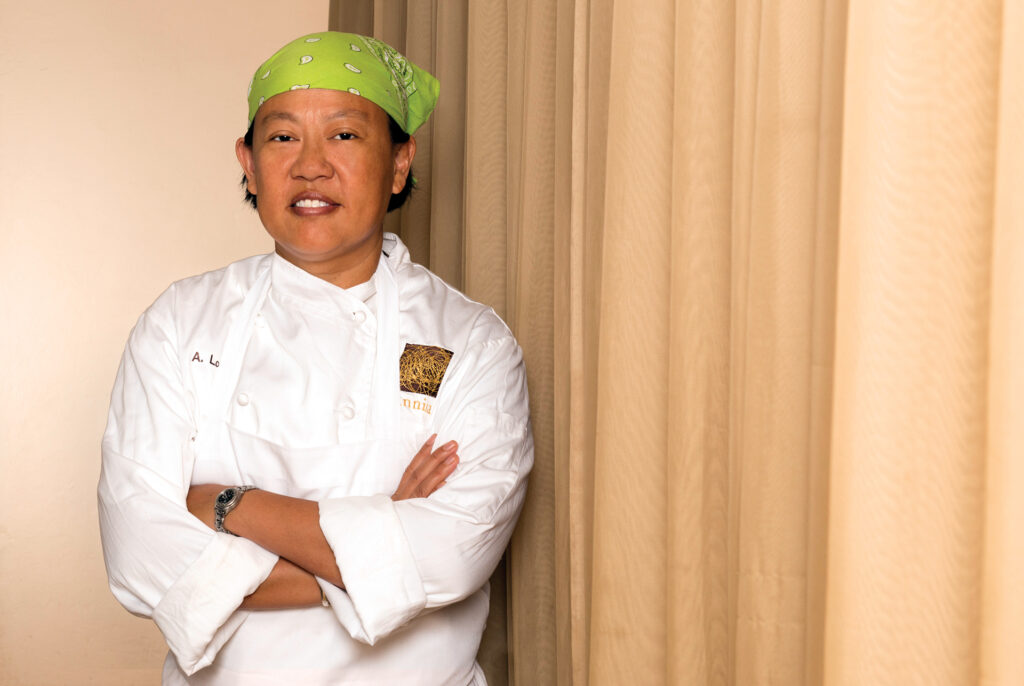
Anita Lo
“Food is culture. Cuisine is identity,” says renowned chef, restaurateur, and author Anita Lo. The holder of a Michelin star for nine consecutive years (no easy feat), the New York-based Lo, who originally grew up in Michigan, became a chef at a time when abuse was rampant and women at the helm of a kitchen were (and to a large degree still are) rare. Lo worked in revered restaurants early on in her career, but it was in 2000 when she opened Annisa (“women” in Arabic), that Lo truly arrived. The West Village restaurant was an instant hit; it earned a two-star New York Times review, and Food & Wine magazine named her one of the 10 Best New Chefs in America. Of her achievements, she says, “One of the most rewarding aspects was seeing diversity reflected in the clientele and in my employees. With Annisa, we created community.” Desire to conquer new territories led Lo, who is an “Iron Chef” alum (she defeated Mario Batali), to close Annisa in 2017. Her new adventures include her second book, “Solo: Easy Sophisticated Recipes for a Party of One,” which was published by Knopf last fall and named Cookbook of the Year by Eater. Lo is also in the documentary, “The Heat: A Kitchen (R)evolution” on Netflix, which focuses on the women who are changing kitchen culture around the world. “There’s a saying that ‘men cook for glory and women cook for love,’” Lo remarks. “And if we do, it’s because of how we were raised, and of that social construct. But as a chef, you really want to be judged on your work. You know, gender really has nothing to do with it.” —JDG
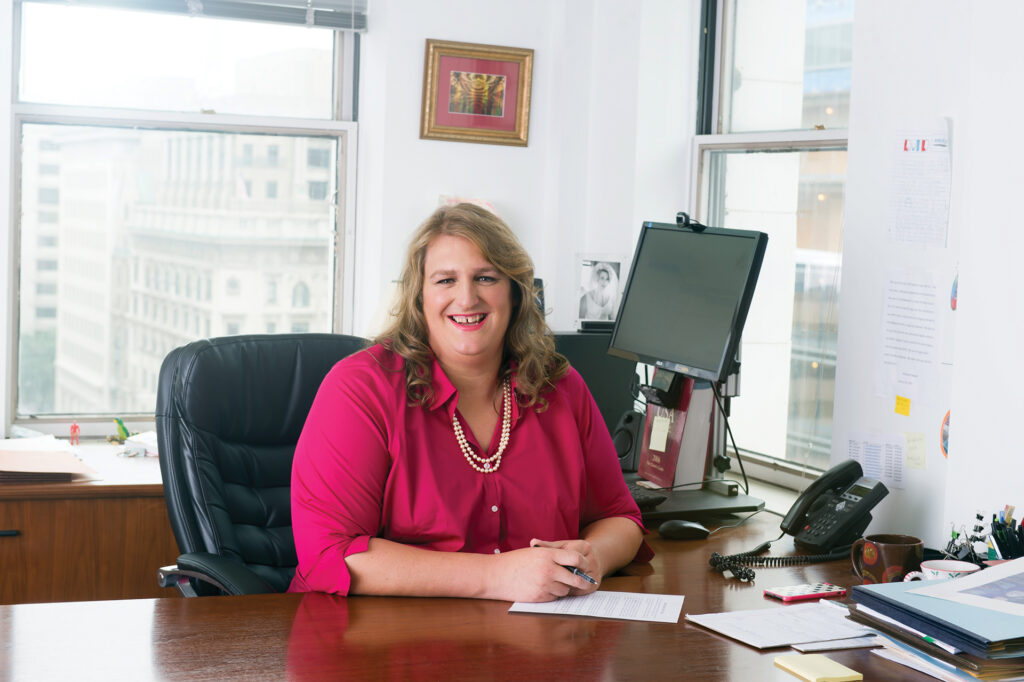
Ava Benach
The path to life, liberty, and the pursuit of happiness for immigrants seeking their own American Dream has never been easy, and it has become ever more politicized in the past few years. It’s become increasingly important for those new to this country to have someone like Ava Benach, immigration lawyer and founding partner of the D.C-based law firm Benach Collopy, help them navigate the American legal system. “The most rewarding part of my work,” Benach says, “is that I get to play a role in helping people realize themselves and their dreams.” In addition to representing clients for all matters of immigration law, including asylum, jurisdiction, due process, and removal proceedings, she has led challenges to state immigration laws in South Carolina and Alabama while serving on the Amicus Committee of the American Immigration Lawyers Association. She also represents transgender asylum seekers and immigrants, the latter as part of a collaboration with Whitman Walker Health; in 2017, the organization awarded Benach the Fenner Award for Community Service for her work. But the best reward, really, is helping those who need it the most. “In helping immigrants to America achieve security and stability,” Benach says, “I am constantly amazed and inspired by the determination, bravery, and fortitude that immigrants bring to this country. Whether it’s a trans woman seeking freedom to be who she is or a mother and child seeking to escape violence or a family that hopes that the next generation will do better than the last, I am honored to be a part of their journey and to witness their growth.” —RK

Isadora (Izzy) Cerullo
Izzy Cerullo may have been born a premature triplet, but she certainly grew to be quite the mighty woman. The daughter of two Brazilian immigrants who moved to the U.S. after fleeing military dictatorship in the 1970s, Cerullo is currently the co-captain of the Brazilian women’s national rugby team. She is also a graduate of Columbia University in New York City, where she studied biology and human rights and wrote a thesis about the evolution of women’s reproductive and sexual rights before shifting and becoming a full-time athlete. Cerullo, who is a 2015 Pan-American bronze medalist and four-time South American champion, was also a Rio 2016 Olympian. It was there that she and her then-girlfriend (now wife), Marjorie Enya, did something unprecedented at the end of the medal ceremony for the women’s rugby sevens match: she proposed. The news of their engagement went viral, and, since then, Cerullo has used her platform to speak up about LGBTQ and women’s rights by starring in a United Nations “Free and Equal” Campaign video; being vocal in publications about combating homophobia in sports; and participating in university panels and symposia to champion diversity, inclusion, and women’s empowerment. “You deserve to be happy, to be successful,” Cerullo says. “To build a family if that is what you want, to love and be loved, to be who you are and to be proud of it.”—JDG
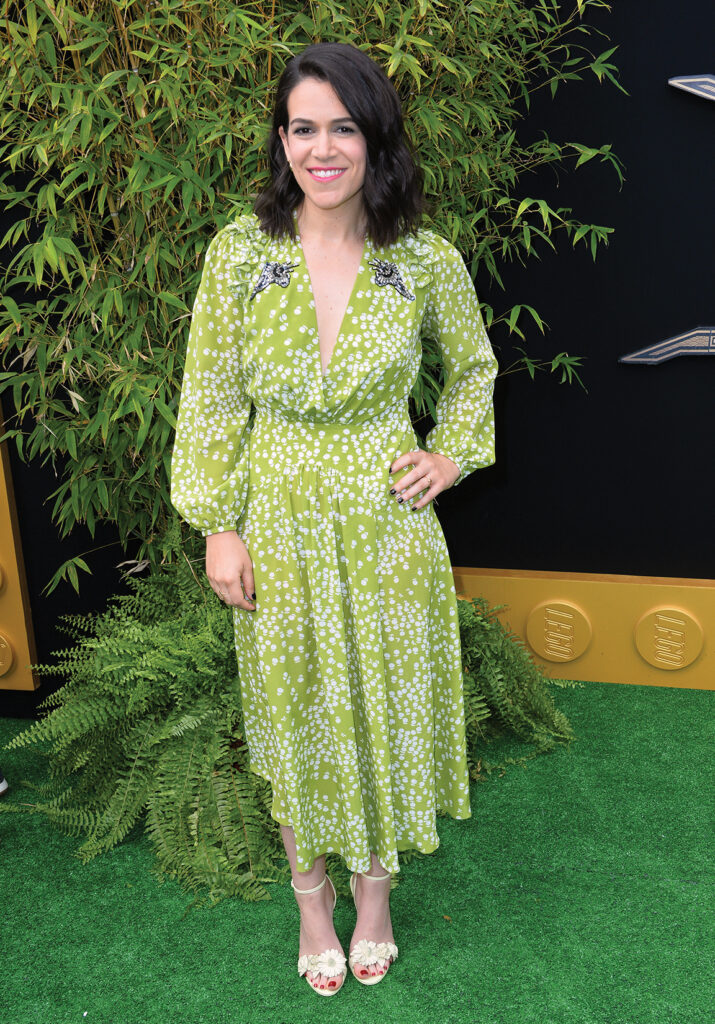
Abbi Jacobson
“Broad City” might have wrapped up its final season in March, but co-creator and star Abbi Jacobson has plenty to keep her busy. She and her show’s co-creator, Ilana Glazer, are shifting behind the scenes at Comedy Central to produce a slew of new comedy shows, including “Young Professionals” and the animated series “Mall Town, USA.” Jacobson is also an executive producer on the as-of-yet untitled series based on Samantha Irby’s best-selling essay collection, “Meaty.” She’s shown a more serious side in the Netflix drama “6 Balloons,” and an appreciation for modern art in the podcast “A Piece of Work.” Additionally, her first essay collection “I Might Regret This”, was published in 2018. The book was inspired by a three-week road trip Jacobson took after a serious breakup—which also happened to be her first relationship with a woman. Although “Broad City” had already garnered her a queer following, Jacobson only came out as bisexual this year in an interview with Vanity Fair; in the show’s final season, her character, Abbi Abrams, makes a similar discovery about her own sexuality after finding herself attracted to a female doctor. In an interview with Variety, Jacobson said that it was important for her to reflect something of her own experience onto her character: “I think it’s so important to show that you can still discover things about yourself and your own queerness.” —RK
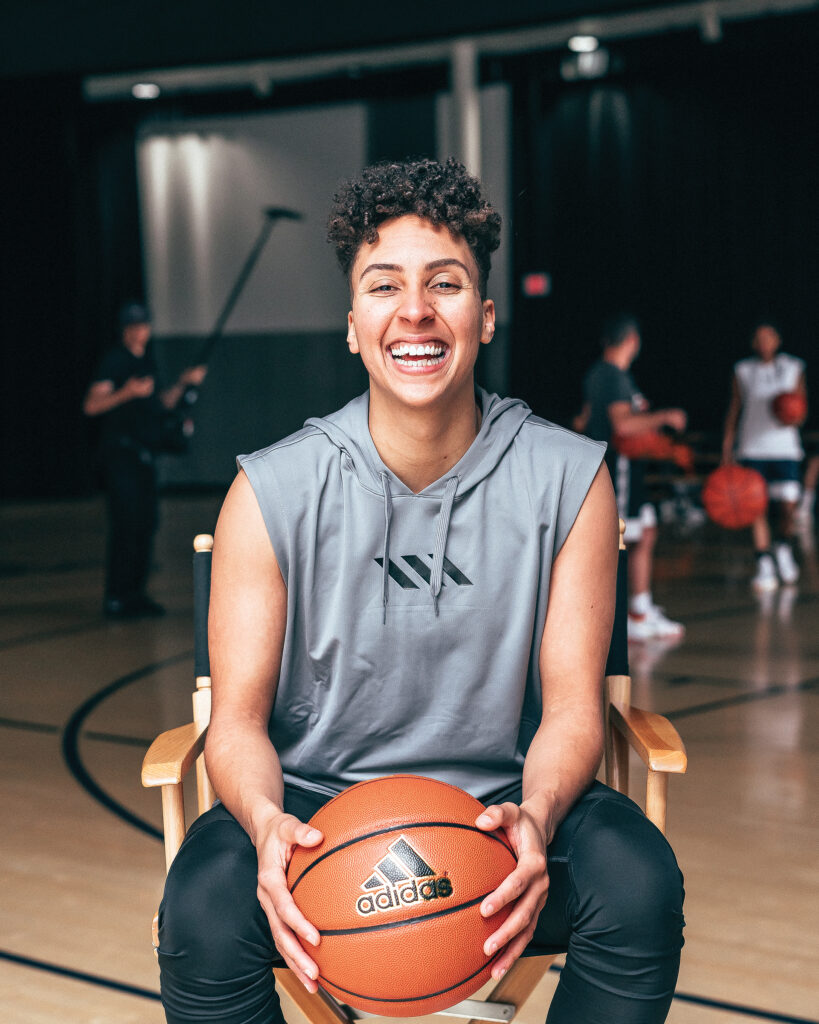
Layshia Clarendon
“I’m thankful for the folks who have fought long and hard so I could eventually be where I am today.” So says Layshia Clarendon, vice president of the Women’s National Basketball Players Association, the labor union for pro-players in the WNBA. A poised leader with an unshakeable presence and currently the point guard for the Connecticut Sun, Clarendon has an impressive record as a player, from being University of California, Berkeley’s leading scorer while in college (she led the Golden Bears to the first Final Four in the school’s history), to being an All-Pac-12 first team selection and the Pac-12 women’s basketball Scholar-Athlete of the Year. When Clarendon was a guard for the Atlanta Dream, she broke the franchise record for assists in a single season. She went on from there to become a solid contributor to the Indian Fever in the 2015 WNBA finals. In 2017, Clarendon was named a WNBA All Star, leading the league in total assists for the 2017 season. She captured gold with Team USA in the 2018 FIBA World Championships. The athlete is just as formidable off the field. She is often asked to lend her voice and thoughts on various topics. “For a long time, I was told that being gay would hurt my success and I know that to be true for a lot of people who came before me,” says Clarendon, who in the off-season provides color commentary for the Pac-12 Network. “I’ve found that by showing up as my whole self, I’ve been able to perform better as an athlete and ultimately have been able to build a brand around being an outspoken queer person.” —JDG
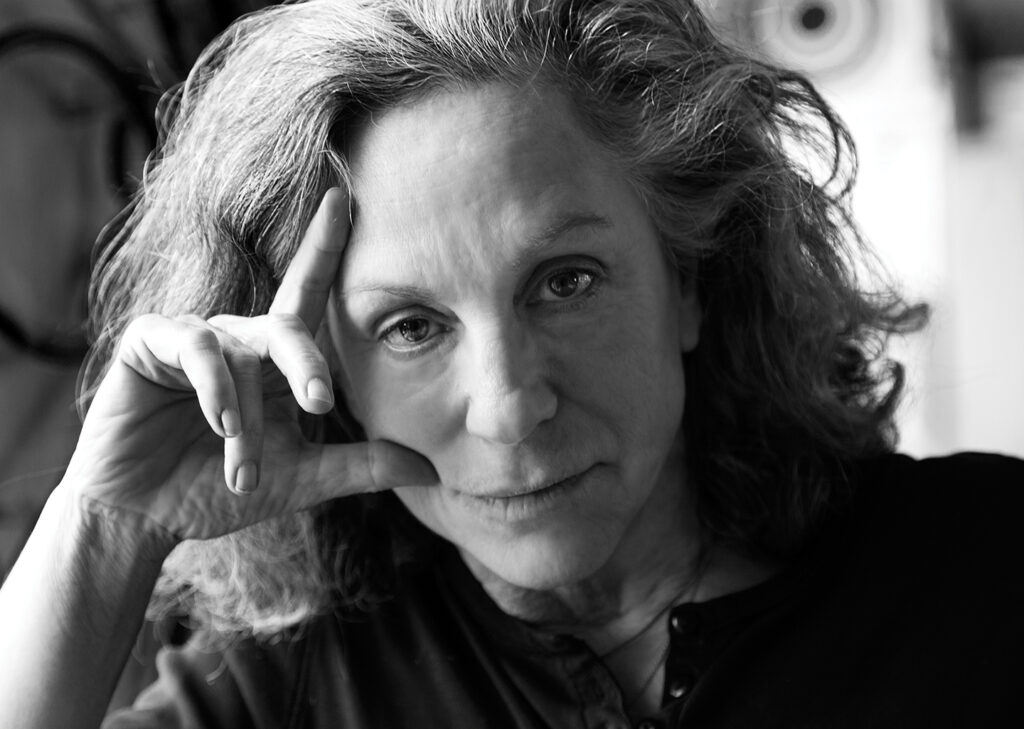
Deborah Kass
Many New Yorkers (and visitors to New York City) know Deborah Kass’s work without even realizing it. That’s because her iconic sculpture, “OY/YO”—two bright yellow letters that read in both directions, depending on which side you’re standing—is an irresistible selfie backdrop. Originally installed in Brooklyn Bridge Park, where it became an instant hit, it’s now proudly installed in front of the Brooklyn Museum, and Stanford University has commissioned it for a Fall 2019 installation. An artist who examines the intersection of art history, popular culture, and the self, Kass has work in the collections of the Metropolitan Museum of Art, the Museum of Modern Art, the Whitney Museum of Art, and the National Portrait Gallery, just to name a few. She’s shown her work internationally at the Venice Biennale, the Istanbul Biennale, and the Museum Ludwig, Cologne. To her, her career “wasn’t a choice.” The Cultural Honoree at the Jewish Museum in 2017 says the most rewarding aspect of her work is “when it speaks to others.” Kass serves on the boards of the Sharpe Walentas Studio Program and the Andy Warhol Foundation for the Visual Arts. In 2018 she was inducted into the National Academy of Design. Her message and her advice? “Stay strong, stay proud, stay fearless, stay loud!” —JDG
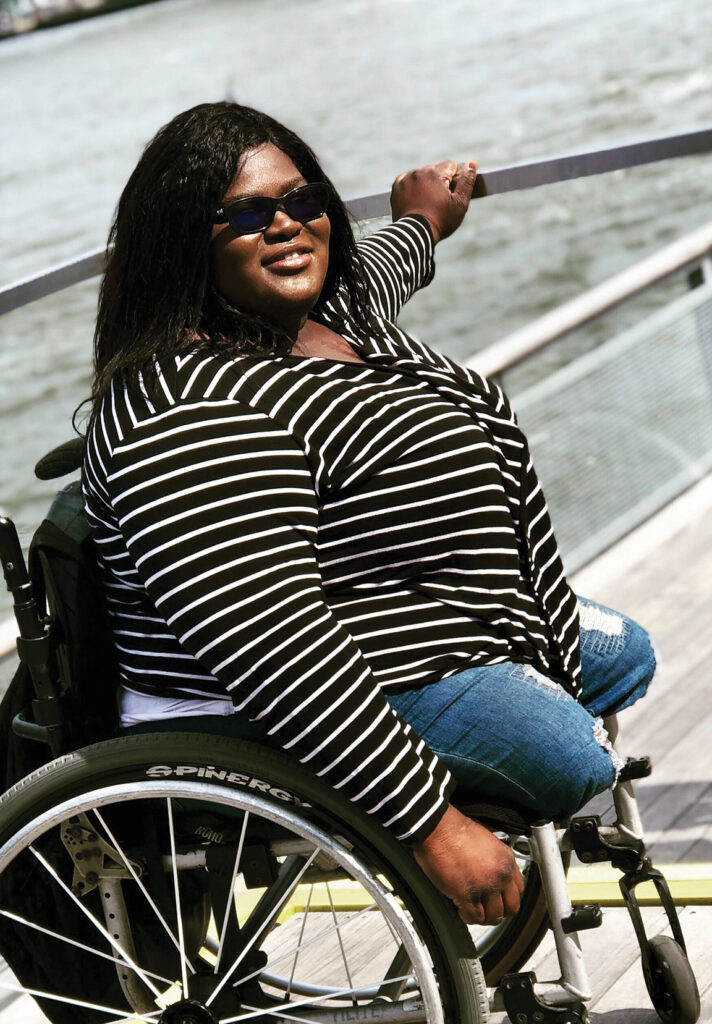
Bryanna Copeland
Bryanna Copeland garnered attention last year for a reason few of us would want: she said she was refused a ride from an Uber driver after he saw her wheelchair. The Long Island native, who has been a bilateral amputee since she was a child, decided to turn the incident into a chance to talk more openly about how we as a society respond to those with disabilities. “I can’t just sit back and watch others be mistreated because they are different,” says Copeland, who has been advocating for those with disabilities since she was a teenager. An active member of her community, Copeland is currently working on a project to improve public transportation for people with disabilities and mobility limitations. She is also a volunteer mentor at a youth camp for children with limb loss/difference. Although she notes that much of her advocacy is directed for those with disabilities, she speaks out on behalf of the LGBTQ community as well. “The one message,” she says, “that I want to share with the LGBTQ community is to love yourself just as you are.” —RK
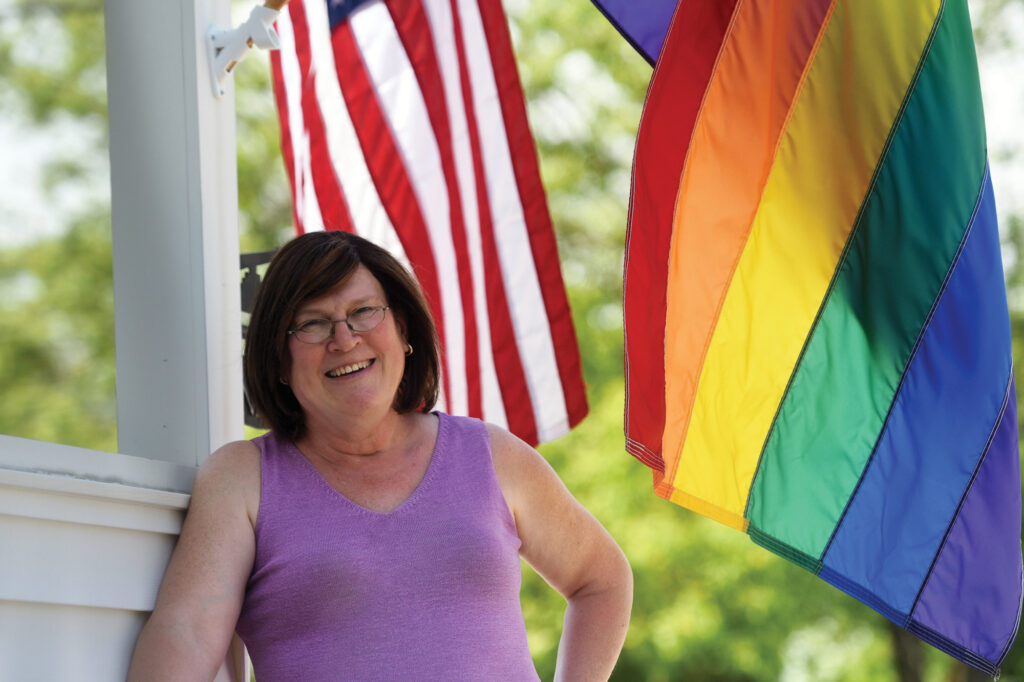
Gerri Cannon
Technical manager, carpentry entrepreneur, long-haul truck-driver: all are jobs Gerri Cannon can list proudly on her resume. Now, she can add New Hampshire State Representative to the list. In 2018, she was elected to represent Strafford County’s 18th district as part of the Blue Wave, bringing hope and voice to transgender and non-binary Americans. She has since sponsored two bills in the House that would make it easier for transgender people to change their gender identity on birth certificates and to select “X” on driver’s license applications. “I’m working to improve the lives of people, their families, and communities,” she tells GO. “I have a voice that I am able to share on behalf of people who don’t believe they have one. My reward is when people come up to me and thank me.” Her promotion of human rights extends to all residents of her home state, and she wants to address issues pertaining to affordable housing, healthcare, and education. Although her life hasn’t always been easy after coming out as transgender in 2005, she credits being out with her current success. “I use my transgender status as a way to educate others,” she says. “I let people know that they can’t give up. If you push forward you will find great opportunities and rewards.” —RK
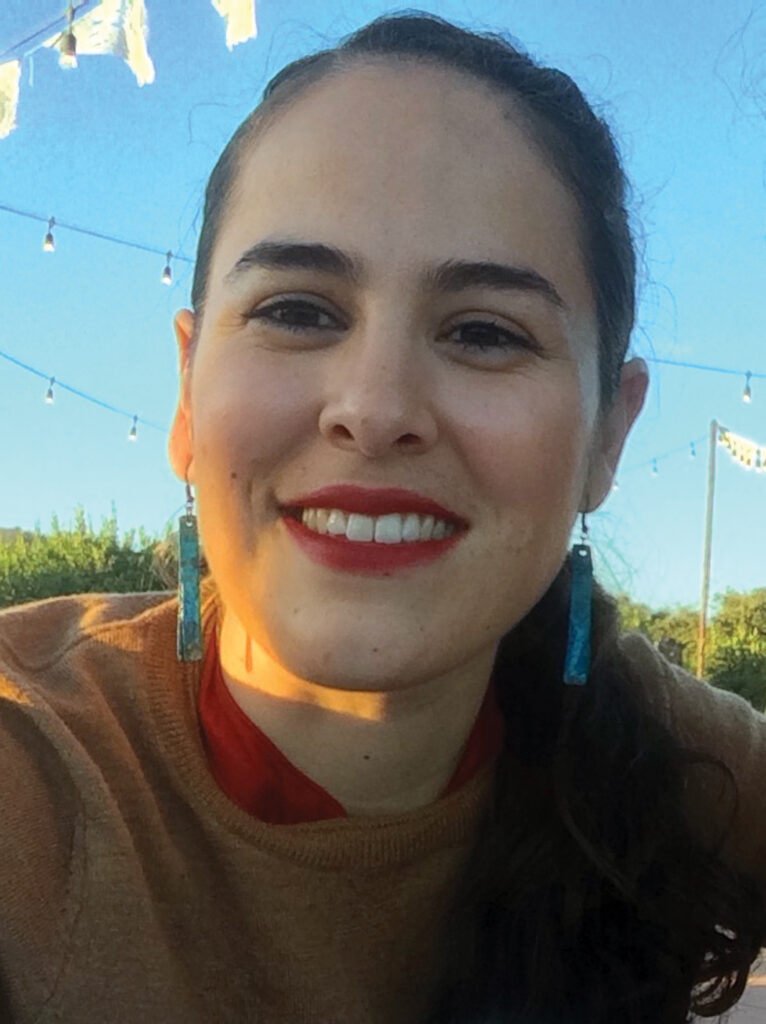
Pamela Chavez
Born in Newark, New Jersey, Pamela Chavez describes herself as a queer Costa Rican illustrator. “As an artist,” Chavez says, “I have an opportunity to decide how I make the most profound impact on the world as I can.” Chavez was originally an advocate for youth and family non-profits in the San Francisco Bay area after graduating from the University of California, Santa Cruz. She shifted gears in 2012, going to school to study illustration and animation at the Rhode Island School of Design, then launching her career as a full-time artist and animation writer/director in 2015. “This is a luxury I don’t take for granted,” Chavez says. “Being an artist goes beyond the aesthetic; my Queer Latinx community inspires me to find new and exciting ways to share our experiences… I’m pushed to adding to that voice in the most authentic ways I can.” Chavez’s first animated short, “Caracol Cruzando” (“Snail Crossing”), was part of the PBS Online Film Festival, its production made possible by a New Media grant from Latino Public Broadcasting. It tells the story of a young girl who has to decide if she’s going to bring her best friend and pet turtle with her across the U.S./Miami border. Chavez has kept busy since that first creation: she has animated work in “Un Nuevo Sol” (“A New Sun”), a short documentary following the lives of three undocumented Latinx men on a trip to see their first eclipse; “Transfinite,” a sci-fi feature film composed of seven standalone short stories that feature supernatural trans and queer people of various cultures; and “La Serenata” (2019), a short film about parents who struggle with musical tradition when their son requests a song for another boy. Intersecting and combining is a Chavez hallmark andx what she considers to be the most exciting way to contribute to the world. “We deserve to tell our stories,” Chavez says. “To cry, to share, and to laugh!” —JDG
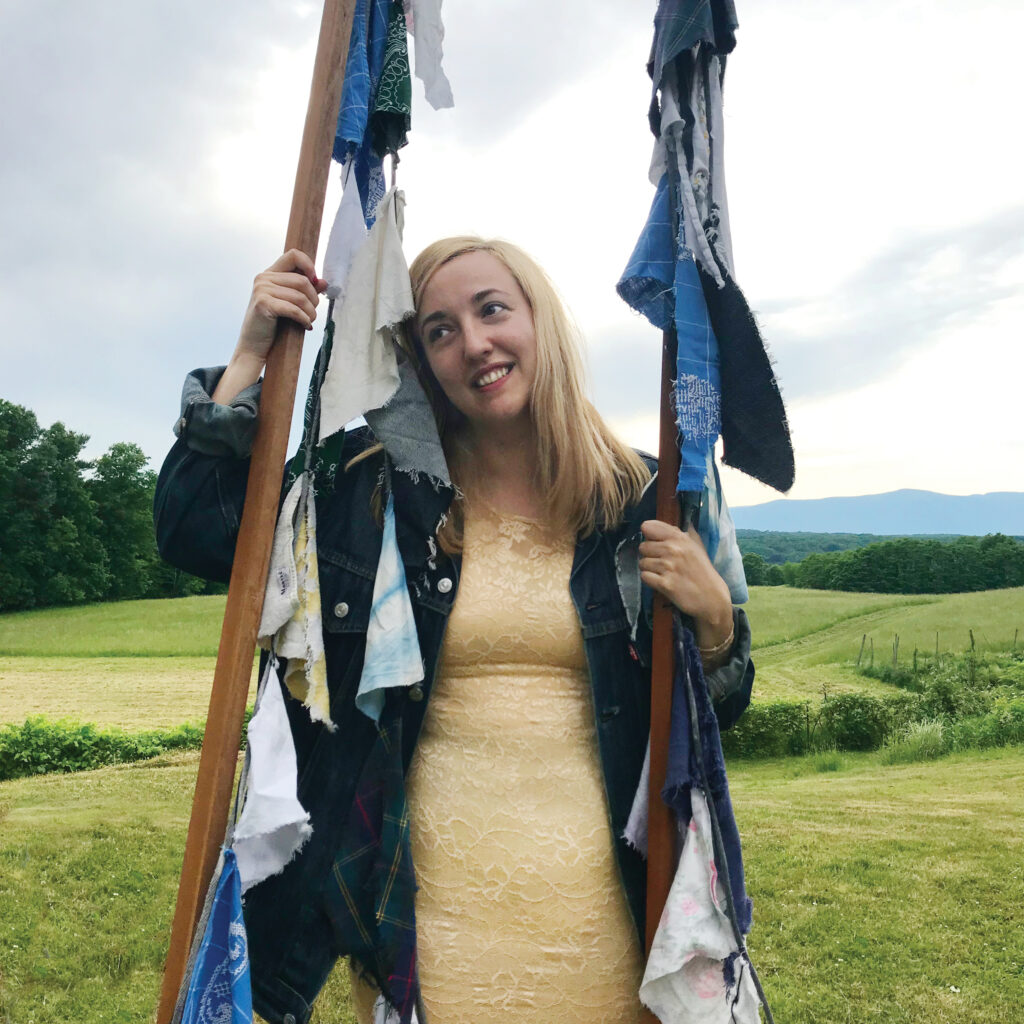
Svetlana Kitto
NYC-based Svetlana Kitto is a mad multi-hyphenate of all things oral history, art writing, creative nonfiction, and editing. She’s combined a few of those interests, specializing in artist oral history. She even interviewed the late and great lesbian icon Barbara Hammer for the Smithsonian Archives of American Art. Her queerness is integral to how she lives her life. “Being gay is the gift that keeps on giving,” she says. “I don’t ever want to get complacent in my understanding of sexuality and gender. [I am] always looking to be destabilized, and knocked down again, like I did when I first embraced my queerness.” She recently wrote about this in an essay for Off Assignment called “What the Most Sordid Russian Gay Bar in Riga Taught Me About Identity Politics.” Other work can be found in the Cut, Interview, and Guernica. Much of her work is rooted in collaboration, most of the time with friends or people in her community. She’s currently got her hands in multiple creative pots. She is editor of the first annual BOFFO art journal, with art and writings by Wolfgang Tillmans, Lyle Ashton Harris, Julie Tolentino, and many more. She’s also working on a MacArthur Foundation–funded oral history project about campaigns for reproductive rights in the Global South. She’s worked with many organizations and institutions on oral history projects, including the Museum of Arts and Design, the New York Public Library of Performing Arts, and the Brooklyn Historical Society, where she most recently did interviews for the Muslims in Brooklyn Public History Project. Fully entrenched in the queer community, she is also constantly thinking about how “sometimes we get very narrow in our thinking around issues that pertain to ‘us,”’ she says. “[It is] important to remember that ‘us’ contains multitudes, that is to say, many genders, bodies, identities.” —AE
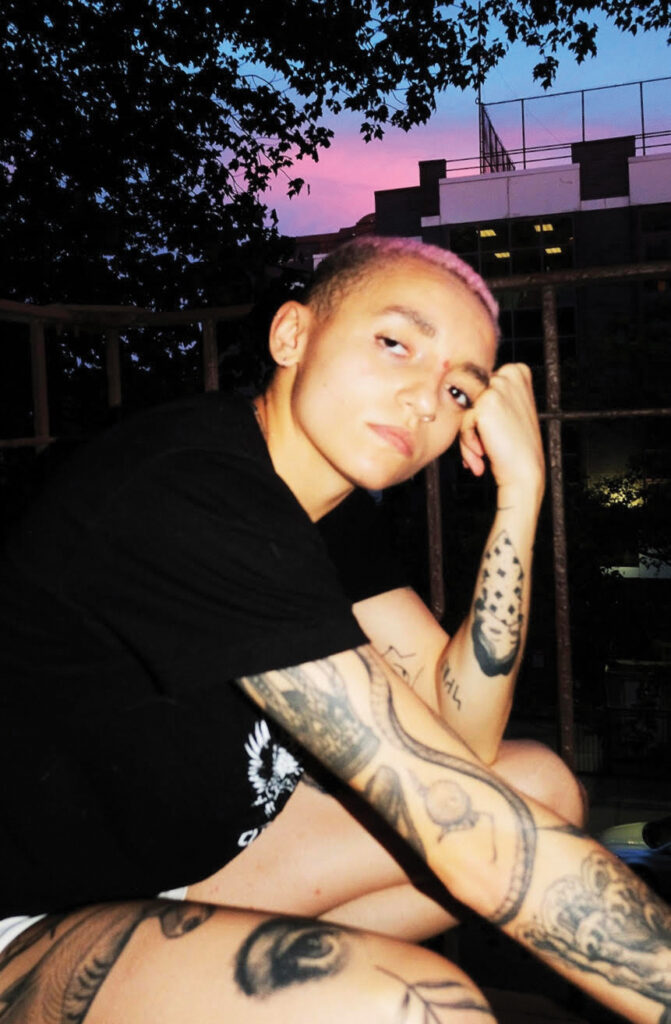
Tarayn Sanders
Tarayn Sanders is a 26-year-old mega-babe living in Brooklyn, New York. After working freelance production and starting her own company, she decided to go back to 9-5 to grow and learn as a producer. At North Six Productions, Sanders coordinates with the production team on fashion and commercial photo and video shoots. Coming out for Sanders was rather unceremonious in a good way. “I can say with confidence that I was one of the lucky ones. It was as seamless as bringing my first girlfriend home, someone my parents had known for years. Without blinking, my parents opened themselves up to me and her and accepted us. Their daughter was gay, this was her girlfriend and it really didn’t change anything,” she tells GO. Since coming out, she says that her success has only gone up. “Confidence is the key factor I attribute to my success and the biggest part of my confidence is being out and proud of who I am and how I’ve come to accept and love from within.” —DT
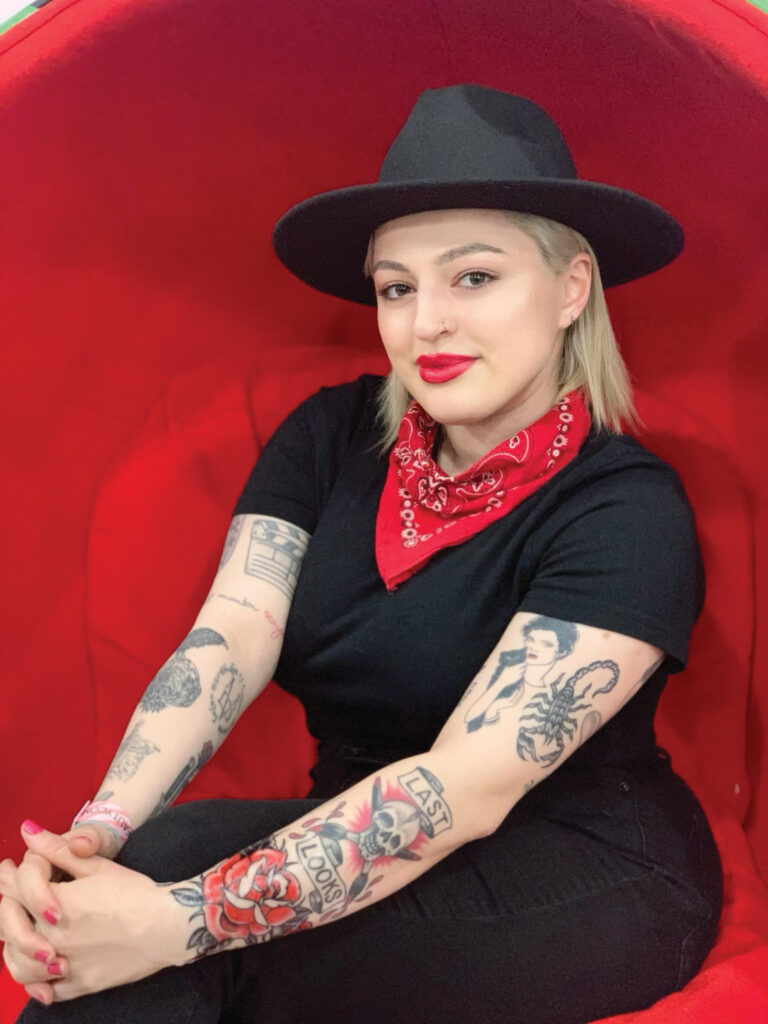
Rakhil Shamailova
With a love for the motion picture, Rakhil Shamailova is an experienced makeup artist making her mark on the entertainment industry. Her expertise in design and her ability to form close creative relationships is her key to working with clients and directors to bring characters to life. “I love working with other queer filmmakers. I want to be a part of something that matters,” she tells GO. Shamailova has worked on many exciting projects, including “Pimp,” directed by Christine Crokos. That film, starring Keke Palmer as a pimp in the ghettos of the Bronx who dreams of a better life for her and her girlfriend, was an “unforgettable experience,” Shamailova says. “For Keke’s transformation, we shaved her head and covered her in tattoos.” Shamailova is currently working with Olivia Cooke on a new movie shooting in New York City. She wants her fellow LGBTQ community to recognize the importance of our stories. “I think it’s important now more than ever that we pick up our pens, and our cameras, and make ourselves seen, and our voices heard.” —DT
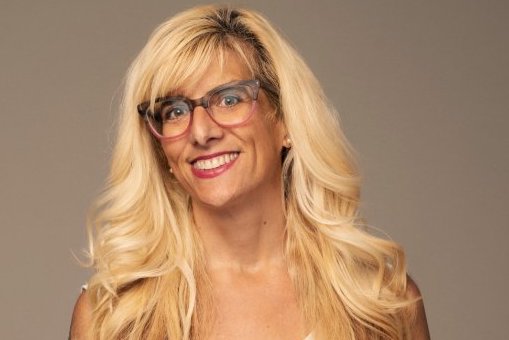
Diane Anderson-Minshall
Diane Anderson-Minshall was honored this June as one of Folio’s 2019 Top Women in Media, something she did not expect at the beginning of her career. “I officially came out and moved into LGBTQ media from mainstream media literally the same month,” Diane Anderson-Minshall tells GO. “I was told then that being out was the death knell for my career as a journalist and that working in queer media was even worse.” That was the beginning of a queer media success story that Anderson-Minshall defines. Currently the CEO of Retrograde Communications, a partner of Pride Media (the country’s largest LGBTQ media company) where she serves as editorial director of the Advocate, Plus Magazine, Out Traveler, Chill, and TinyLivingChic.com, Anderson-Minshall seems to be a woman in perpetual motion. She’s also the author of multiple books, and co-author—with her husband, Jacob Anderson-Minshall, of the 2014 memoir, “Queerly Beloved: A Love Story Across Genders.” It’s an unflinching look at their relationship together through his gender transition. All the effort has reaped rewards, including the 2018 Sarah Pettit Memorial Award for the LGBTQ Journalist of the Year as well as the 2018 Folio: Eddie and Ozzie Awards for Best Editorial Team of the Year, and Best New Magazine Launch. “I’m often asked if being out impacted my career adversely,” says Anderson-Minshall, “but really, I wouldn’t have the career success I do without coming out and jumping into LGBTQ media.” —JDG
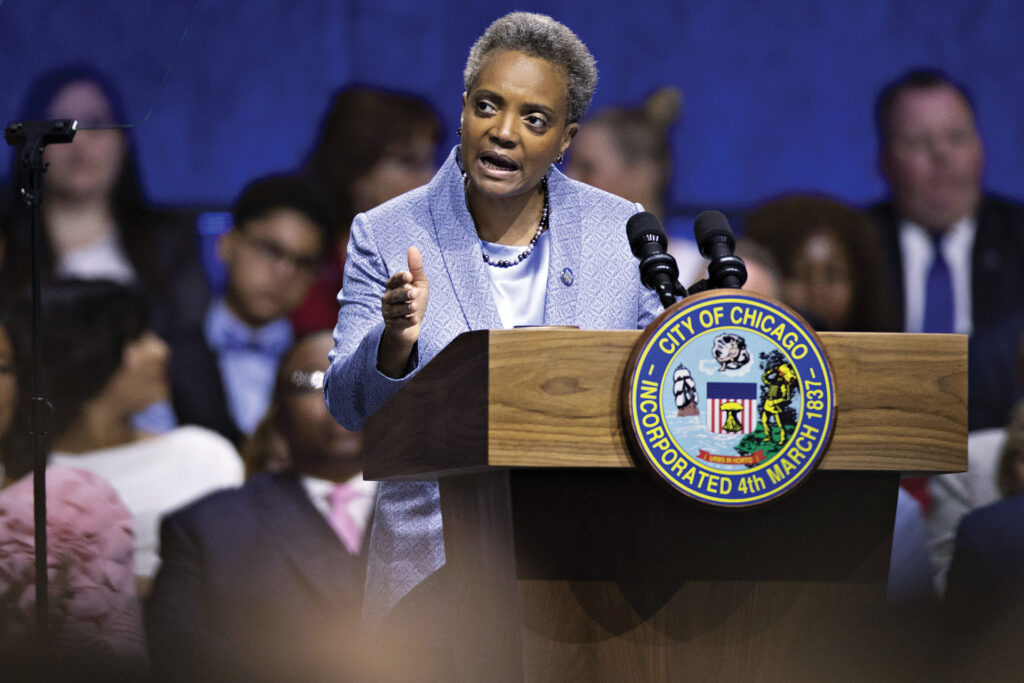
Lori Lightfoot
Last year, when GO spoke with Lori Lightfoot, she was one of several candidates for mayor of Chicago. This year, Lightfoot is back in these pages as the winner of that election—and as the first black woman and lesbian to hold the title (and the second woman in the city’s history). In fact, she’s the first out lesbian to ever run for the office in the history of Chicago. Originally from Massillon, Ohio (where her parents landed in the Great Migration out of the Jim Crow South), and the youngest of four children, Lightfoot became a true Chicagoan. One example: she has held Chicago Bears season tickets for 20 years. Lightfoot has always been an achiever from the moment she decided to pursue a legal career. “It was really economics that drove me to think about the law,” she said to the Chicago Sun-Times. “I just wanted to be able to do something where I would be able to take care of myself financially.” And she has done that and more. Lightfoot, whose father was a sharecropper, studied at the University of Chicago Law School on a full scholarship, served as a clerk under Justice Charles Levin of the Michigan Supreme Court, has been an equity partner in law firm Mayer Brown, and headed both Chicago’s Office of Professional Standards and the Police Accountability Task Force. And now, she’s the Mayor of the third largest city in the United States. “I feel like, as an African-American woman,” she told the Sun-Times, “I have a responsibility to give something back.”—JDG

Zolita
Zolita is a 24-year-old independent artist based in Los Angeles whose music blends R&B and dark pop and lyrically draws on her experiences as a queer woman. “I am so grateful that I get to create art about girls loving girls in an authentic way, and that with social media so many people have access to it,” she tells GO. Zolita graduated with a film degree from New York University, and she’s built a loyal fanbase and widespread industry respect through her self-directed/produced music videos, each of which have garnered over 25 million combined views on YouTube and have gone viral. Zolita is known for her powerful message and avant-garde aesthetic, which has resonated with LGBTQ+ kids around the world. She is proud of the much-needed visibility she brings to her industry. “The most rewarding aspect of what I do has to be the messages I get from other queer people who can see themselves clearly in the stories I tell through my art. Growing up, I didn’t have any femme lesbian role models in pop music or in the mainstream media to look up to, so to be that for a young person growing up now is everything to me.” She recently won GLAAD’s “Rising Star” award, played L.A. Pride, and is looking forward to a summer touring with XYLO and playing at several other Pridefests. —DT
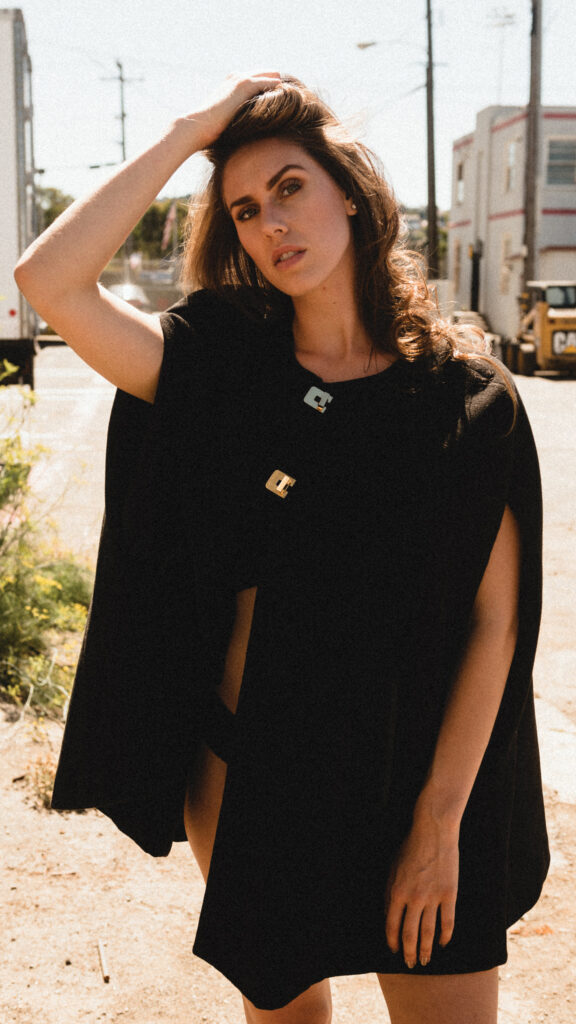
Cassandra Bankson
A runway model who has struggled with acne, Cassandra Bankson never shied away from showing the camera—and her millions of viewers on YouTube—her true self. But while she became known for her unabashed skincare-turned-personal growth video series, there was another part of her life she hadn’t shared publicly until last year. Bankson came out as gay on YouTube in an emotional video and never looked back. Why get so personal with so many strangers? “My life is lived out pretty publicly online—this pertains to both the good and the not-so-pretty,” Bankson tells GO. “Having the ability to turn my struggles into topics of conversation has allowed me to grow immensely as a human, and feel as if what I went through wasn’t a waste of pain and time.” The video garnered more than 160,000 views, but it wasn’t the end of the story. “Over a year later, I still feel I have to ‘come out’ on a weekly basis,” Bankson says. “To the influencer at a beauty-brand-party who thought I was ‘way too pretty’ to be a lesbian, to a friend-of-a-friend who I’ve known for five years but never bothered to ask. To my friend’s parents, who wonder when I’m going to get married and don’t understand why ‘it’s a bit more difficult for me.’ As I grow, I realize that perhaps this process will never end.” And that’s just fine with Bankson, who is happy to use her position and platform, as well as individual conversations, as a form of education. “It’s liberating to watch someone become less discriminatory when they realize what we like really isn’t all that different.” —SEJ
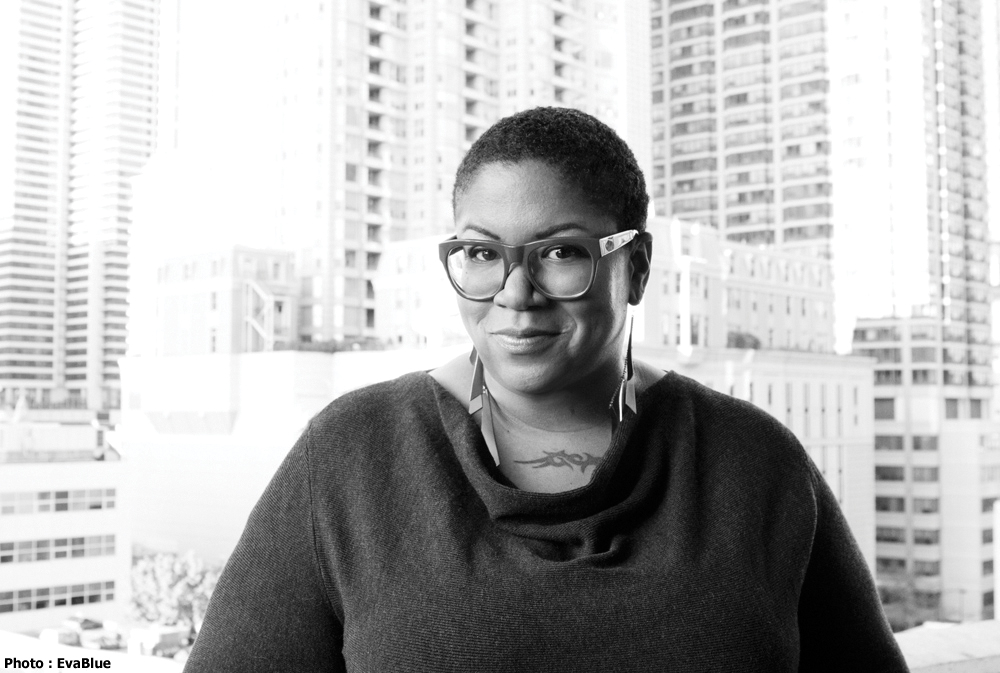
Samantha Irby
If you ask Samantha Irby, she’d tell you her bio is pretty short: she writes a blog called “bitches gotta eat.” But she writes books, too. Good ones. Her non-fiction book “We are Never Meeting in Real Life” made the New York Times Best Sellers list, and her memoir, “Meaty,” is being developed into a television show on Comedy Central. She also wrote an episode for the show “Shrill,” starring Aidy Bryant. But, she says, it’s the blog people remember. Started in 2009, “bitches gotta eat” is a chronicle of Irby’s personal life touched up with her particular brand of sharp, honest humor. “No matter how many times my books end up on the New York Times Best Sellers list, people are like, ‘Hey, remember how you have a blog?’” Still, her success does have a bright side. It’s landed her a “smoking hot wife.” Plus, she takes some pride in the fact that her humor has brightened readers’ days. “The best part of having poured my feelings into the black hole of the internet for all these years,” she says, “is the feedback from people who have read my work and feel a kinship with me. It’s just good to know that I’ve made someone laugh or have made a person’s day even the tiniest bit better.” —RK
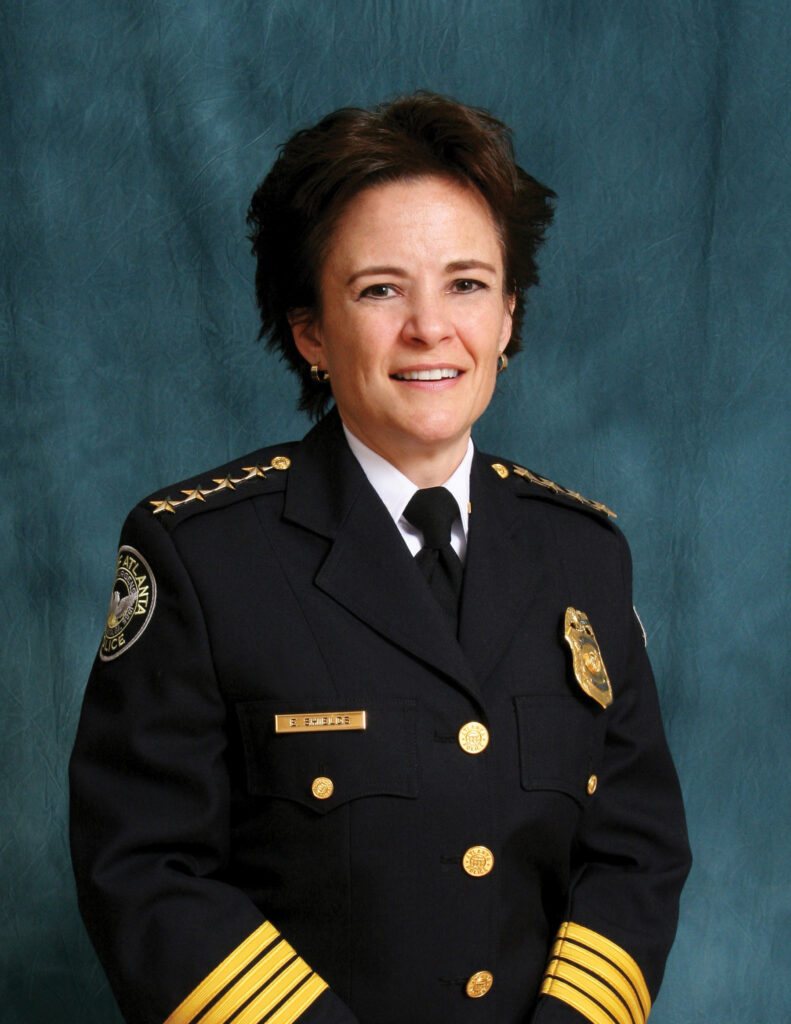
Erika Shields
In an age when police brutality and excessive force dominate the news cycle, the gap between law enforcement and the communities they are responsible for can seem insurmountable. But for Erika Shields, chief of the City of Atlanta Police Department, police are very much a part of the diverse communities they serve. “We are privy to the unique inner workings of multiple different and distinct cultures, religions, backgrounds, and sub-groups,” she tells GO. “To be effective, we need to navigate these communities with awareness and empathy, while simultaneously ensuring that critical law enforcement efforts are being executed at a high level.” Since her appointment in 2016, Shields has made her community-based approach part of the Department’s mission. She is invested in a zero-tolerance policy for police abuse and expects her officers to practice compassion and understanding for the people they serve. This means working in collaboration with locals through projects like the Police Athletic League, which gives local youth and officers a chance to interact socially in a positive manner. Still, Shields is aware of the multiple fronts that police are tasked with, encompassing everything from drugs to socioeconomic inequality, homelessness, and mental health issues. The task can seem overwhelming, especially when everyone has an opinion about what police should and shouldn’t be allowed to do. “We are directing our officers to police fairly and impartially at a time when our country could not be more divided and confrontational,” she says. “But you know what? We are going to get it right.” —RK
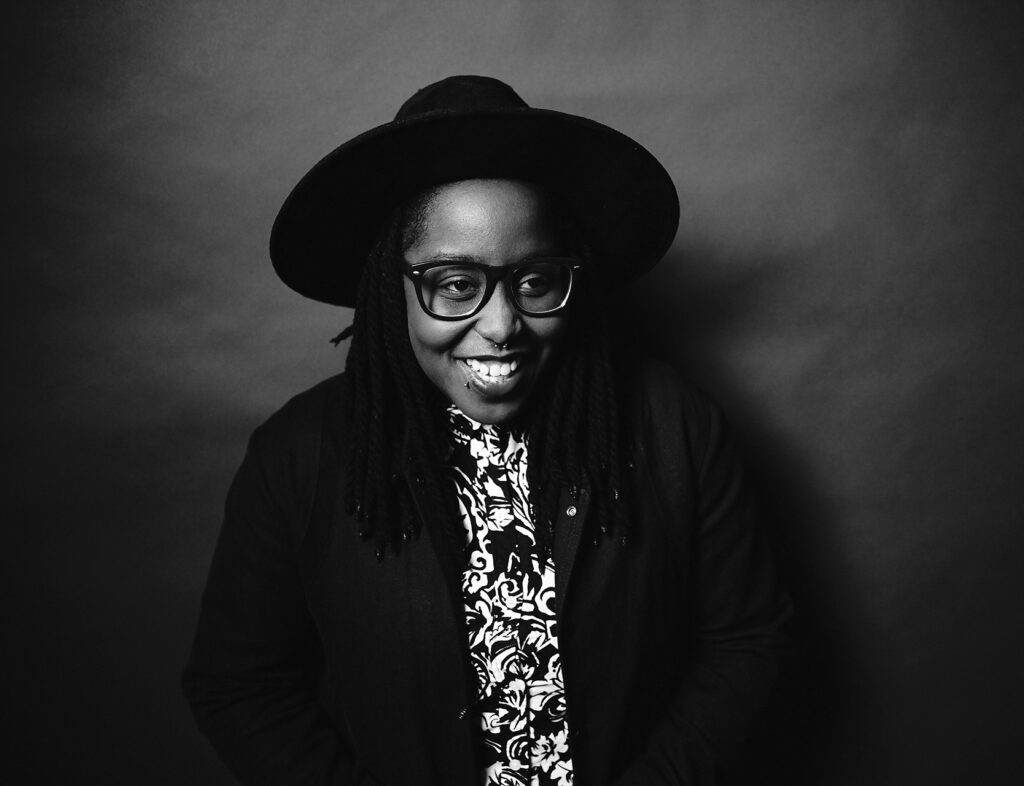
Adja Gildersleve
“To be LGBTQIA+ inherently makes us innovative, creative, and resilient,” opines Adja Gildersleve, the filmmaker, futurist, and educator who’s based in Minneapolis. Having spent years on the frontlines as an organizer and self-described agitator, Gildersleve co-founded Black Lives Matter Minneapolis and is “fully committed” when it comes not only to fighting oppression but to also supporting youth and adults in accessing tools that help them build as well as maintain agency and power. Reflecting Gildersleve’s belief that media is a powerful tool to imagine and inspire, Gildersleve is also the co-director of Free Truth, a media company that uses art as a tool for liberation. While their dream is to work on a sci-film with Issa Rae (preferably one where two Black women time travel to save the world from the zombie apocalypse, aka colonization), Gildersleve is poetic in their philosophy. “It is a blessing to be queer/trans,” they say. “Our struggle leads each of us to uniquely move in ways that create so much beauty. In just surviving and existing, we transform spaces and culture in ways that are unimaginable.” In addition, “we must continue to boldly hold space for ourselves, our elders, our youth,” Gildersleve advises, “and especially uplift and protect Black Trans Women. There’s hope that we can build towards collective liberation for all oppressed people and thrive.” —JDG
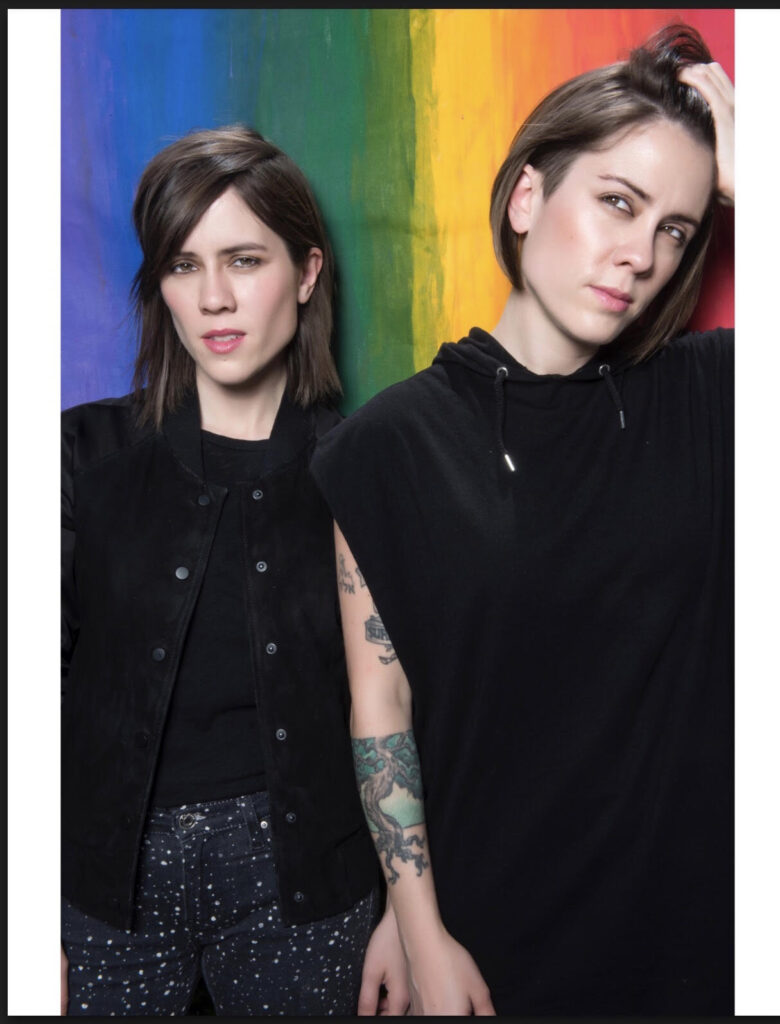
Tegan and Sara
Identical twins Tegan and Sara Quin found common ground in music. “I think making music was the first thing both Sara and I felt passionate about,” Tegan says. “It created a path for us to follow after high school. Neither of us were inspired to go to university but we craved hard work. We wanted to prove ourselves.” Not an easy task in a competitive industry, but eight albums, seven gold certifications, three Juno awards, and over 1 million album sales later, the indie-pop duo has done just that. If that’s not enough, their memoir, “High School,” comes out this fall. And they are the founders of the Tegan and Sara Foundation, which advocates progressive social change for LGBTQ women and girls. (A ninth album is also in the works). As LGBTQ women themselves, Tegan knows that their status may have affected their own journey in an industry where all women encounter misogyny and homophobia. “There’s no way to know if we were straight (or more straight-looking) if we’d have had more success,” she tells GO. “It feels crappy to me to complain about what was no doubt a limitation on our career—aka being gay—when we’ve had so much success.” She does know how lucky she and her sister have been. “I think being out allowed us to connect to a community of people like us, who were quick to support us. And that helped us in some ways in the early days.” —RK
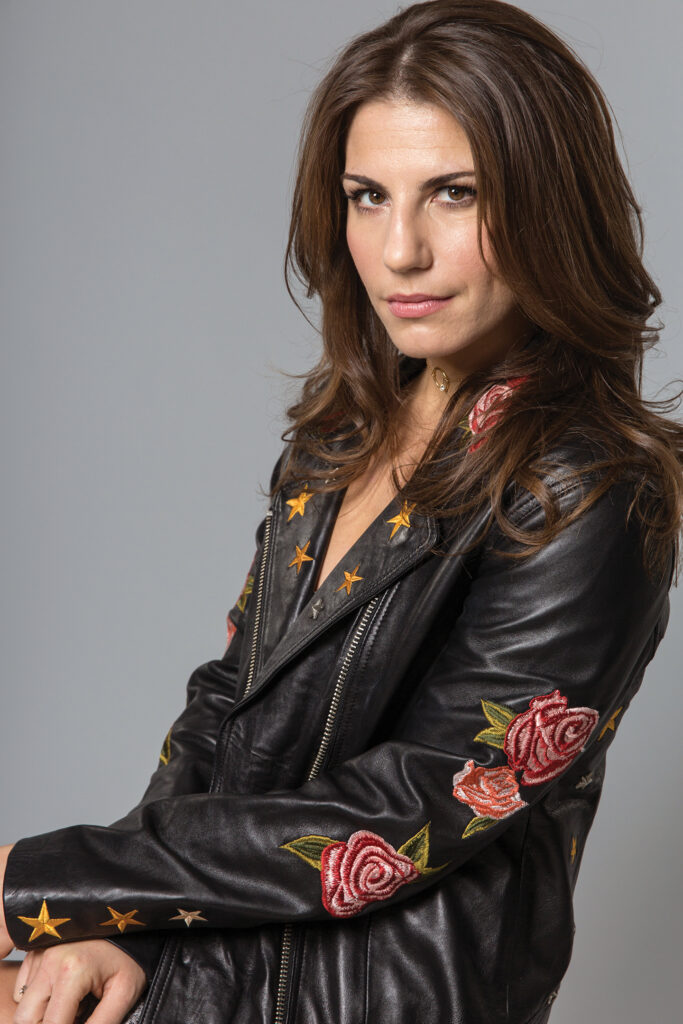
Lauren Duca
Ever since her unabashedly hilarious and honest tweet this past January announcing that she was getting a divorce, queer feminist journalist Lauren Duca has been on the minds of many LGBTQ people. Best known for her viral Teen Vogue essay “Donald Trump is Gaslighting America,” penned shortly after the 2016 election as that publication went mega-political, the funny and opinionated Duca is a bright light during these dark political times. “Our current political moment has forced us to ask who makes the rules as the norms and values dictated by the white supremacist patriarchy are increasingly revealed to be a crock of shit,” she says. “This is our time to overthrow the status quo, insisting on the truly equitable democracy we all deserve.” She’s taken on the patriarchy that is Fox News’ Tucker Carlson, discussing Ivanka Trump at length and turning into a feminist icon overnight. Her writing is also found in the New York Times, the New Yorker, and New York Magazine, as well as her regular Teen Vogue column “Thigh-High Politics.” Her spirit of resistance is so pervasive that she’s written a book, “How to Start a Revolution: Young People and the Future of American Politics,” published by Simon & Schuster this September. “Keep pushing back on ‘the way things are,’ and refuse to take ‘no’ for an answer,” she says. “I have no doubt that love will win.” —AE
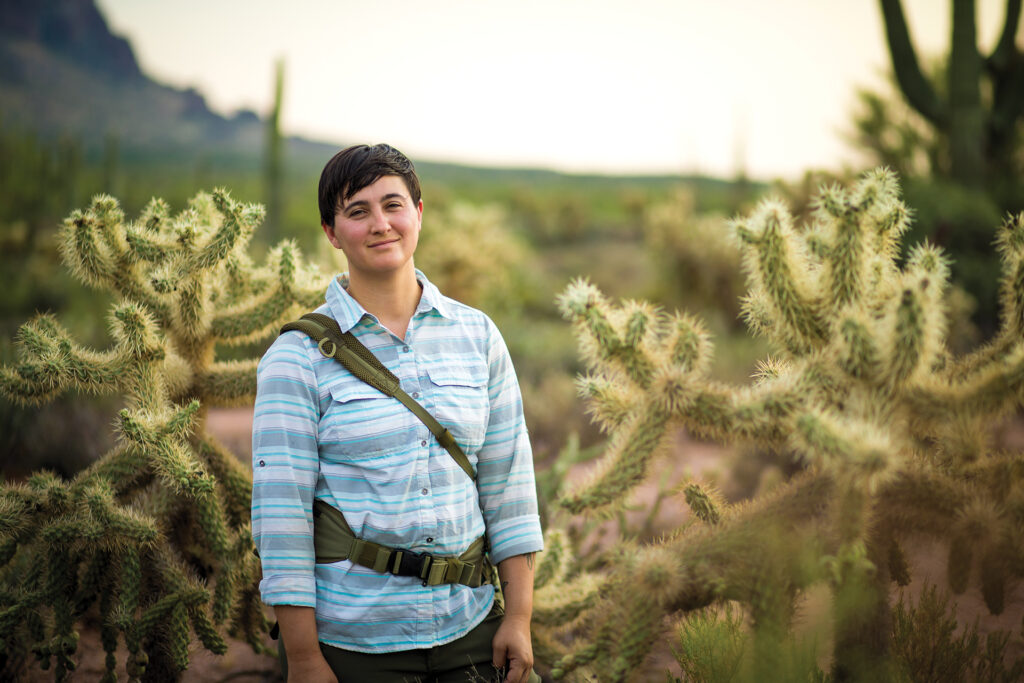
Lauren Esposito
“I can unequivocally say that I love my job,” says Dr. Lauren Esposito, the Schlinger chair of arachnology (a.k.a. the study of spiders) at the California Academy of Sciences and co-founder of the online group, 500 Queer Scientists. She should love her work, which allows her to research the evolutionary processes of arachnids and their adaptations over time to various habitats. Still, she wasn’t always certain about her life’s path. In middle school, she was torn between being a rocket scientist or a hobo, a dilemma she pondered in an assigned essay. “While I got an F on the assignment, thinking back it really encapsulated me as a human being.” Esposito describes herself as both analytical and adventurous, as comfortable in a lab studying spiders and scorpions as she is sailing the Caribbean. She is also an advocate for LGBTQ advancement and visibility in STEM fields, which is how 500 Queer Scientists was born. “Finding my path in an industry where LGBTQ people are told to leave that aspect of their identity outside the lab is daunting,” she says, “and for many years I tried in earnest to keep my queer identity separate from my scientist identity. Now I believe bringing those two parts together makes me a more productive scientist and a happier person.” The organization seeks to raise awareness of gay, queer, and transgender STEM professionals so that current and future researchers don’t have to face the lonely and often isolating position that Esposito once did. “I want them to know that they have a place in science,” she says. “We are here, we are queer, and our discoveries propel science forward.” For her advocacy, Esposito was recently given the National Organization of Gay and Lesbian Science and Technical Professionals’ Walt Westman Award. —RK
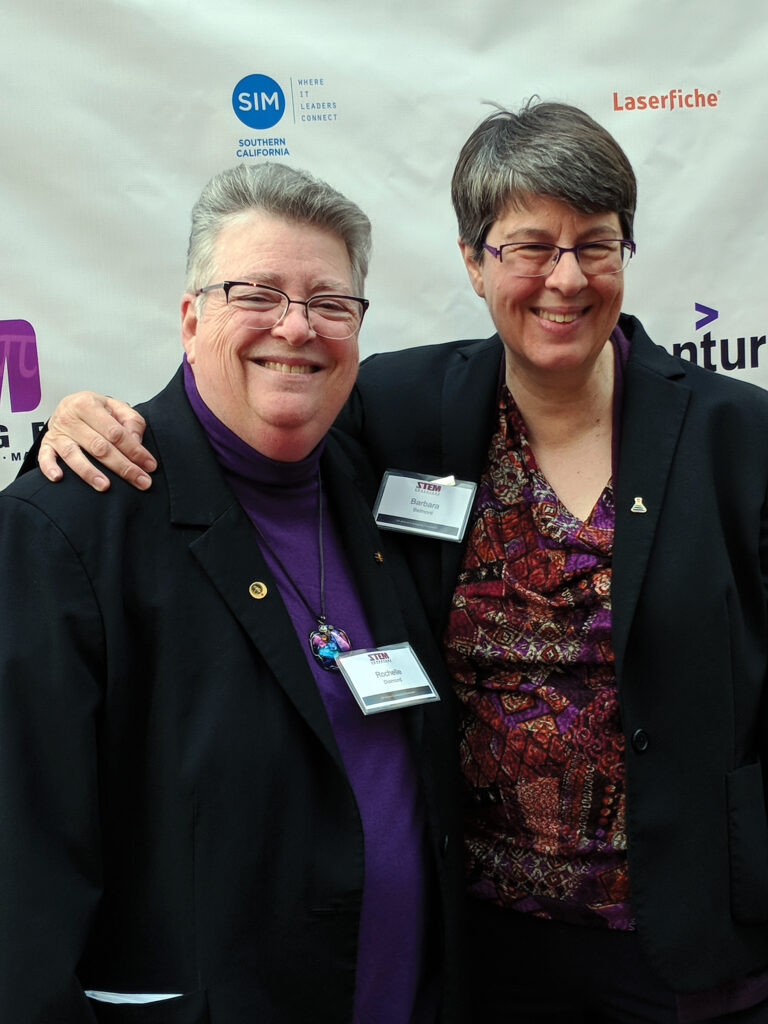
Rochelle Diamond
For Rochelle Diamond (left), the road through microbiology and chemistry hasn’t always run smoothly. Early in her career, she was asked to leave one biochemistry research team, she says, after a colleague learned that she was gay. Fortunately, she didn’t let the incident deter or shame her. She found a supportive community with the Los Angeles Gay and Lesbian Scientists and soon after landed an interview with the California Institute of Technology. “I came out in my interview,” she writes, “and the rest is history. I have found a supportive champion who has allowed me to blossom and be all that I can be.” She is now the director of Caltech’s Flow Cytometry Cell Sorting Facility, which measures the properties of cells by suspending them in liquid and “flowing” them through laser beams. (The data, widely applicable across the biological and chemistry sciences, helps researchers better understand the properties of cells and abnormalities.) She is also the chair of the board of directors of the National Organization of Gay and Lesbian Scientists and Technological Professionals (NOGLSTP), intertwining both her science and her activism. She has brought the NOGLSTP to national attention through such innovations as the Out to Innovate Summits, which every two years bring together LGBTQ scientists, researchers, and students nationwide. “The most rewarding part about my activism,” she says, “is helping to change the climate for LGBTQ people in classrooms and work environments.” Thanks to the efforts of Diamond and others like her, LGBTQ scientists everywhere can be out and proud. —RK
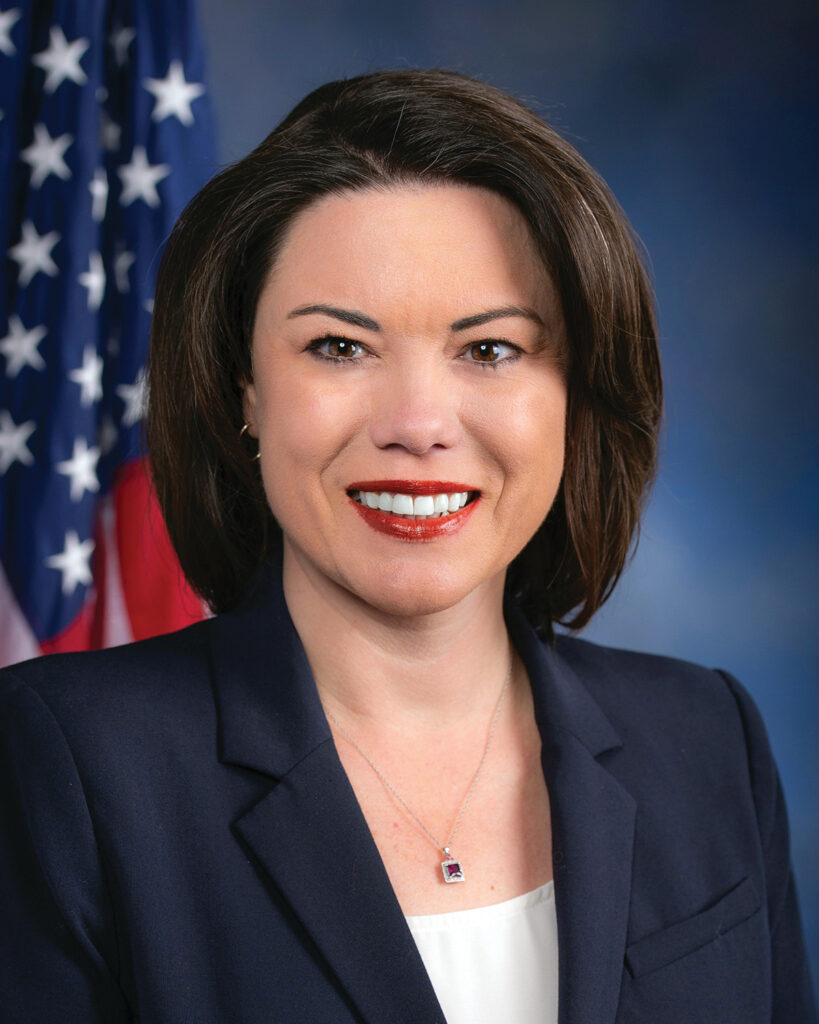
Angie Craig
The values that Angie Craig stands for are values many Americans support: Affordable healthcare and housing, equal-opportunities for education and employment, job-training, lower drug prices, investment in farmers and small business owners, and better infrastructure. She might be the United States’ first openly-gay Congressperson (representing Minnesota) who is also a same-sex parent, but she isn’t defined simply by this barrier-breaking status. “My wife and I have four boys and we want to make sure that every family has an opportunity if they work hard to succeed,” she tells GO. “No matter what the family looks like.” Since taking office, she has introduced a bill to lower health care premiums and co-sponsored others that would lower prescription drug prices. She has also taken a firm stand on LGBTQ rights by championing the Equality Act, a bill that would end discrimination based on gender and sexual identity. The bill may have passed its first hurdle, but Craig knows we still have some way to go for equal treatment. “It was progress to pass the Equality Act, but we’re going to have to win more elections if we want to see it signed into law. And lives literally depend on it.” —RK

Faye Driscoll
Faye Driscoll is into the humanness of this worldly life experience we’re all having. The American dancer and choreographer, who has won a Bessie Award and Guggenheim Fellowship most recently, premiered “Space,” a performance that confronts sensations of absence. “Space” is the final work in her five-year trilogy “Thank You For Coming,” an exploration of real person-to-person human connection. For Driscoll, she’s most excited about “creating spaces where we come together in real-time ritual,” she said. “Being together in shared physical space is becoming rarer and rarer—like handwriting and physical books.” Defying categories, Driscoll’s dances sometimes seem like plays. Sets are anything but steady; instead they are purposefully broken apart, and performers also may double as musical score providers. A creative enigma, she’s hard to pin down, but the New York Times has simply described her as “a startlingly original talent.” Growing up in Venice in Los Angeles, Driscoll says she “was one of those freaks that knew what I wanted to do from the moment I could talk and was gratefully encouraged to go ahead and do it.” She’s performed the world over, from the Venice (Italy) Biennale to the Brooklyn Academy of Music, and won’t be stopping anytime soon. Her coming-out process is “messy and awkward,” she says, perhaps akin to her gloriously undefinable dance/choreography/performative work. For her, coming out is “about choosing to live again and again.” To be in her “actual body and go towards my actual desires versus the ones projected or inscribed onto me” is simply a part of life, an “ongoing process of being brave enough to be embodied.” —AE
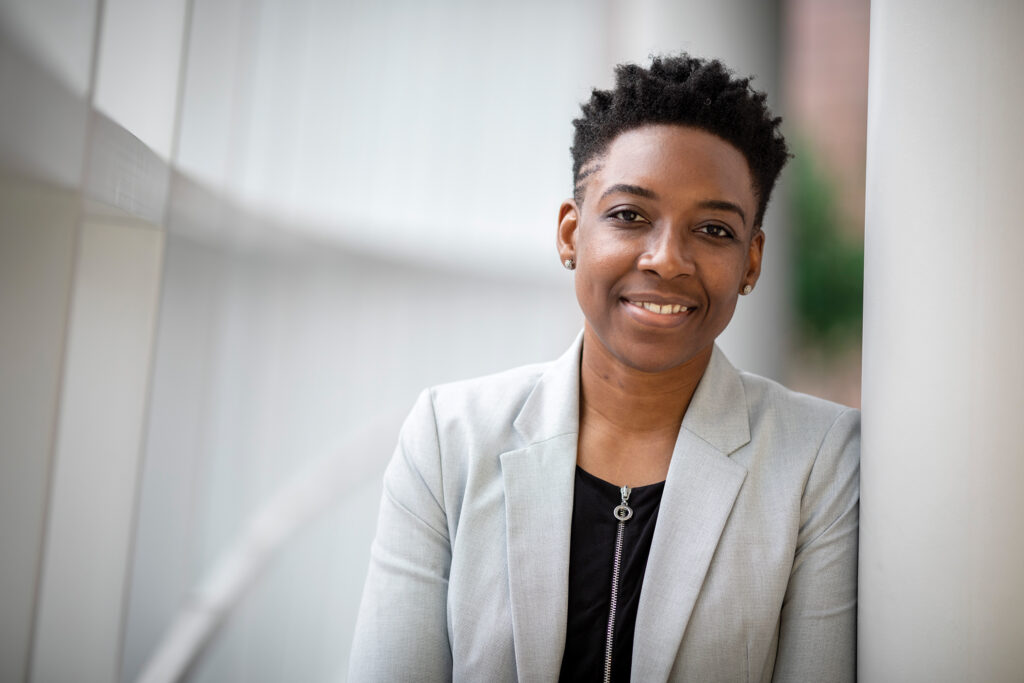
Maureen Erokwu
Eighteen years ago, Maureen Erokwu was forced to come out. “I was denied the option of sharing my news on my own time,” she tells GO. “It meant facing tough questions from my family and managing hurt from broken trust. Over the years, I’ve worked tirelessly to embrace, love, and remain authentic to self.” Herself-acceptance has turned into a boon for Erokwu, a technologist and entrepreneur who has learned what it takes to survive in a male-dominated industry. “As an out woman of color, I stand out, grab the attention of key stakeholders, and challenge the thinking of those I work with.” Erokwu is currently the worldwide supply demand planner for Apple, forecasting product demand and logistics for products such as Mac, iPhone, and iPad. She spent years bringing immersive Street View technology to the world. With six years of a successful partnership with Google and the founding of Vosmap, a Google-certified immersive media company that captures 360 panoramic walkthroughs of places like restaurants, hotels, museums, and much more, she helped numerous brands like Ralph Lauren, Mercedes, and ABC bolster their marketing objectives and increase customer engagement. She is also a self-described fierce advocate for women in technology, encouraging women to be unafraid and to choose to be around people who offer support and encouragement. “Go where you are celebrated, not tolerated,” she says. “It makes a world of difference when you have people who encourage, guide, and never fail to tell the world how amazing you are.” —RK

Lisa Coleman
“I was born in a currant field,” Lisa Coleman says when asked what brought her to her current field. Punny jokes aside, Lisa Coleman’s chosen career as a musician has seen her become a critical part of modern music history. An Emmy Award-winning composer and one half of the musical duo Wendy & Lisa, Coleman was only 19 when she started her career in one of the most successful rock bands of the 1980s: Prince & the Revolution. She was an out lesbian even then. “It sells records,” Coleman explains. “I’ve been used as a prop, or rock-and-roll affirmative action play.” Since then, Coleman continues to make records with Wendy Melvoin, plays on other musicians’ songs, writes lots of music for film and TV, and still has the time to create music of her very own; this past April, she put out her first solo album, titled “Collage.” The work, which is a collection of 11 mostly short, sometimes ethereal sometimes jammy instrumental piano improvisations, is “a collection of improvs done over the last few years of high contrast living,” Coleman says. “So many highs and lows. It’s personal, emotional and somewhat mysterious.” But there’s definitely one thing Coleman’s not mysterious about. “When I was younger,” Coleman tells GO, “I resented that gay people had to declare their sexuality, [while heterosexual people didn’t need to] … The mere act of being yourself, for LGBT people, has been an act of activism, and it has been dangerous. So, if we needed to stand up and be counted then ok! Queer as all get out! See what it looks like.” —JDG
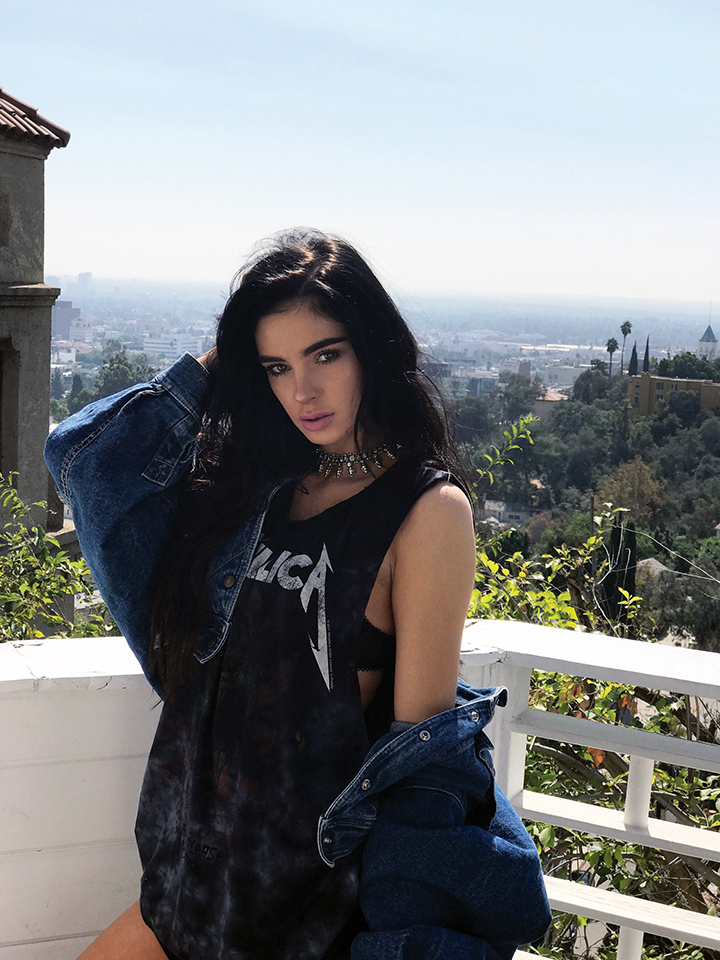
Brittnay Vollmar
Have you noticed the gorgeous new bartender at New York City’s legendary lesbian bar the Cubbyhole? That would be Brittnay Vollmar. Hailing from Florida, Vollmar started modeling when she was 11 years old and, as she got older, she dipped her toes into acting and production. She’s appeared in commercials for Moet & Chandon, the Tribeca Film Festival, and Rhode Microphones. Her most recent modeling work is a Samsung campaign that is currently showing at Samsung 837, the company’s flagship store and event space in New York City. Being out has been a challenge both in her environment and her industry. “I met my girlfriend while living in Miami. She was born and raised there from a traditional Hispanic, Catholic background. The pressure of having to be conservative was weighing heavy on me,” she explains. On top of that, the production company she worked for in Miami asked her whether she wanted to keep her sexuality private “to broaden my audience,” she says. “When I finally made the decision to not hide my sexuality, I was only being considered for gay films or roles.” She’s since moved to New York City, and the day after she got there, she applied to work at the Cubbyhole, a West Village institution. It was a far cry from bars in Miami, where she was forced to deal with people who made her feel uncomfortable, or where she was told to wear revealing clothing. “I wanted to get away from that type of atmosphere and be happy working with my community,” she says. Landing the job wasn’t easy, but she persevered. “It feels so right. I told my girlfriend the other night, ‘If I won the lottery, I would still work at Cubbyhole.’” —DT
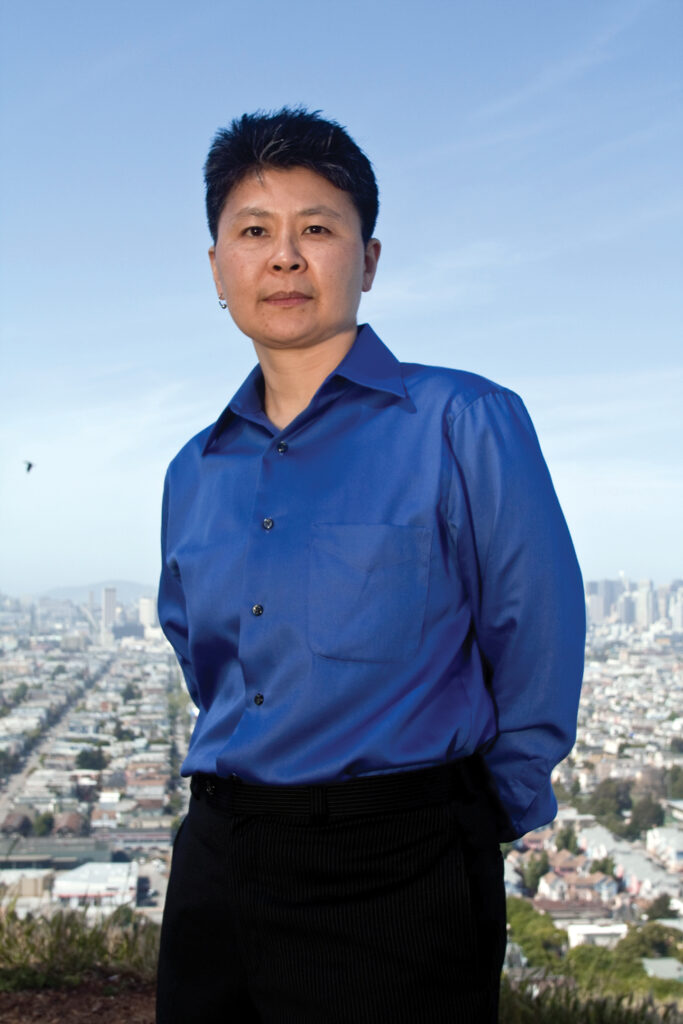
Madeleine Lim
As a queer activist in her native Singapore, Madeleine Lim knew too well what it was like to be silenced. She fled Singapore at the age of 23 after learning that her work had drawn the attention of the country’s strict government. Her 1997 award-winning film, “Sambal Belacan in San Francisco,” which explores the intersections of race, nationality and sexuality, remains banned there. In 2000, Lim founded Queer Women of Color Media Arts Project (QWOCMAP) as a platform for filmmakers and storytellers whose work was too often marginalized. QWOCMAP, which produces and distributes films by queer women of color, aims to give voice to the silenced by blending filmmaking with social justice and the push for equity. She tells GO that she was influenced by filmmakers like Pratibha Parmar, Isaac Julien, and Marlon Riggs, who challenged the notion of the documentary genre by turning their attention inward. “By telling stories from an insider’s perspective,” she says, “they reinvented the boundaries of genre and radically altered the craft of filmmaking. They inspired me to use film to tell my own story and collaborate with those of us whose voices are so often unheard and forcibly silenced.” Lim’s own films have made her the four-time recipient of the San Francisco Arts Commission Individual Artist Commission, among other accolades. —RK
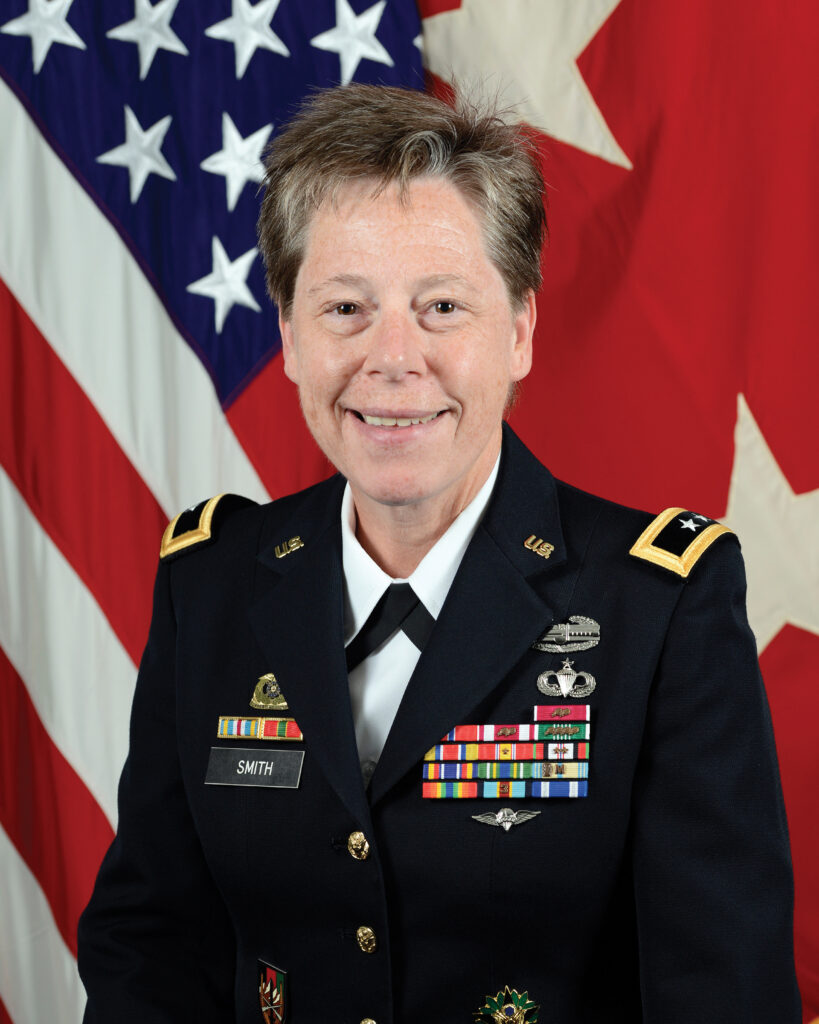
Tammy Smith
When Tammy Smith was named brigadier general in 2012, the U.S. military’s “Don’t Ask, Don’t Tell” policy had only been repealed a few months before. “There were no ‘out’ generals or admirals at that time,” she says, and she fully anticipated the media attention her promotion received. Soon, the entire world knew she was gay. “It was difficult for me initially because I kept my personal life extremely private out of reflexive habit. Despite the difficulty, I knew it was the right thing to do.” Smith, who is the U.S. Army’s first openly LGBTQ flag officer, has since become a driving force in the Army’s push for inclusivity, despite any adverse effects it may have had on her own chance for further promotion. “I understood the impact it would have for young soldiers struggling with their own orientation,” she says, “to know that there was a general officer who was in a same-sex relationship leading in their Army.” Turns out, she didn’t need to worry about her career; in 2016 she was promoted to major general and is now tasked with managing personnel policies for the full Army. Her public coming out has given her the courage to tell others in the LGBTQ community that “your visibility is powerful. When you are living an ‘out’ life, you give others hope and courage to do the same.” —RK
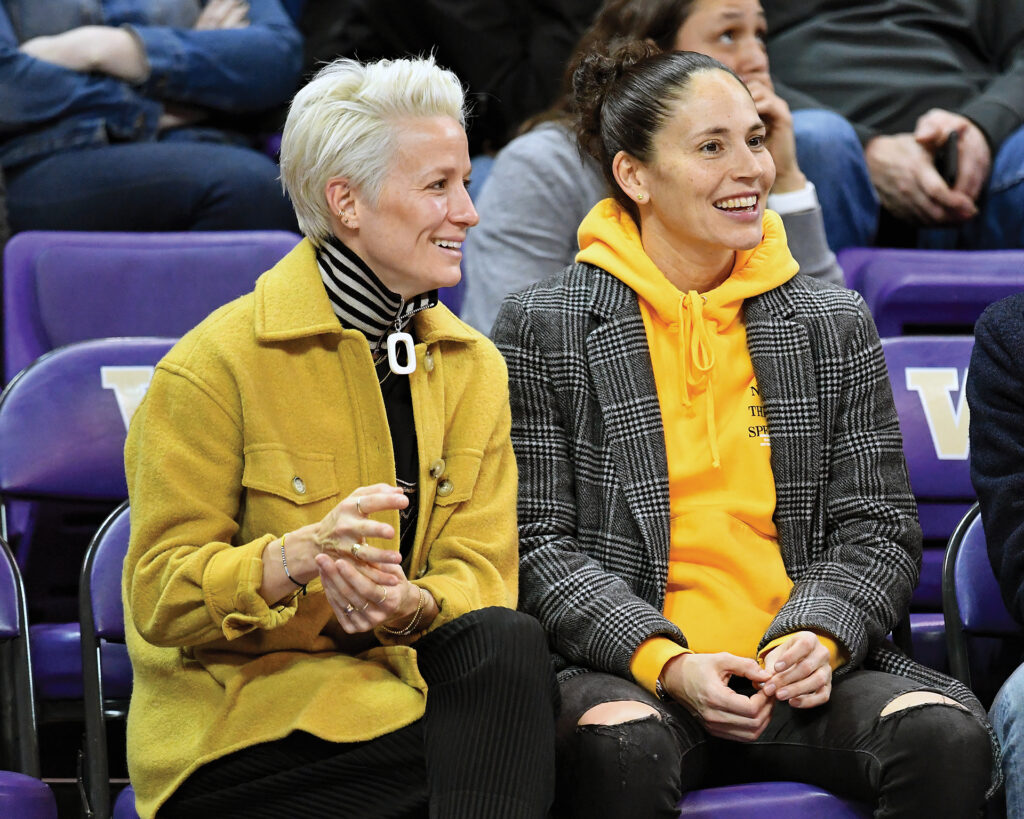
Megan Rapinoe and Sue Bird
ESPN’s 2018 The Body Issue made history when it featured American professional soccer player Megan Rapinoe (left) and her romantic partner Sue Bird as the first ever gay couple to appear together on the cover. Megan is the captain of Reign FC in the National Women’s Soccer League, and Sue Bird is a legendary WNBA player for the Seattle Storm. A tale of titans, they met at a sponsor event at the 2016 Rio Olympics, and have since been making all sorts of history. Rapinoe, the current co-captain of the U.S. Women’s National Soccer Team, and Bird hope to advocate for other gay couples. “I think our view is still way too narrow of gay people in general,” Rapinoe told Washington Blade in 2014. “Stereotypes still very much persist and they are just such incomplete views of who we really are as people, so I think for that reason it’s really important to just continue to push those boundaries.” Rapinoe has been an advocate for LGBTQ rights and other movements too, such as Black Lives Matter (inspired by Colin Kaepernick, she isn’t participating in the singing of the National Anthem during the current FIFA Women’s World Cup). Bird believes the work the couple is doing will have long-term effect. “Ten years from now,” Bird said to AdWeek, “we’ll still be talked about as the first gay couple that ESPN had in The Body Issue… But, really, with anything, it’s always about breaking down that first barrier and then have it be the norm—and I think you want that in any walk of life.” —JDG
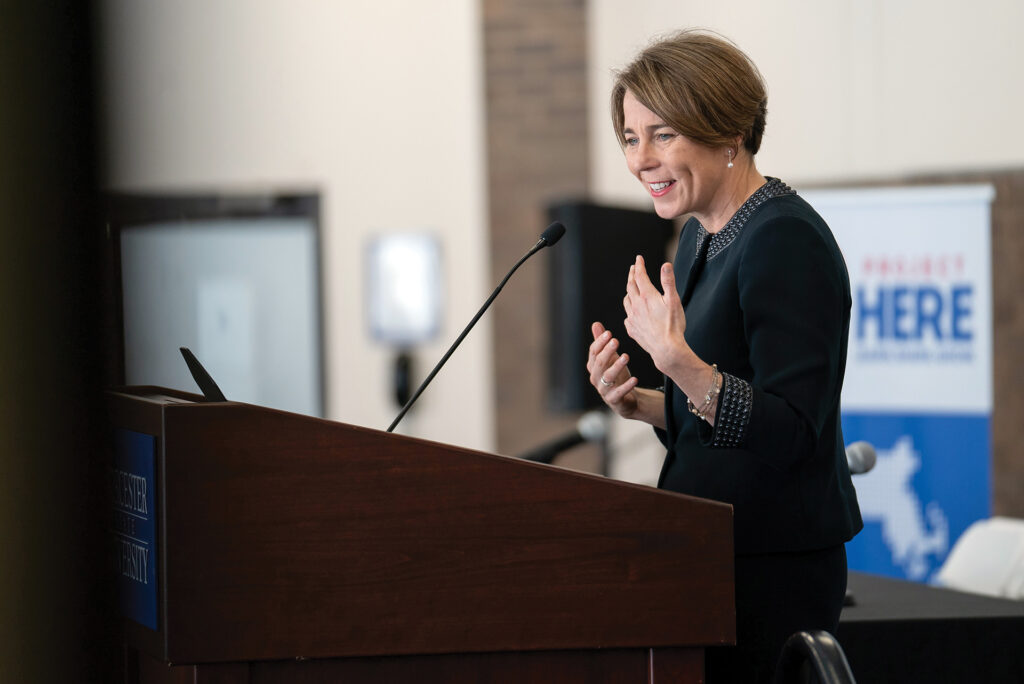
Maura Healey
Maura Healey is perhaps the only attorney general who can say she was once a professional basketball player. For two years, she was point guard on a professional team in Europe, and, in 2006, was inducted into the New England Basketball Hall of Fame. But she gave up the sport to attend law school in Massachusetts and then went on to work as a litigator in private practice. “Growing up, I was taught the importance of being involved in my own community,” she tells GO. “I loved working in private practice, but saw first-hand the power and the opportunity of the Attorney General’s office and jumped at the chance to become a civil rights lawyer.” Since taking office in 2015, Healey has regularly defended the rights of LGBTQ people, advocating for laws that protect transgender individuals and investigating claims of harassment and discrimination based on sexual orientation. She also promotes the reproductive and economic rights of women; the AG’s office became the first state agency to provide parental leave for its employees in 2015. And while she recognizes the vital role that her office plays in protecting our human rights, she wants those of us in the LGBTQ community to know that we all have our own job to do. “Stand up for those around you who are vulnerable and under attack,” she says. “This is about making sure that everyone feels safe and supported—at school, at home, and everywhere else in this country. All of us have a role and an obligation to stand up for civil rights and equal treatment under the law.” —RK

Scout Durwood
Los Angeles-based Scout Durwood loves to get naked. It’s one of the many things she laments about the shift from stage to screen in her comically existential web series “Take One Thing Off.” The show chronicles her evolution away from burlesque at supper clubs and dive bars into this bizarre digital void, where she’s removed from her audience. What she loves about IRL? “It’s a collection of people occupying the same space in a unique combination that will never happen twice,” she says. “Also, I get naked.” She ponders whether, indeed, “IRL is I-R-relevant.” Nonetheless, she’s killin’ it on-screen in Los Angeles, having recently starred in MTV’s scripted comedy series “Mary + Jane,” and as one of six cast members in Oxygen’s “Funny Girls,” which follows the lives of six female stand-ups around the City of Angels. Her debut studio album is also called “Take One Thing Off,” and she’s working on her second comedy music album now, with a fall 2019 release date. Her complete breakthrough to the screen is coming soon in the form of a lesbionic scripted comedy series that’s in development with a major TV studio. Like her comedy, her coming out was both “so easy, it’s almost embarrassing,” yet equally tragicomic thanks to her first girlfriend, who was “a nightmare.” As a long-standing lez, she encourages the LGBTQ community to do “everything you can to intersect,” encouraging people to “move through the world with more empathy than ego, especially as artists who bear the privilege and responsibility to create.” —AE
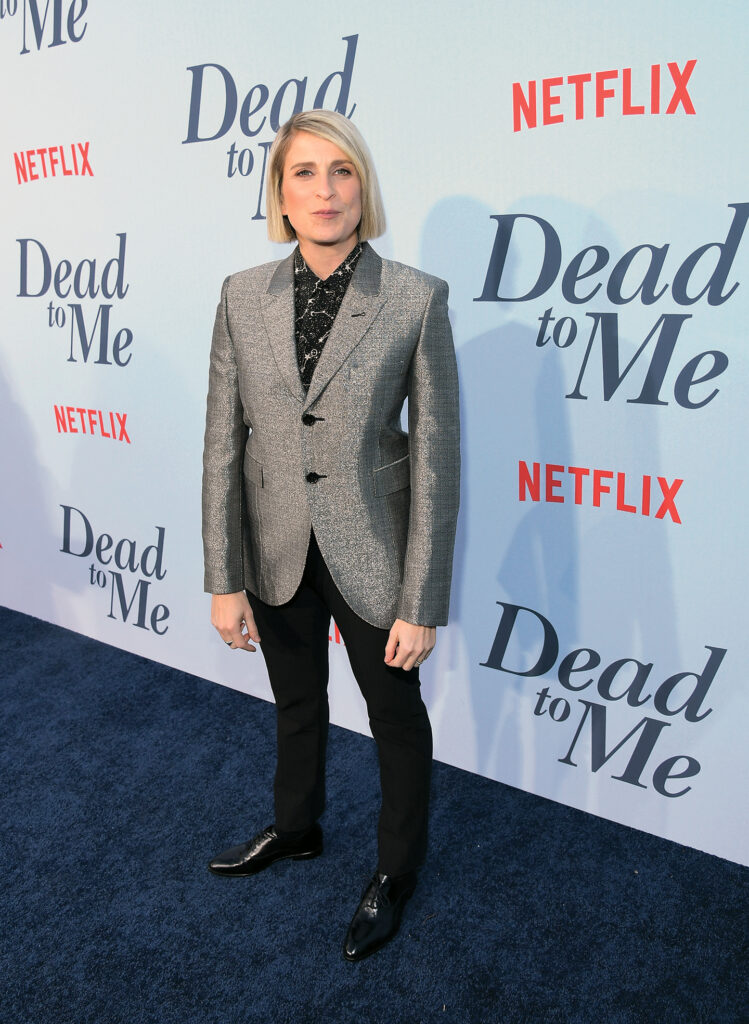
Liz Feldman
“Being out has definitely helped me,” says Liz Feldman, who is both the creator as well as the executive producer for Netflix’s newest hit, “Dead to Me.” “When I began being myself fully and openly, my career started taking off,” she says. Starring Christina Applegate and Linda Cardellini as friends who meet at a grief group, “Dead to Me” been praised for its dark humor, as well as its spotlight on two strong, nuanced, female leads. “Since the show deals with universal themes like grief and loss, it seems to have resonated with a lot of people,” Feldman says. An outspoken advocate for LGBTQ rights, Feldman is also well known as the host of “This Just Out,” a “gay positive” YouTube talk show featuring many LGBTQ artists that’s filmed at her own kitchen table. Feldman got her start in show-business doing stand-up comedy at the age of 16. Since then, the Second City alum has racked up television credits both as a writer and a producer. She wore both hats for “Hot in Cleveland,” “Two Broke Girls,” and “The Ellen DeGeneres Show” (for which she won four Emmys). She also wrote for the 79th, 86th, and 87th Academy Awards and created the NBC sitcom “One Big Happy.” The most rewarding aspect of her work, she tells GO, is “getting to connect with a wide, international audience.” Further, she says, “My goal as a writer is to uplift, entertain and when possible, to heal people through the stories I tell.”—JDG
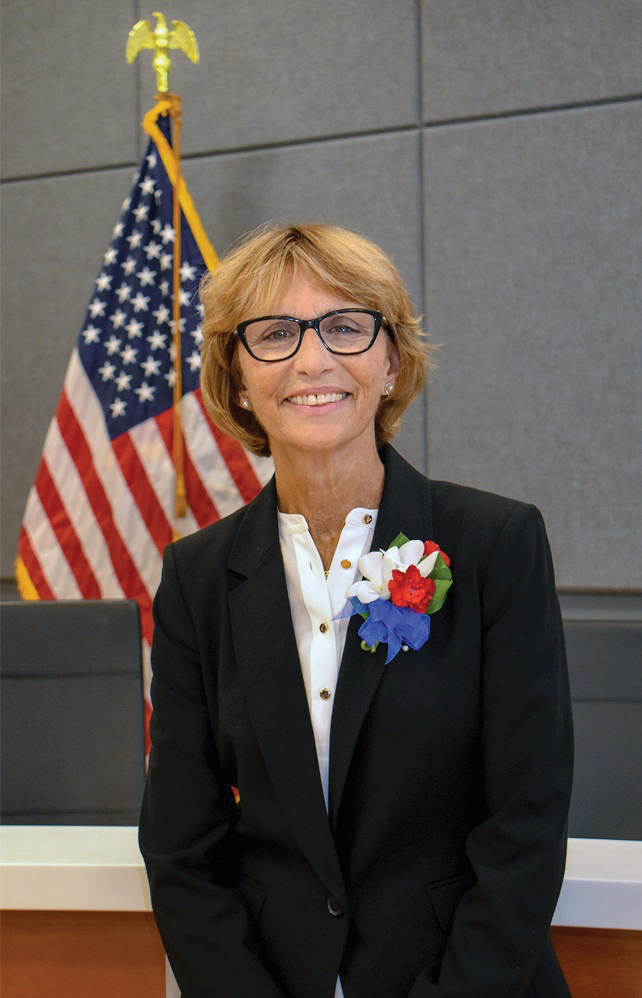
Teri Johnston
Teri Johnston knows that, as an LGBTQ woman, she’s been lucky enough to live her life and career openly. Still, she says, “I am amazed on a daily basis at the level of fear, intimidation, and discriminatory tendencies that lurk deep inside many. I have always believed that I control a great deal of my fate.” To her, that’s meant transcending the obstacles often thrown at women in general and gay women in particular. As a college student, she saw success on the softball field, becoming a three-time All-American player on one of the first ever sports scholarships offered to women. She later embarked upon a successful career in the private sector before opening her own construction and renovation company in 1995. But her most recent accomplishment—becoming only the second woman to serve as mayor of Key West and the first openly gay woman to become mayor of any Florida city—is one that she didn’t have control over. “It kind of chose me,” she says. After leading a successful grassroots campaign to lower windstorm insurance rates across the state, “city government was the next natural step for me.” The most rewarding aspect of her current job, she says, is representing the people she serves in a community that strives to let everyone live openly, and without fear. “The official motto of Key West,” she says, regardless of one’s sexual orientation, “is ‘One Human Family.’ We all find our way in this diverse, inclusive community.” —RK
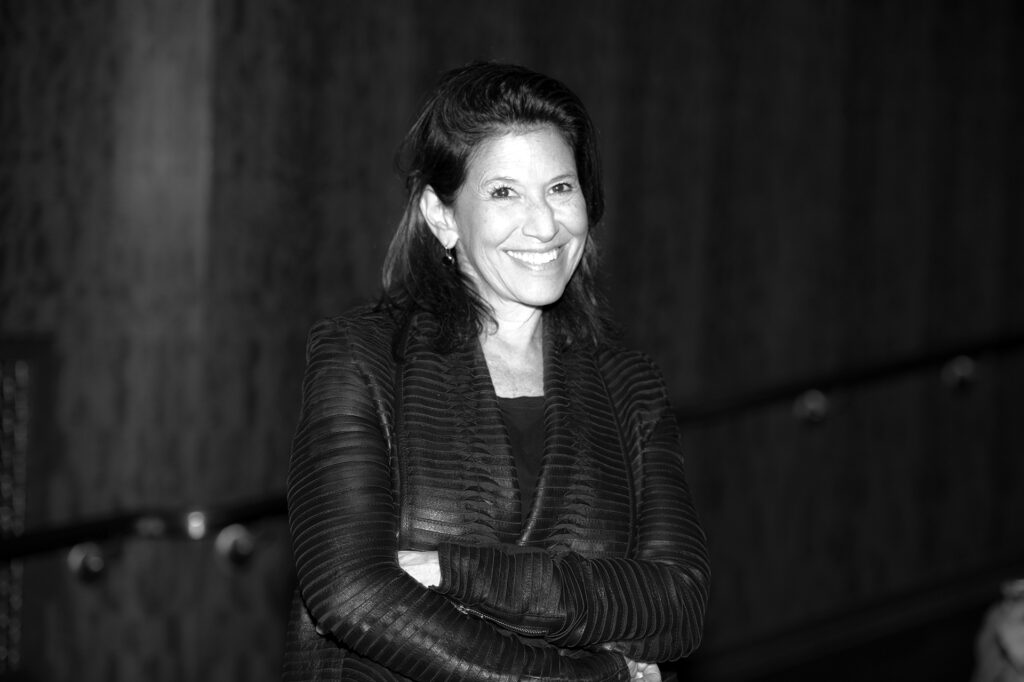
Jane M. Saks
Cultural alchemist, arts advocate, creative collaborator, writer, artist and educator Jane M. Saks is hard to pin down, for she’s queerly everywhere at once. She works to challenge and champion issues of gender, sexuality, human rights, race and power within the worlds of arts and culture, politics and civil rights, academia and philanthropy. She’s the founding president and artistic director of Project&, an arts organization that focuses on producing social impact-oriented cultural works, which has collaborated with numerous MacArthur fellows and Pulitzer Prize winners, such as photojournalist Lynsey Addario, playwright Lynn Nottage, and painter Kerry James Marshall, to name just a few. For Saks, her life and her work are an embodiment of queer space. “I can’t talk about my work, life, my life philosophy or the most rewarding aspects of my life without speaking about the rich gift and necessary practice of creating Queer Space and occupying it fully—it is truly a queer life,” she says. Saks has done a lot of everything, from serving on the boards of OTV Open Television and the South African Constitutional Court Artworks and Architecture Committee, to being a judge on the regional panel for the White House Fellows program during the Obama Administration, to lecturing at Yale, Orleans Parish Prisons, and the Whitney Museum of Art. “The most radical and most difficult thing we can do, is to be fully and authentically ourselves—round and round the clock,” she says. “Full Stop. Don’t ever stop” She lives in Chicago with her partner, Emma, and their daughter, Esmé. —AE
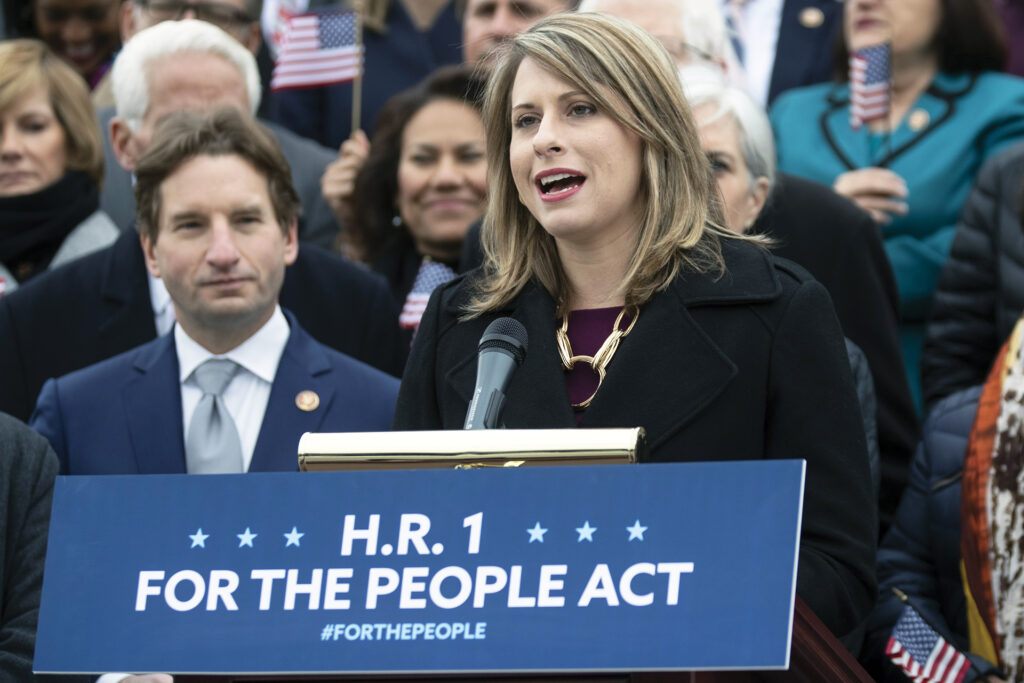
Katie Hill
Katie Hill might be a freshman Congresswoman (she just took office in January), but she’s already made a name for herself on Capitol Hill. In November, she became California’s first openly bisexual member of the U.S. House of Representatives. She is now vice-chair on the Committee of Oversight and Reform (chaired by Elijah Cummings), as well as co-chair of the Congressional LGBT Equality Caucus. This past month, before the House passed the Equality Act, she provided the Democratic rebuttal to a last-minute attempt by Republicans to stop the bill. “Everyone should have a fair chance to earn a living,” she said, “to go to school, and provide a home for their families without fear of harassment or discrimination.” She’s established herself as part of the new wave of millennial politicians; her grassroots campaign was documented by the HBO news show “Vice,” and she recently spoke openly with CNN about a painful decision to consider an abortion at the age of 18. Before running for office, she was executive director of the non-profit organization People Assisting the Homeless, and from this pulpit helped pass Proposition HHH, a ballot initiative that saw $1.2 billion in funds go to homeless services in Los Angeles. Whether she is defending a woman’s right to choose, speaking out for the homeless, or advocating equal rights for LGBTQ individuals, Hill’s position can be summed in her closing words on the House floor, before the passing of H.R. 5: “I couldn’t be prouder to be part of a new generation of leaders who are the ones to finally pass the Equality Act and fight for true freedom and equality for all.” —RK
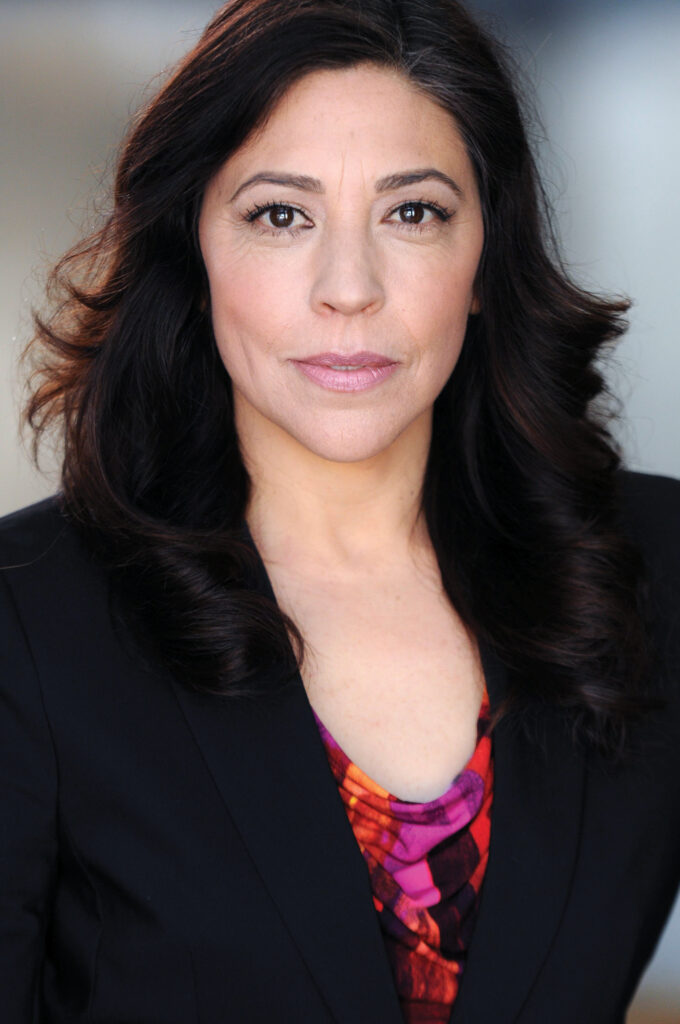
Tina D’Elia
Tina D’Elia started “breaking all the rules” at 5 years old, when she snuck away from her sister’s baptism to an empty church, walked up to the altar, and “gave a complete—if private—performance,” unnoticed. That was the day she “baptized [herself] as an actor in the Catholic church.” D’Elia’s certainly noticed as an artist now. The actor, director, and screenwriter is also the casting director for the trailblazing 2019 film “Transfinite” that focuses on multicultural, supernatural trans and queer people, directed by Neelu Bhuman. Meanwhile, D’Elia’s own stage show, “Overlooked Latinas” (directed by Mary Guzmán), at Los Angeles’s Brava Theater has received standing ovations from sold-out houses. In order, she’s won the Frameline33 Audience Award for her co-screenwriting the short film “Lucha,” the Trail Blazer Award and Executive Producer Award from the Equality International Film Festival, the Diversity Casting Award, and the Best Actress Award from the Equality International Film Festival. Most recently, D’Elia received the Bronze Producing award for a web series with the Equality International Film Festival. What guides her in her artistic choices comes down to this: “I believe art must be in alignment with social justice and uplift all marginalized communities.” —JDG
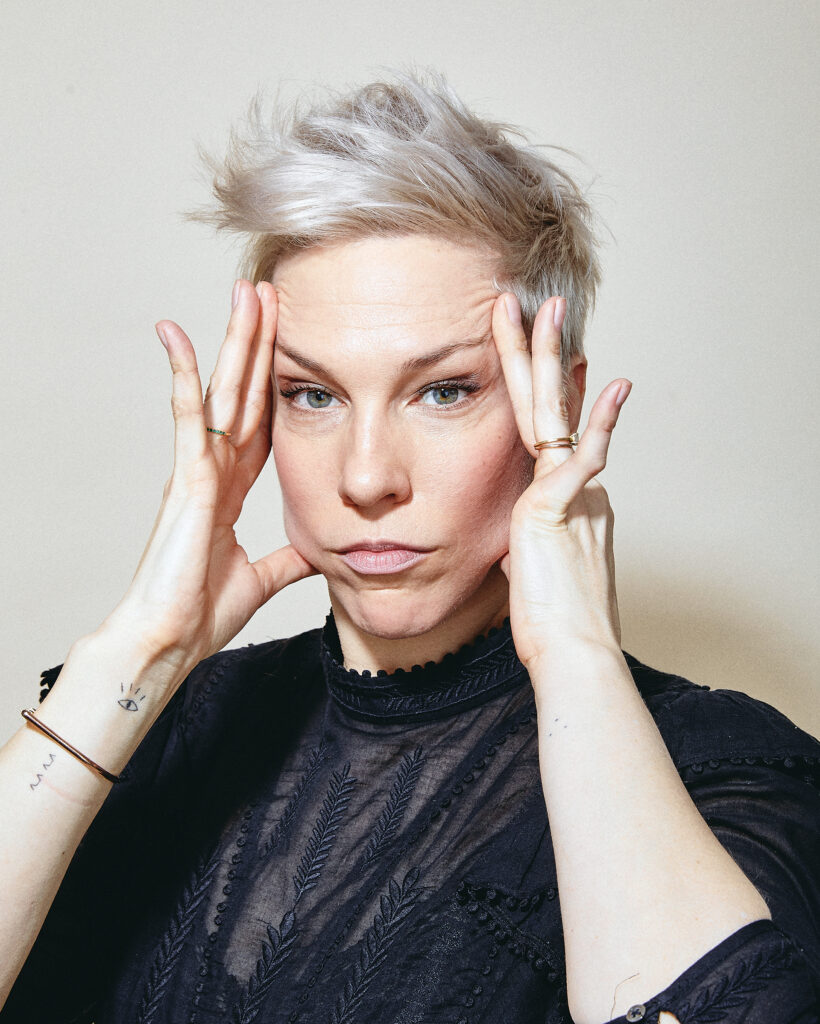
Rebecca Henderson
The role of Lizzy, one of Natasha Lyonne’s friends on Netflix mind-trip series “Russian Doll,” wasn’t a far stretch for actress Rebecca Henderson. “I’m constantly the supportive best friend lesbian,” Henderson told The Cut earlier this year. In this case, Lizzy’s support spanned dimensions: she was one of the enduring guests at Lyonne’s character Nadia’s birthday party, stuck in a time loop that reset with Nadia’s repeating deaths (on a show that was, incidentally, co-created by Henderson’s wife, Leslye Headland). Always showing up at the party in white overalls and cropped, bleach-white hair, Lizzy was realistically recognizable as that friend who has no problem talking in a social setting about changing her tampon. Henderson also starred this year in the indie film “Mickey and the Bear,” which premiered at SXSW and Cannes, and is currently rehearsing an off-Broadway adaptation of Chekhov’s “Three Sisters,” titled “Moscow x6.” Henderson’s visibility in these roles is in part thanks to the role that had the biggest impact on her. “One of the most important things that ever happened to me was seeing Ellen come out on TV,” Henderson tells GO. “I was so overwhelmed I sobbed uncontrollably afterwards realizing that I was gay. The tears were happy tears to finally have some peace about what was going on with me.” Queer representation in entertainment has come a long way since then. “And I love being a part of that,” Henderson says. “If I can positively represent something for someone… well, that’s my dream come true.” —SEJ
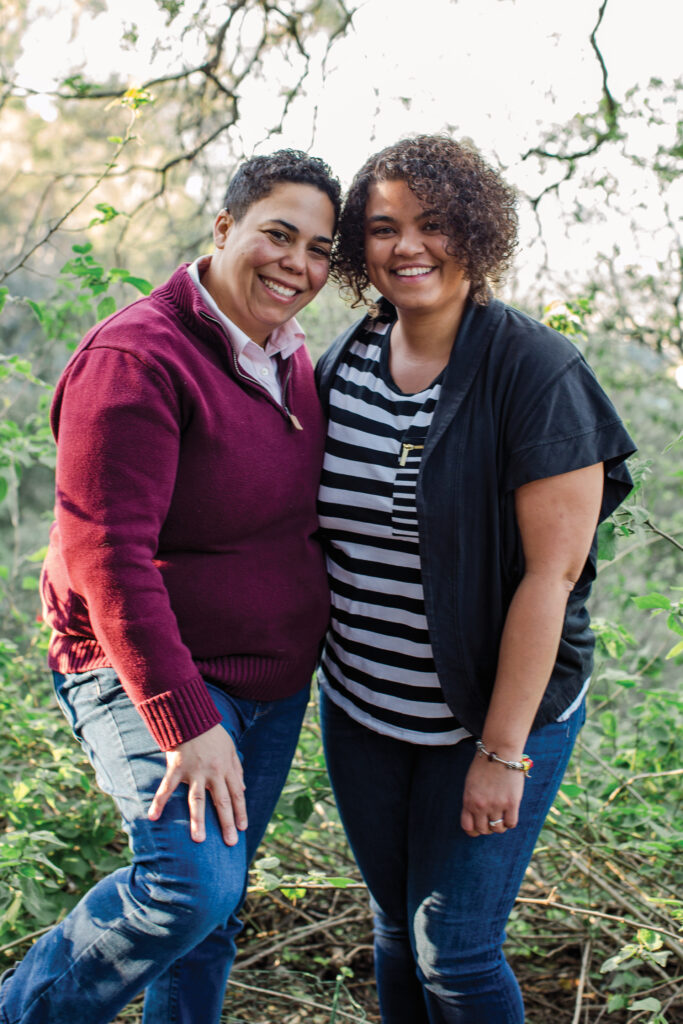
Christel Miller
“Film and TV is all about representation and emotion through art,” says Christel Miller (left) who works closely with showrunners, producers, and writers as Television Executive at NBC’s Current Programming Department. Her position has her giving creative feedback and approval on all aspects of production and post-production. At the same time, she is giving feedback to her own company on the work environment it has created for out employees as a member of Out@NBCUniversal, the company’s LGBTQ affinity group. “Being my true self in my workplace allows me to have the confidence in my taste, perspective and creativity,” Miller says. “Confidence gives you a seat at the table and being at the table allows you to create change. Being out has given me authority to be authentic and thrive.” And thrive she has. A recipient of Power Up’s Rising Star Award, as well as NBCU’s Going the Extra Mile Award, Miller is also a member of OUTFEST (the LGBTQ film festival) and serves on the board of GLAAD. —JDG
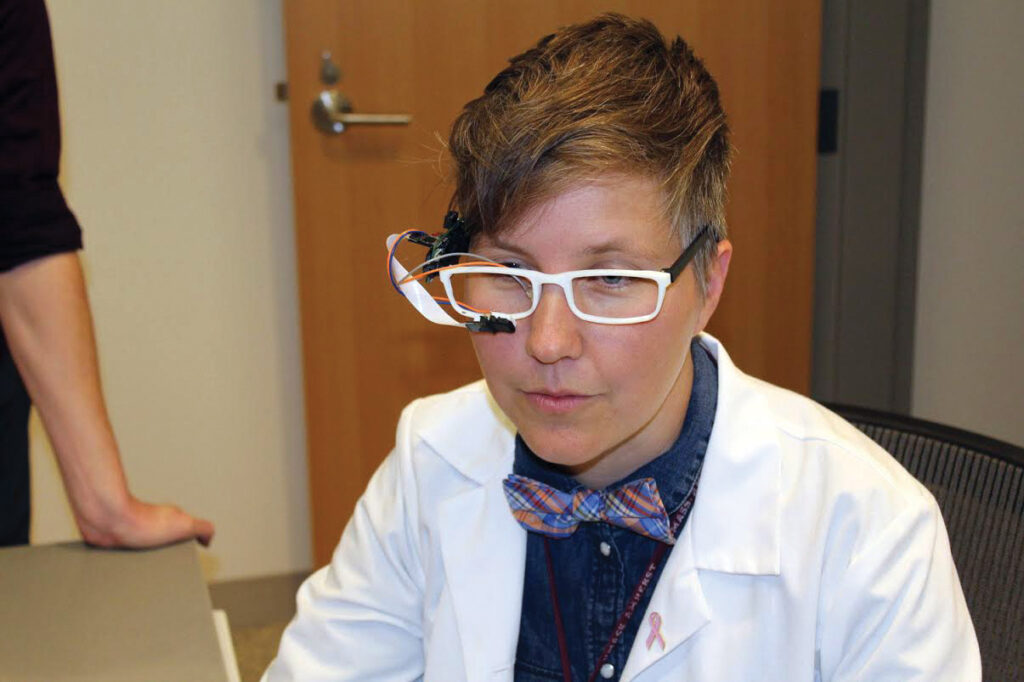
Rachel Walker
Rachel Walker, who last year became the first-ever nurse to be named an “Invention Ambassador” by the American Association for the Advancement of Science and the Lemelson Foundation, is a self-described “queer nurse inventor who practices public health nursing at the intersection of community and biotech.” Surprisingly, she never imagined she’d become a nurse, let alone ascend to the vanguard of her profession. Serving in the Peace Corps in Mali changed that. She “developed such an awe for the knowledge, skills, and general badassery of the Malian nurses and midwives I worked alongside,” that she enrolled in nursing school upon her return to the U.S. It was there that she met “amazing women inventing new ways to support healing and well-being with and for communities impacted by forces like violence, poverty, and structural racism,” Walker says. Nurse inventors believe technology is just a tool, and that it should always be co-designed with the community in ways that “support human dignity, capability, and justice,” Walker explains. “Nurses are masters at Making. It. Work. No. Matter. What.” She describes what she works for and what she hopes for. “Just imagine what might be possible, if we properly supported and made space for nurse innovators working at every level of practice and education? I want to live in that world.”—JDG
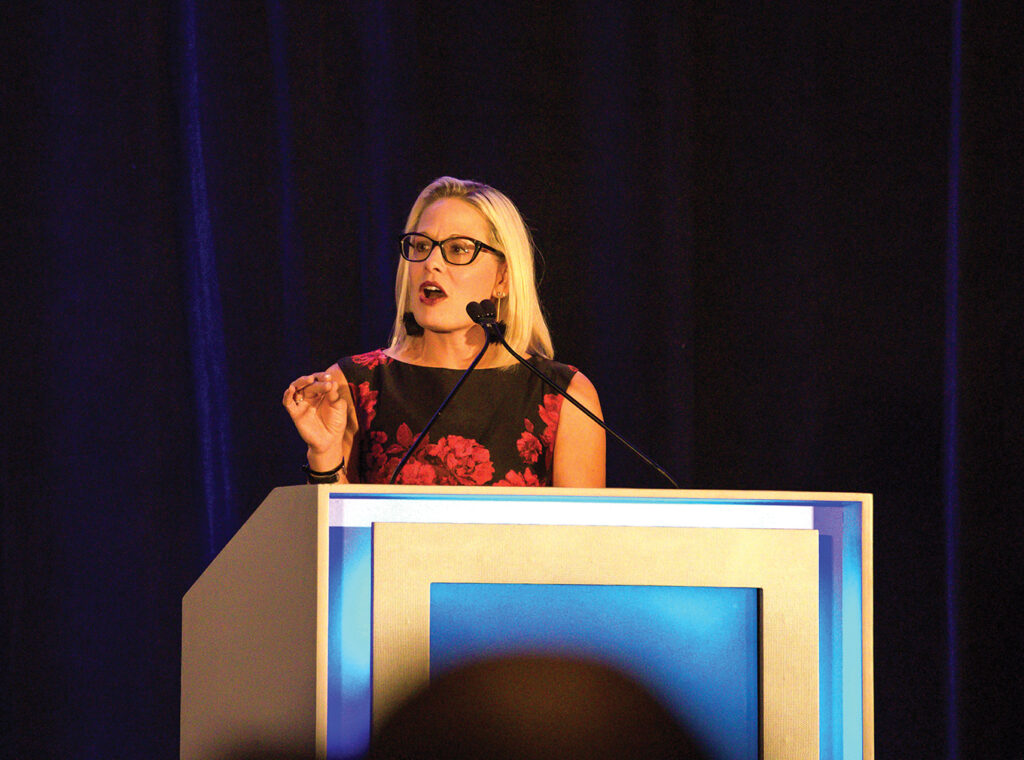
Kyrsten Sinema
After six days of vote-counting last November in an exceptionally close election, Kyrsten Sinema became the first female senator to represent Arizona and the first openly bisexual person elected to the U.S. Senate. Sinema had been a fixture in Arizona politics long before drawing national attention for her Senate win. As a state legislator in the mid-2000s, she led opposition to two referendums to limit same-sex marriage. She was elected to the U.S. House of Representatives in 2012, where she served until 2019. She’s been hailed by the Washington Examiner as Arizona’s new “maverick” because of her willingness to work across the aisle. Her bipartisan approach has already paid off; her first piece of legislation, which would offer greater protection to veterans seeking home loans, passed in the Senate. In her election acceptance speech, she stressed the need for unity in a time when divisions seem insurmountable: “We can work with people who are different than us. We can be friends with people who are different than us. We can love and care about people who are different than us. We can keep people who are different than us safe. We can be good people who care deeply about each other even when we disagree.” —RK
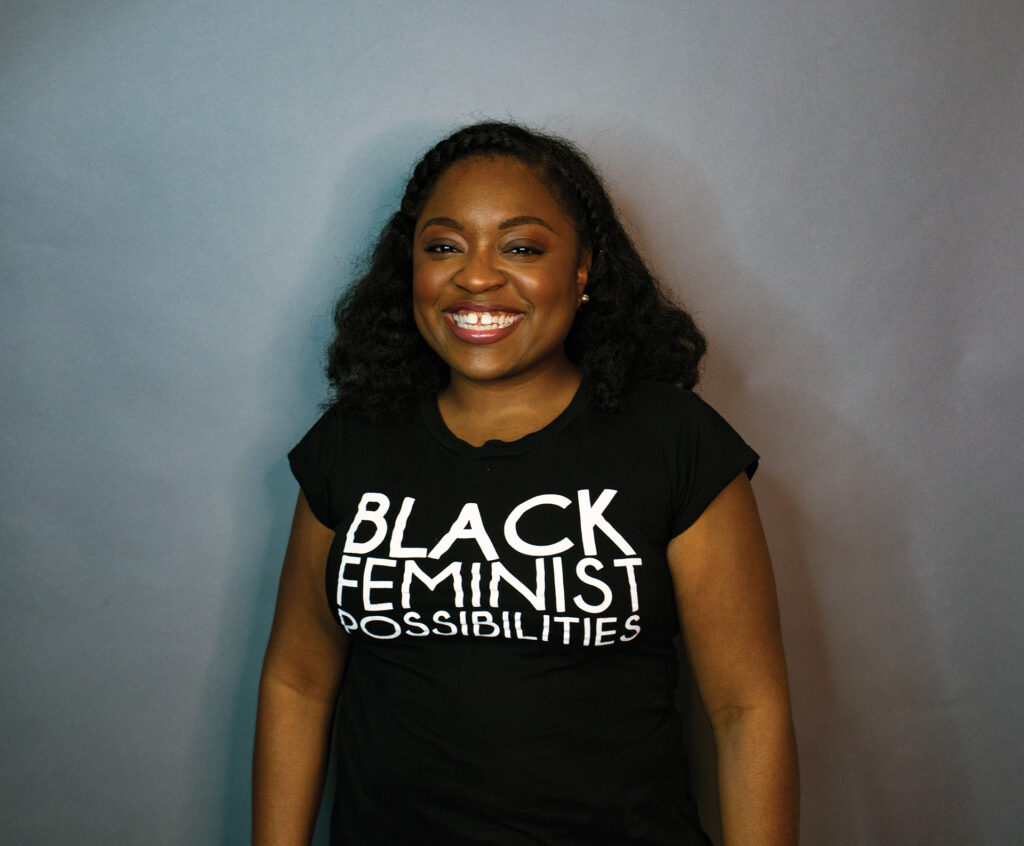
Charlene Carruthers
Charlene Carruthers is one of the most influential activists working today, period. Her new book, “Unapologetic: A Black, Queer, and Feminist Mandate for Radical Movements,” which came out in August 2018, is a manifesto that reimagines the Black Radical Tradition, drawing on Black intellectual and grassroots organizing from the Haitian Revolution to the U.S. Civil Rights, LGBTQ rights, and feminist movements. Ultimately, her book is a call to action, offering a framework for activists and young people to become visionaries and leaders. Her knowledge comes from more than a dozen years of experience working in racial justice, feminism, and youth leadership development. Her work has been highlighted across the globe, from major media outlets like the BBC to legacy Black media institutions such as Ebony Magazine and Essence Magazine. South side of Chicago born and raised, she currently resides there, bringing the Midwest pride to her unwavering fight for equality. “Fannie Lou Hamer told us that nobody is free until everybody is free,” Carruthers says. She believes that the LGBTQ+ community must demand liberation for all, which goes beyond mainstream issues like marriage equality. “It means everyone taking up the work to decriminalize sex work, creating real ways to deal with conflict, harm and violence with prisons or policing and making full access to quality healthcare for all a reality.” —AE
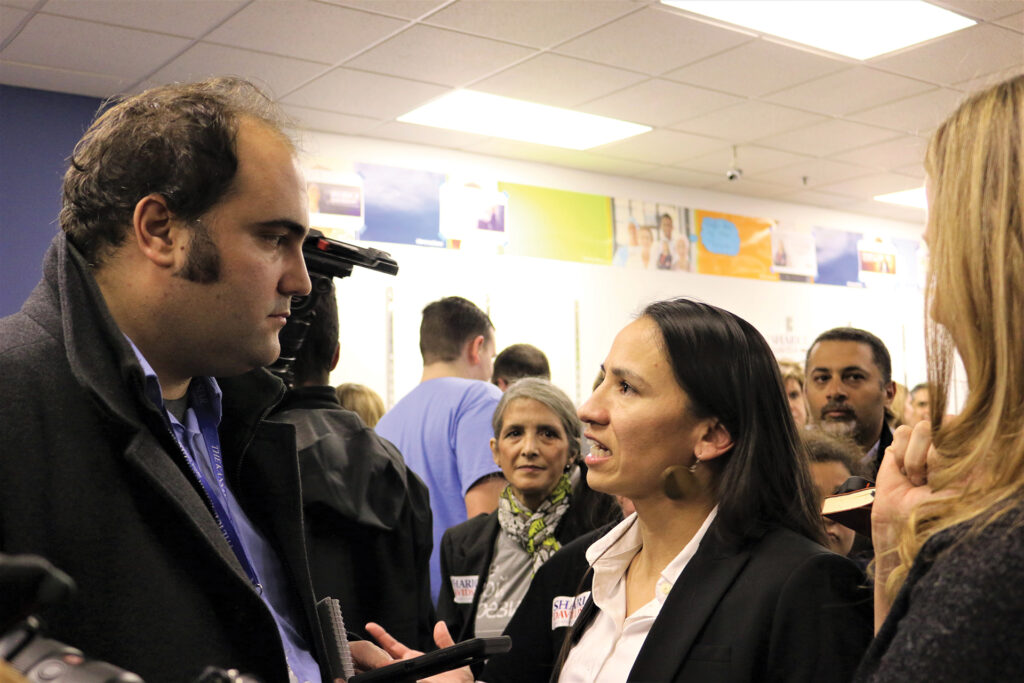
Sharice Davids
As a “Woman We Love 2018,” Sharice Davids was a Democrat running for congress in ruby-red Kansas. She is now the first openly LGBTQ Native American serving in congress, and the first openly gay person elected to congress from Kansas—a feat that warranted her return to these pages. The former MMA fighter, who championed causes like health care, education reform, and equal rights, defeated Republican incumbent Kevin Yoder with over 50 percent of the vote. She’s already started to make good on her campaign promises; she’s supported two bills to help lower the cost of prescription drugs and co-sponsored amendments to the reauthorization of the Violence Against Women Act that would give added protections to Indigenous women. She is also a member of the Congressional LGBT Equality Caucus along with other openly gay Congresswomen like Angie Craig and Katie Hill. “From the beginning this campaign has been built on bringing new leaders to the table and new voices to the table,” she said in her acceptance speech. “The core of this campaign has been about trying to figure out ways to make sure that as many voices and experiences as possible that we have in this community are being heard by our elected representatives.” If her election is any proof, these voices have certainly been heard loud and clear. —RK
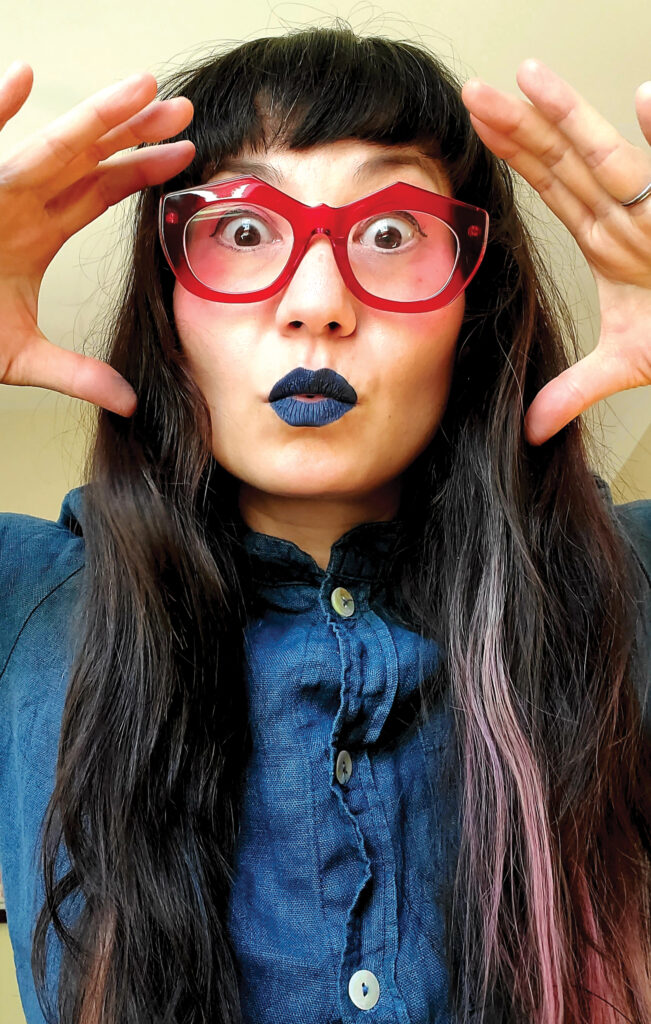
MariNaomi
“I never hid my sexuality, once I figured it out,” MariNaomi, award-winning author and illustrator tells GO. “In fact, I poured it into my comics.” Creator of four graphic memoirs, and the “Life on Earth” young adult graphic novel trilogy, Mari is the founder and administrator of the Cartoonists of Color, Queer Cartoonists, and (soon) Disabled Cartoonists databases. “I’m interested in helping to diversify comics and other literature,” Mari says. “I want to give folks who are just starting out, or haven’t been as lucky as I have, the leg up I never got.” With diversity, inclusion, and representation in mind, Mari is also the cohost of the “Ask Bi Grlz” podcast with author Myriam Gurba. Naomi’s art has been featured in the Asian Art Museum, Smithsonian API culture lab, Cartoon Art Museum, de Young Museum, and Japanese American Museum. She’s even done a two-time tour with the queer literary roadshow, Sister Spit. “I have selfish intentions, too,” Mari admits. “As a reader, I would rather have lots of options in what I read, rather than being stuck with the same old thing again and again. Having more, varied voices in the mix enriches literature and the medium of comics so much.” —JDG
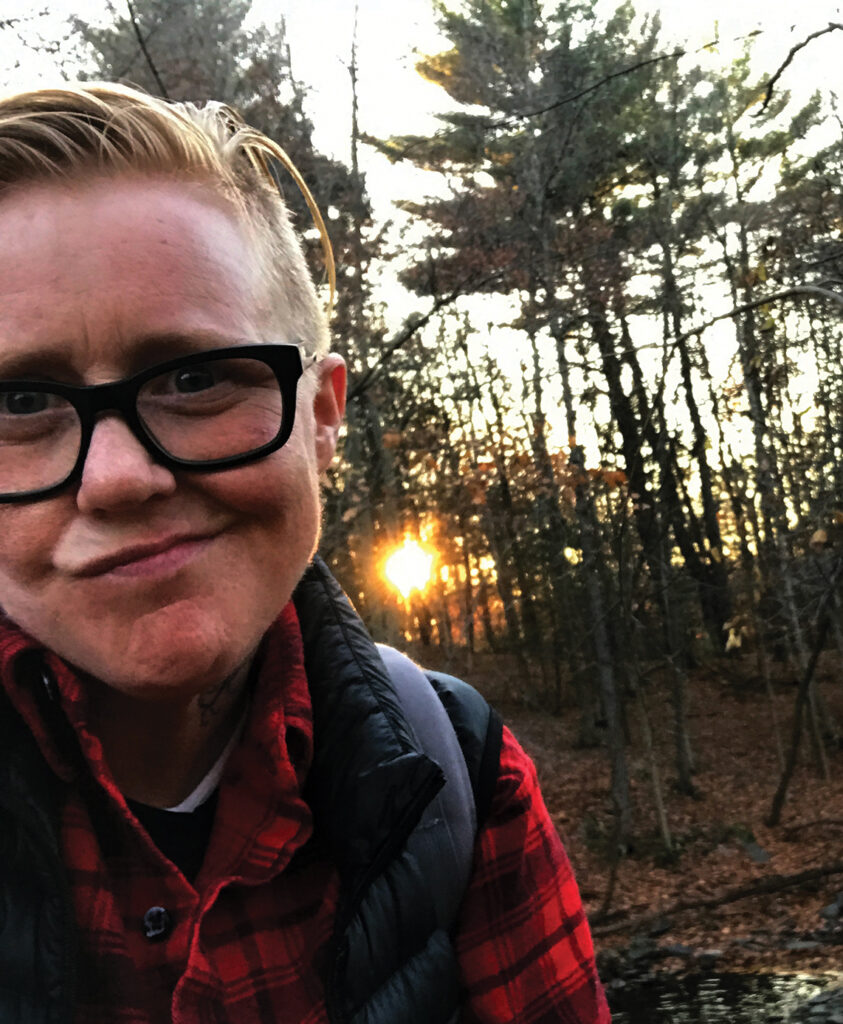
Sini Anderson
While Sini Anderson was making her first feature length film, “The Punk Singer,” a 2013 documentary about riot grrl Kathleen Hanna, the singer was diagnosed with late-stage Lyme disease. Hanna’s illness wasn’t originally meant to play a large role in the film, but, once Hanna opened up about the matter, Anderson switched gears. The film premiered at SXSW, winning Anderson multiple awards for her directing and leading her to her next feature-length film. By 2014, Anderson began work on “So Sick,” a documentary that explores the struggles of other women suffering from late-stage Lyme disease and other so-called mystery illnesses. The six-year project, slated for completion in 2020, chronicles the failure of America’s medical system to recognize, diagnose, treat, or even take seriously the women’s symptoms. The most rewarding aspect of her work, she says, is “being able to break from social norms and write/rewrite our histories in a more truthful light,” which she hopes will “inspire others to speak their truths.” Anderson’s not just an accomplished filmmaker; she’s well-known in the spoken word community as the co-founder of Sister Spit, a performance group with collaborator Michelle Tea. She was also co-producer of the first women’s stage at San Francisco Pride. —RK
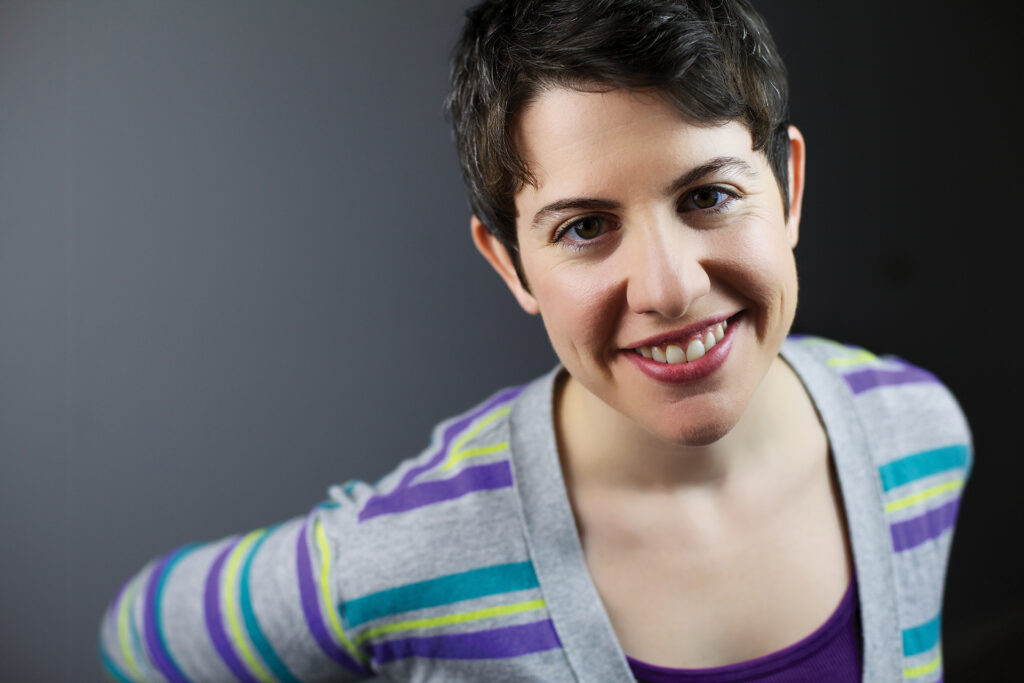
Patricia Villetto
A writer for live action and animation, Patricia Villetto has a pretty cool job. “I get the awesome pleasure of working in kids’ TV,” she tells GO. “Yes, it’s a lot of fart jokes, but it’s also things that might make a difference in a kid’s life: like an openly queer character.” Villetto, who is a graduate of the University of Ulster, Upright Citizens Brigade, and Second City, is currently balancing gigs on two networks. In addition to serving as a writer and segment producer for Nickelodeon’s Camp Nick, she’s at work on three shows for the Cartoon Network (“Ben 10,” “Mega Man,” and the adult swim show, “Tigtone”). Previously, she worked as a head writer for DreamworksTV’s sketch show, “OMG,” and also wrote branded content for their animated shows “Swamp Talk with Shrek and Donkey,” “King Julien’s Stand Up,” and “Puss in Boots.” Her time studying at Ulster in Northern Ireland prepared her not only for acting and writing but also, she says, in “the art of Irish bullshitting,” an ability that undoubtedly proves helpful for writing fart jokes. But more importantly, she is helping to shape the content for the younger generation. “I get to write the things I wish I had seen when I was younger,” she says. “That’s magical.” —RK
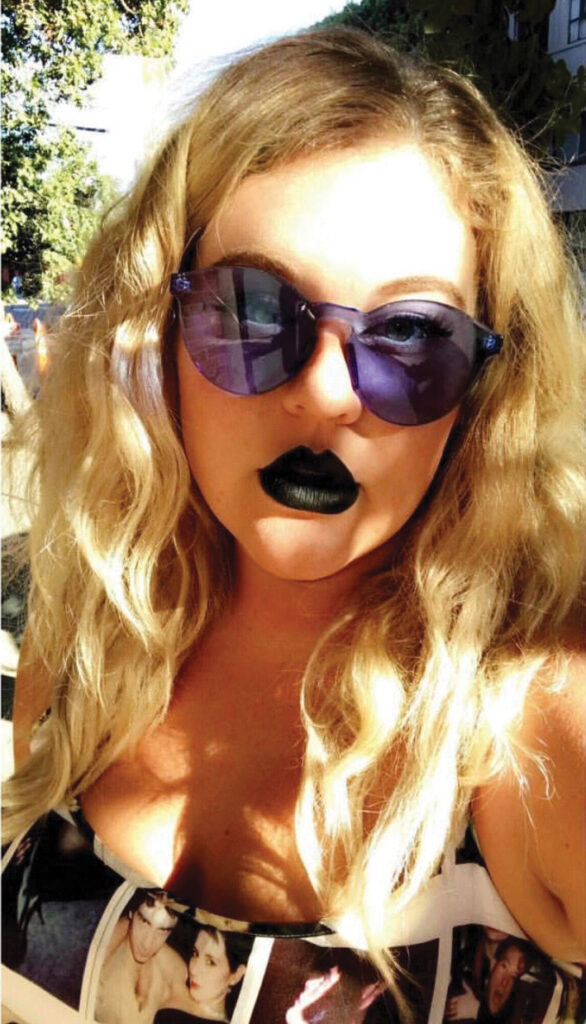
Sara Stone
Sara Stone describes herself as today’s Kevin Bacon. As a super connector in the queer community, there’s always about six glittering degrees of separation from Stone. From corporate sponsors to the celesbian scene in Los Angeles, local parties, and non-profit events, Stone has managed to make meaningful connections in order to continue to create safe spaces for the LGBTQ community. “I didn’t so much choose my current field as much as my zest for life and experiences forged a path for me,” she tells GO. “Whenever I see a cool event, pop-up shop, or unique human being, I seek them out via Insta or in person and strike up a conversation. You never know who can change your life.” Stone likes to refer to herself as a “creative catalyst”—she comes alive when she’s able to work with others to help them feel empowered. After The Dinah this year, where Stone was partnership manager, she told her friends, “The queer community is a space so beautiful, I struggle to describe it. It’s more of a feeling. Like a hug.” Stone likes to say she “threw up on the closet” rather than came out of it. It all began when she met her former partner Natalie. “All these emotions, thoughts, and desires woke up inside me,” she tells GO. “She made me feel electric, so much so before our first date, I threw up on myself in my car. It’s was like throwing up all the opinions and expectations set by the country club environment I was raised in.” She went on the date, and has been “a proud queer ever since.” —DT
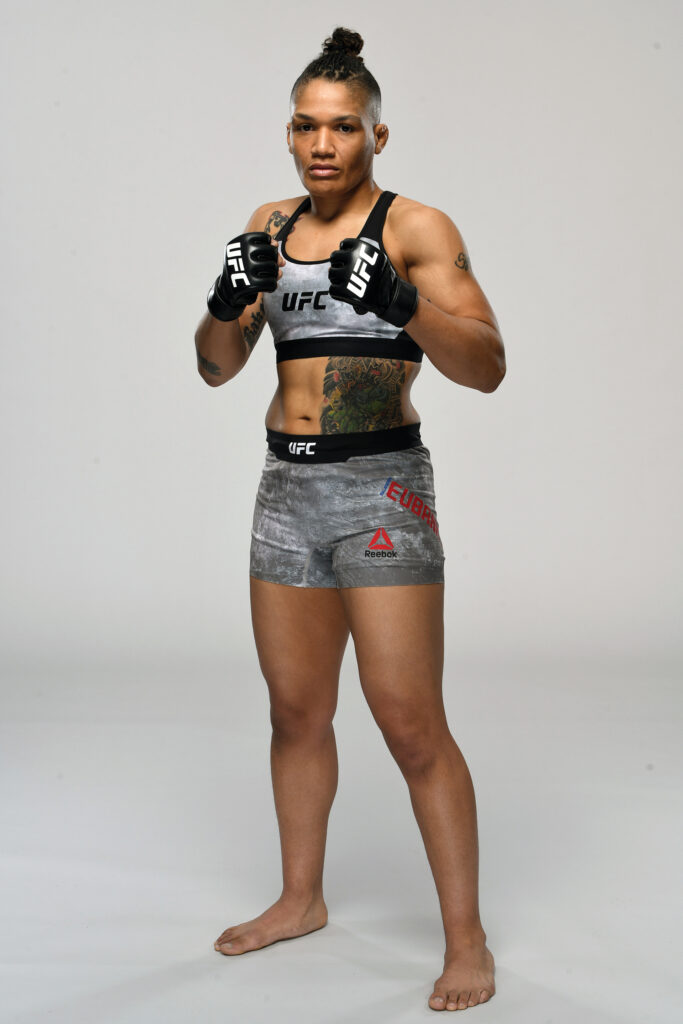
Sijara Eubanks
In charge and occasionally known as “Sarj,” Sijara Eubanks is, as of this June, one of the top 14 official bantamweights (125 to 135 lbs) in the women’s bantamweight division of the Ultimate Fighting Championship (UFC). A black belt in Brazilian Jiu Jitsu, Eubanks is a seven-time International Jiu Jitsu Federation World Champion. Her achievements are all the more remarkable, knowing she found her field by accident. “I wanted to do something fun after work, and ended up falling in love with the art, and turning it into a career,” she says. Eubanks first turned pro in 2014. “Being out hasn’t affected my success in any way. So far, the UFC, my team, my teammates, and everyone has been supportive,” Eubanks tells GO. Personally, however, she “was terrified,” when she came out to her family. But “[it] was actually pretty easy,” she says. “I told my brother first, then my parents. They were very cool with it.” And while Eubanks says she never expected or set out to influence people, she clearly has had that opportunity as a visible LGBTQ woman of color. She leads by example. “Be brave,” she says. “It’s easy to say go out there and just be yourself, but being yourself can be scary and intimidating. So, embrace yourself and live your own life, and remember it takes guts and bravery to do that sometimes.” —JDG
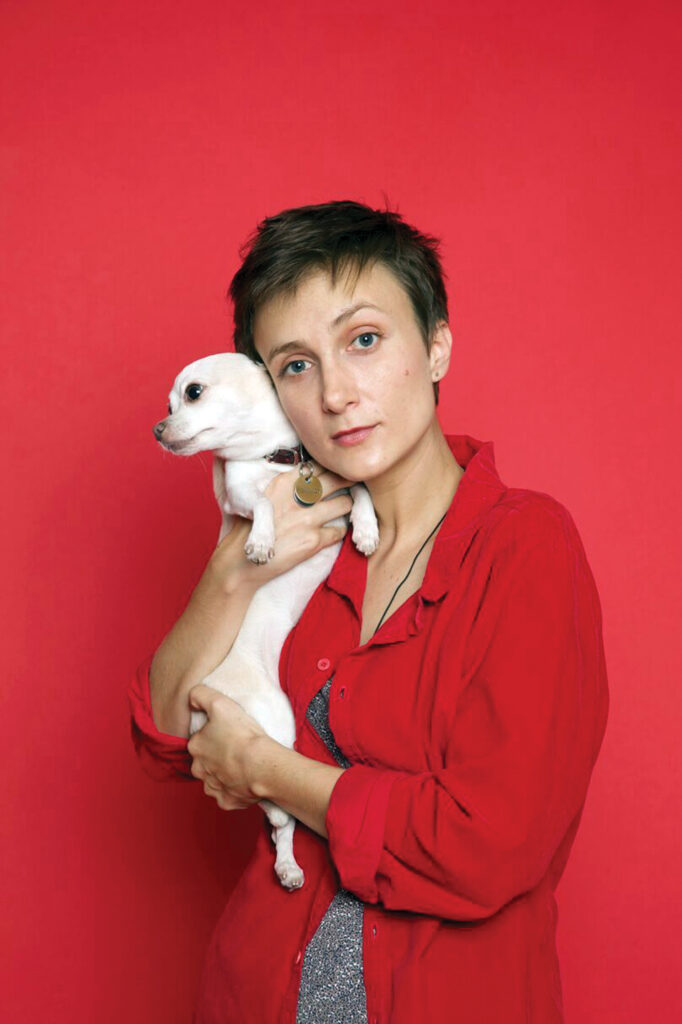
Tay Barrett
Filmmaker Tay Barrett is probably somewhere cuddling a tiny dog right now. The Los Angeles-based creative queer is not only a puppy lover, she’s also the maker of two series. Most recently, LGBTQ network HereTV released six half-hour episodes of her TV sitcom “Work in Progress,” a cheeky comedy that interrogates how people find meaning and purpose through their jobs. It’s based around a circle of queer friends in Los Angeles, and Phil Morris of “Seinfeld” fame (he was “Jackie Chiles”) also plays a minor role. In 2014, she also wrote, directed and acted in a nine-episode web series, “Tiny Nuts,” about two friends trying to get their lives together post-college as they’re beginning to adult. Both the shows are based somewhat on her life—a fictional version of it anyway. “Any success I have with my comedy I attribute to authentic storytelling,” she says. “And since most of the stories I tell are inspired from my life, my queerness is fundamental to my success. I live for queer stories.” When not working on her own stuff, Barrett is in an editing bay, working deep into the night on hours of footage. —AE
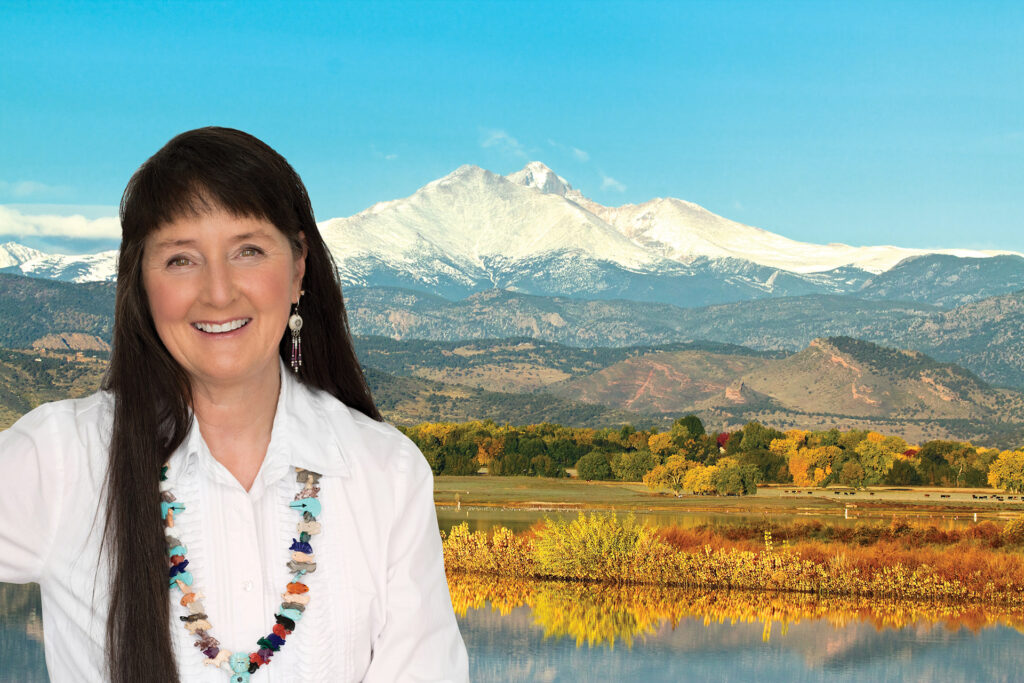
Sonya Jaquez Lewis
Although she was only just elected to the Colorado General Assembly this past November, Representative Sonya Jaquez Lewis is already making waves. She’s drafted (and passed) two legislative measures for lowering prescription drug prices, and she is the vice-chair of the House Committee on State Affairs in addition to being a member of the Health and Insurance Committee. Not bad for a first-term representative with only a few months in office. She is also the first openly LGBTQ and the first Latina woman elected to the Assembly from Colorado’s Boulder County. Her background places her in a unique position to understand and recognize the needs of the diverse communities she represents. As a licensed pharmacist and former pharmacy director of Colorado’s Medicaid program, she increased access to prescription medications and reproductive services and helped design a mental health outreach program for low income communities. She was also the president of the LGBTQ sports organization Team Colorado, and, in her pre-Colorado life, served on the Board of Directors of North Carolina’s Pride Festival (her home state). The latter, in particular, has helped shape the philosophy she has for the LGBTQ community. “As someone who marched in the very first Pride marches in North Carolina and South Carolina, when there were more of them than us, I learned that when we are out and proud, we make a difference. And when they have shotguns, we sing a little louder and march a little faster.” —RK
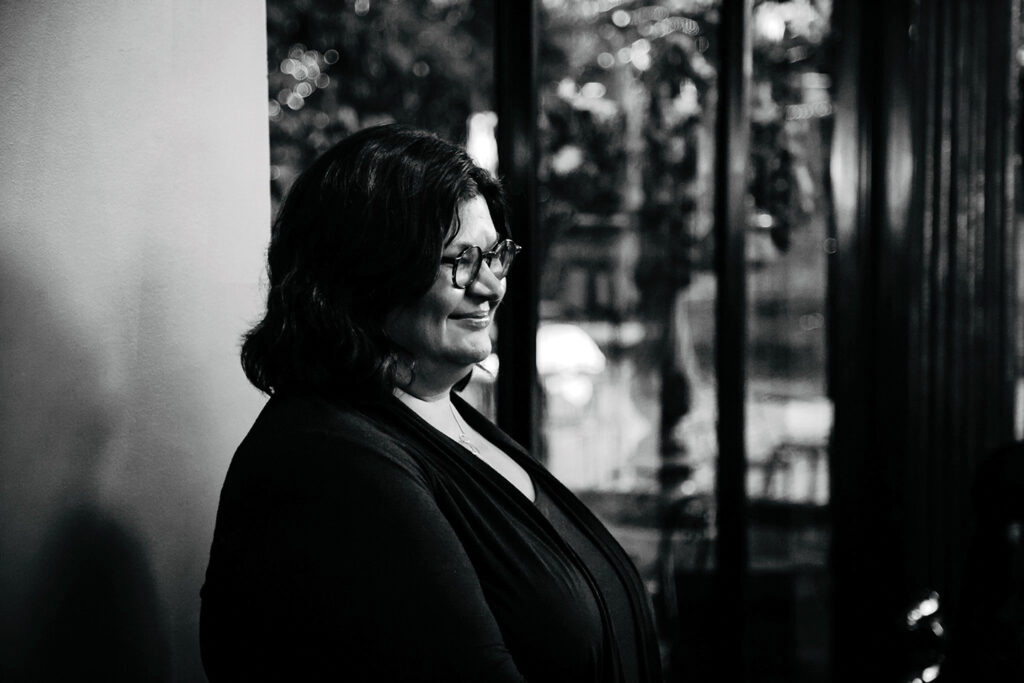
Surina Khan
As a lesbian and the daughter of Pakistani-Muslim immigrants, Surina Khan understands the intricate link between personal identity and social progress. “Bringing my full self to work every day,” she tells GO, “allows me to understand the complexities of different people’s experiences so that we can collectively work together.” She is currently the CEO of the Women’s Foundation of California, a philanthropic group that offers financial support and training to community-based organizations that build the power of cisgender and transgender women and girls. The foundation’s brand of philanthropy and activism matches well with Khan’s ethos. She has over 20 years of experience in social justice philanthropy, working with such nonprofits as Outright Action International and the Ford Foundation. She serves on the boards of numerous charities that promote social, economic, and reproductive justice for women and LGBTQ individuals. The most rewarding aspect of her work? The people she advocates for. “Being able to support community-based leaders working to advance gender, racial, and economic justice is an enormous privilege for which I am grateful every day.” —RK
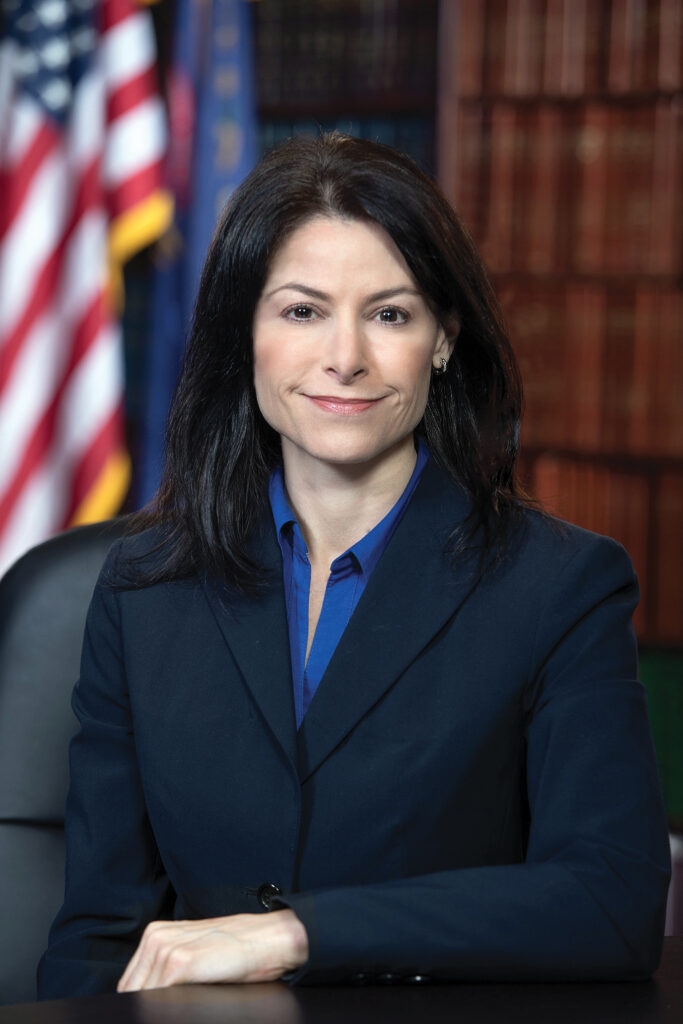
Dana Nessel
Before she became Michigan’s first openly-LGBTQ person elected to statewide office last November, Attorney General Dana Nessel had established herself as a progressive litigator of LGBTQ rights. Her work led the way for non-biological same-sex parents to have custodial rights and adoption privileges of children from the marriage. In 2012, she was co-counselor in DeBoer v. Snyder, a case that challenged bans on both adoptions and marriage for same-sex couples within the state, and that ould later be merged with similar cases into the landmark Obergefell v. Hodges. Then, in 2016, she founded the Fair Michigan Justice Project, an effort to prosecute hate crimes committed against LGBTQ individuals. Her election this past November was a highlight for anyone invested in saving the hard-fought gains that the LGBTQ community has made in the past decade, a fact that wasn’t lost on Nessel, who recognizes the critical role that attorneys general play in preserving the rights of the citizens they serve. “Even though sometimes it may seem as if your federal government or your state officials are not concerned with your welfare,” she says, “there are people all around this nation who are fighting back. There are attorneys general, like myself, spread throughout the nation who are determined to ensure equal justice for LGBT Americans and for all people in our country.” —RK
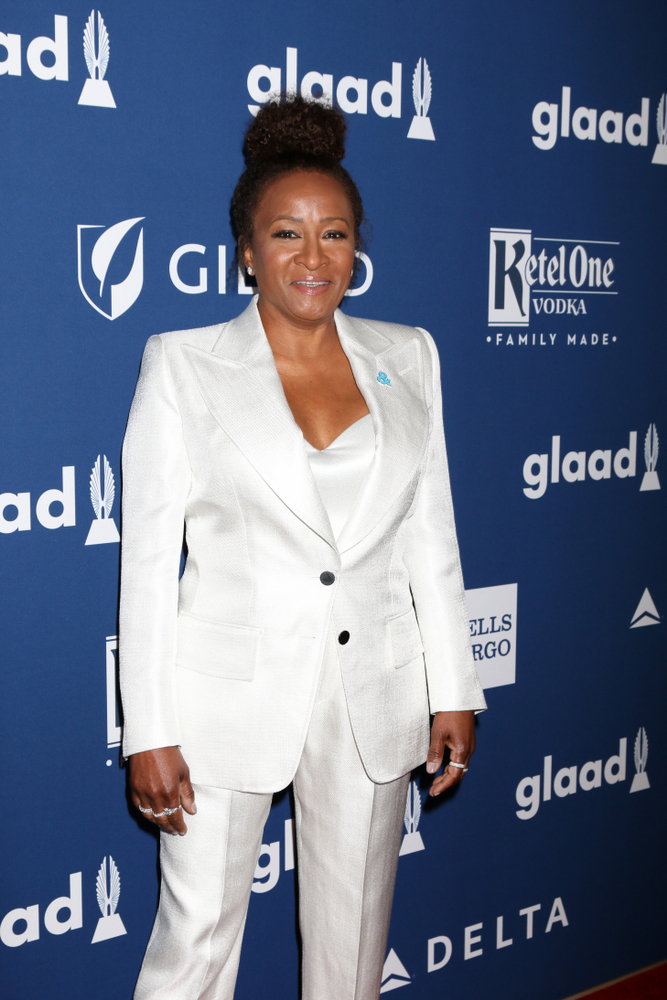
Wanda Sykes
Wanda Sykes was on the “100 Women” list back in 2009. And in 2012. And then again in 2015. That’s because Sykes will always be a woman we love. This year is again shaping up to be a standout for the comedian. Her new comedy special, “Wanda Sykes: Not Normal” is now streaming on Netflix. She starred as Louise Jefferson on ABC’s live version of “All in the Family” and “The Jeffersons,” and reprised her Emmy-nominated role of Daphne Lido on the hit comedy, “Black-ish.” And another Netflix series, “Tiffany Haddish Presents: They Ready,” which will be hosted by Haddish and feature women, people of color, and LGBTQ comedians, is in the works at Sykes’s Push It Productions. Sykes has always been a voice for progress both on and off stage, whether it be speaking out for marriage rights or walking away from the hit reboot of “Roseanne” after the star’s controversial tweets caused an uproar. She’s also used her stand-up to call out the current White House occupant, and she continues to do so in “Not Normal.” “For me to go out and not do anything political,” she recently said in an interview with Variety, “it would be ignoring the orange elephant in the room. People expect me to say something. I’m a black woman and a lesbian. There’s a lot of s— that’s wrong in my world right now. So, for me to just go out and talk about my family and act like everything’s fine, it’s like what planet am I living on?” —RK
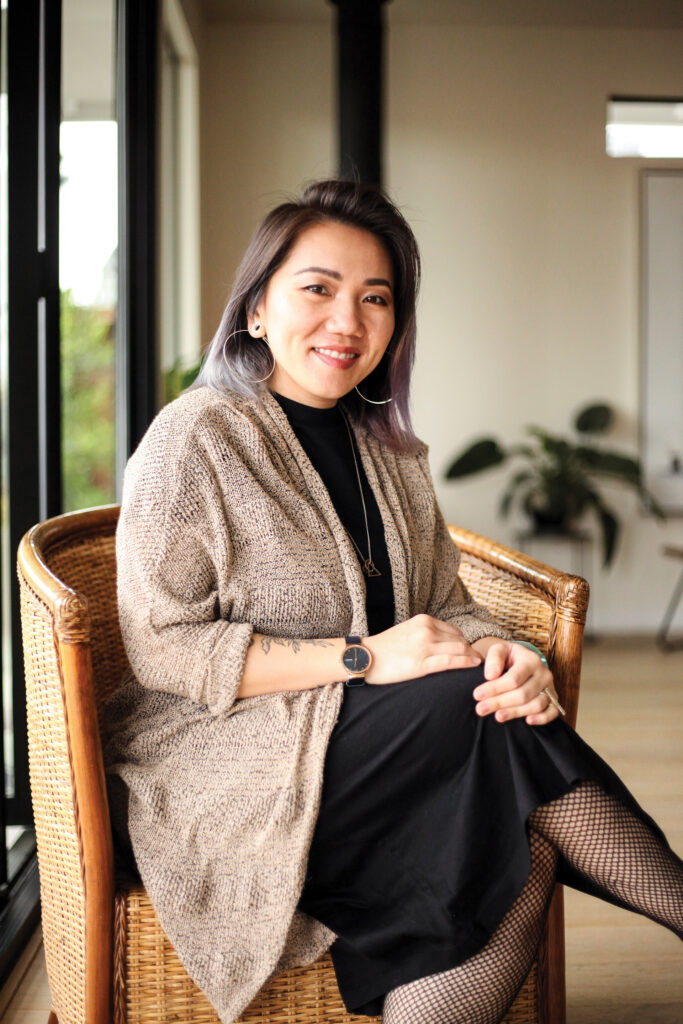
Oskar Ly
In the Hmong language, Oskar Ly explains, “there is no word for ‘art’ and there is no word for ‘queer.’” Yet, Ly has successfully willed these identities into undeniable existence. The fashion/art designer, cultural producer, and community organizer, whose family are Hmong refugees from Laos, was born in France and immigrated to Minnesota. At 12, Ly learned to sew from her seamstress mother, and this was the tool she used to discover her own artistic voice. After finishing college (a wish of her parents), Ly launched her label of original designs, Os.Couture, which championed both contemporary Hmong fashion art and Asian American Pacific Islander (AAPI) LGBTQ visibility by proudly casting queer and trans AAPI models, as well as drag performers. This niche aesthetic created a space for Ly to build and mobilize an entire community during the fight for marriage equality. “How could one advocate for marriage in the mainstream U.S. when our very own existence had been long denied in our own Asian cultures?” Ly asked. “So, I produced a fashion show highlighting cultural wedding wear and queer couples to spark conversations and gain community votes.” This fall, Ly is set to showcase her first solo exhibition highlighting works that span her artistic career at various locations across the Midwest. You’ve got to “fiercely flaunt loving yourself and your ways,” Ly advises. “Our future depends on it… We’re not a trend. We’re complex and this is just the beginning. We’re here to stay.” —JDG
Growing up in the San Francisco Bay area and coming out in a city with such a vibrant queer community greatly influenced Clare Worsley’s interest in telling queer stories through images. The photographer moved to New York seven years ago, and becoming part of the queer community there amplified her drive to make art by, for, and about queer people. “I have met so many incredible and special people from my community through my work as a photographer,” Worsley tells GO. “The best feeling is when the person I’m shooting reaches a point of mutual trust with me and tells me they feel confident and seen,” she says. Another part of photography that speaks to her is the understanding that comes from seeing someone through her lens, especially in regards to queer people. “When I shoot events, they are usually queer events,” Worsley says. “Having the opportunity to document the beauty of queer folks coming together to share space and have the freedom to unapologetically be their authentic selves while having fun is the purest feeling of joy.” Worsley is especially drawn to the ability of the queer people to choose their own families. “I think that encouraging the idea that family does not have to be defined by blood and emphasizing the importance of community is imperative and can save so many of us from feeling abandoned,” she says. “To remember that you are not alone and that family can absolutely be chosen is so important for survival.” —DT
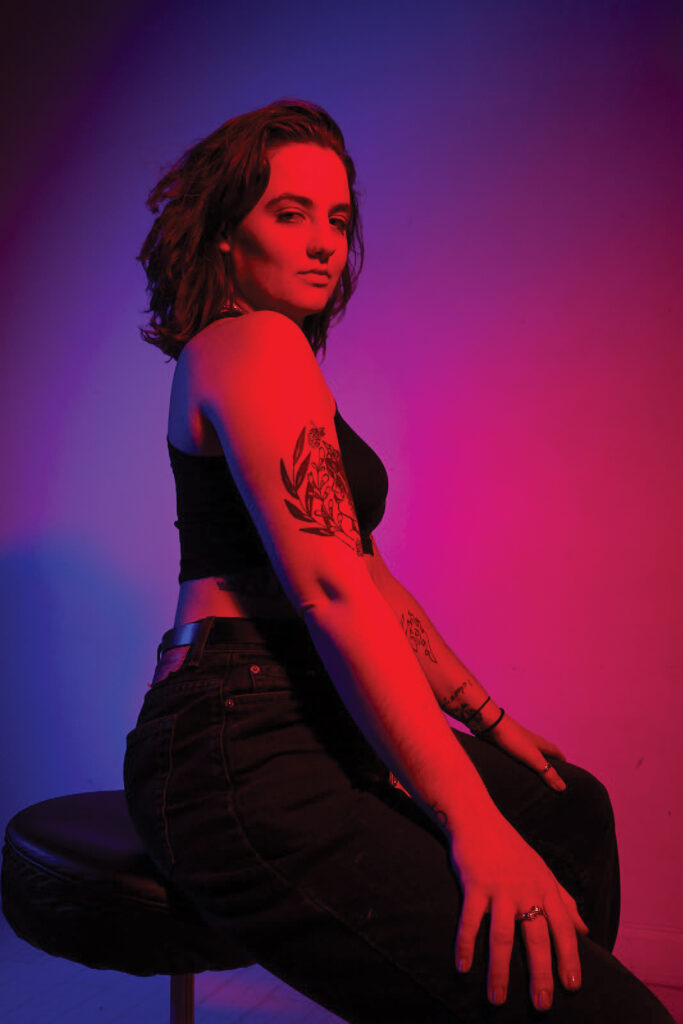
Clare Worsley
Growing up in the San Francisco Bay area and coming out in a city with such a vibrant queer community greatly influenced Clare Worsley’s interest in telling queer stories through images. The photographer moved to New York seven years ago, and becoming part of the queer community there amplified her drive to make art by, for, and about queer people. “I have met so many incredible and special people from my community through my work as a photographer,” Worsley tells GO. “The best feeling is when the person I’m shooting reaches a point of mutual trust with me and tells me they feel confident and seen,” she says. Another part of photography that speaks to her is the understanding that comes from seeing someone through her lens, especially in regards to queer people. “When I shoot events, they are usually queer events,” Worsley says. “Having the opportunity to document the beauty of queer folks coming together to share space and have the freedom to unapologetically be their authentic selves while having fun is the purest feeling of joy.” Worsley is especially drawn to the ability of the queer people to choose their own families. “I think that encouraging the idea that family does not have to be defined by blood and emphasizing the importance of community is imperative and can save so many of us from feeling abandoned,” she says. “To remember that you are not alone and that family can absolutely be chosen is so important for survival.” —DT
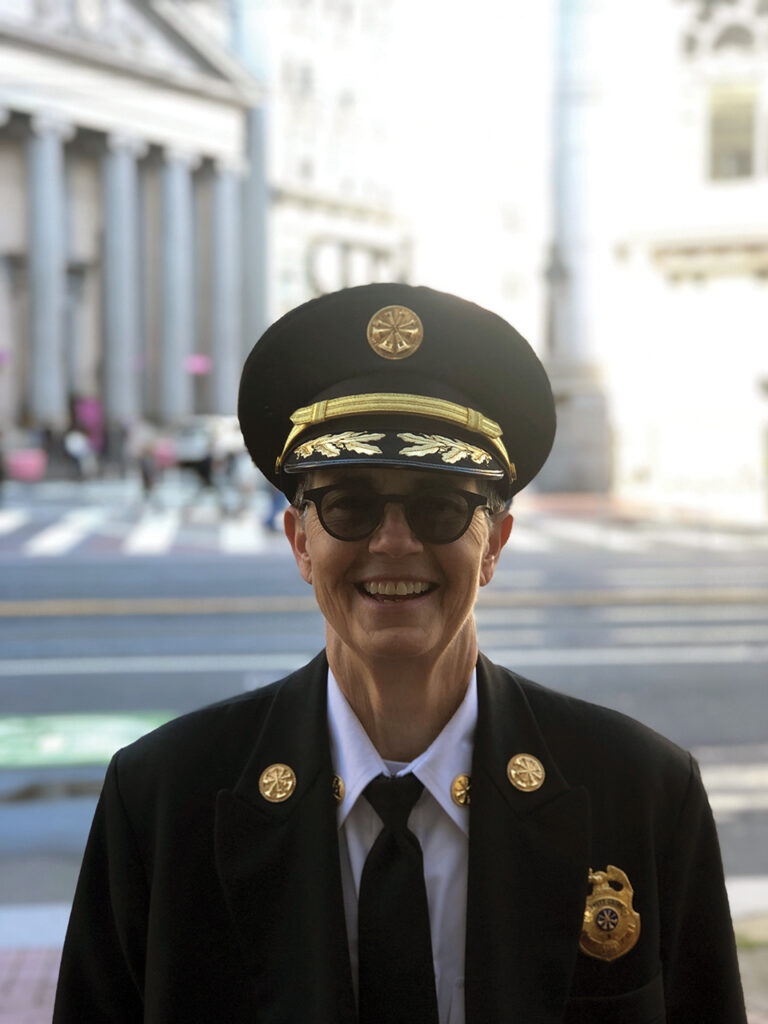
Jeanine Nicholson
Having studied anthropology at Colgate University, being a firefighter wasn’t a career Jeanine Nicholson initially imagined. But in May of this year, Nicholson became the first openly gay person and second woman to serve as fire chief of San Francisco. “I did not get into it until I was 29,” she says, “because I did not have the role models of women in the Fire and EMS services until I was an adult. It turned out to be a perfect fit for me.” Since joining the department as a firefighter EMT in 1994, Nicholson worked her way through the ranks on ambulances and fire engines through all neighborhoods of the city she calls home. “San Francisco is a very welcoming place and I am so lucky that I live here,” she says, noting that being out in this open city has not adversely affected her career opportunities. San Francisco is pretty lucky to have her, too. In addition to promoting firefighter safety and disaster preparedness, she is active in community outreach with programs like Camp Blaze, which teaches girls firefighting and leadership skills. The most rewarding aspect of her work, she says, is “making a difference in someone’s life on what might be the worst day of it. And I just plain love being of service.” —RK
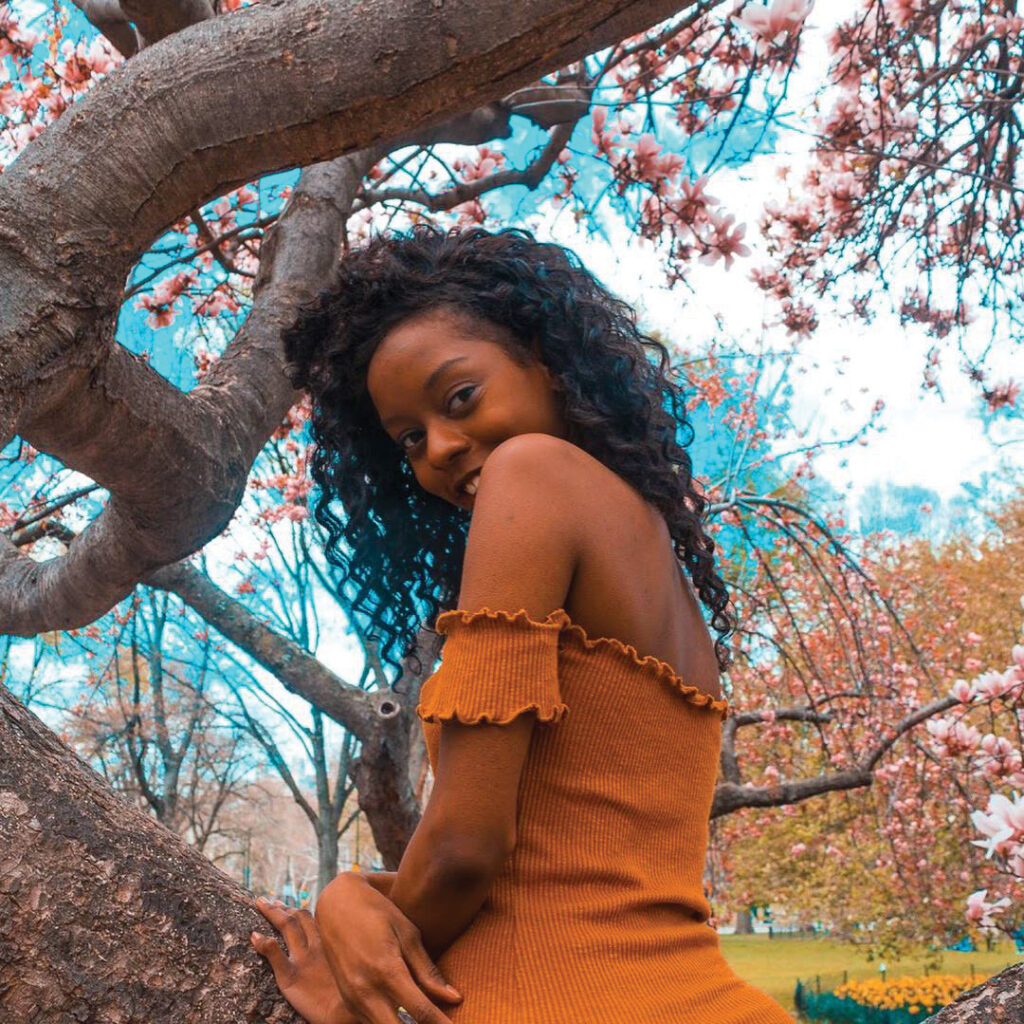
Gabrielle Noel
Gabrielle Noel has made it her mission to make people “be more aware of the B’s and the T’s in this umbrella community,” she says. The bisexual writer, speaker, and digital creative is the founder of the recently launched clothing brand Bi Girls Club, which was made with bisexual, queer, and pansexual women/femmes in mind. Ten percent of sales every month go to Bi Net USA to offset the fact that, largely due to the invisibility of bisexual folks and monosexism, bisexual people receive the least funding/resources in the LGBTQ community. “Obviously the bigotry we are united in experiencing comes from heterosexual people,” Noel says, “but there are other social systems—like transmisogyny and monosexism—that members of the LGBTQ+ community participate in. When we ignore or deny their impacts, or even when we ignore our role in them, we harm the people we claim to be bonded with,” she says. “It’s also important to center Black and Brown folks in queer activism because we are so often sidelined. We talk about how Stonewall was a riot, but it was a response to police violence against black trans women and drag queens. That should be at the forefront of our understanding of Pride.” You can find Noel’s writing on sex/sexuality, dating, cannabis, and identity in Swipe Life, Playboy, the Independent, Slate, the Huffington Post, Elle, and other platforms. —DT
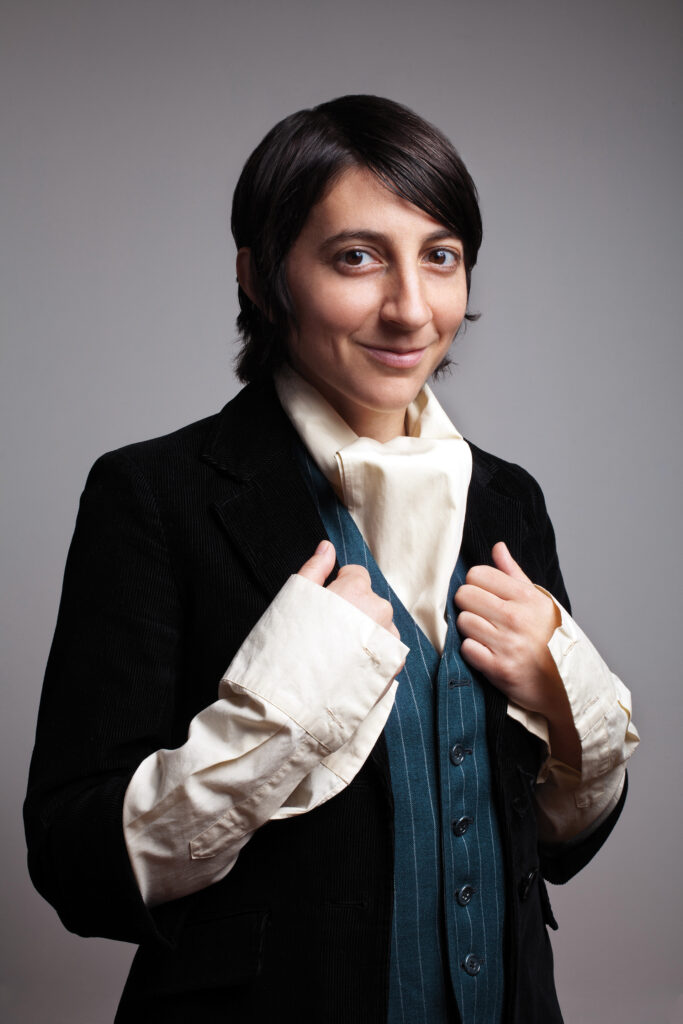
Sacha Yanow
New York City-based performance artist and actor Sacha Yanow started acting as “a way to escape the melancholy and isolation” she felt growing up in a small town. Little did she know that, as a grown-up creative person, she’d be creating solo shows about princes, vampires, dads, and Yiddish bird grandmothers. Yanow shifted from acting to performance art because she wanted to “tell stories that I wasn’t seeing—ones that celebrate our weirdness and queerness both in form and content, [and] roles that expressed gender more expansively,” she says. Her performance projects oftentimes use personal and familial experience as a jumping-off point for discussing social and political questions. Her show “Cherie Dre,” which she performed at Danspace Project, reveals an intimate history of the Jewish Borscht Belt through the complicated romance between her grandmother and an enigmatic showgirl. Similarly, in “Dad Band,” another intimate and psychological portrait, she covers and lip syncs to her dad’s favorite songs from the 1950s and ‘60s, and shares footage of his 1970s winning appearance of a popular game show. Her father becomes more than just a guy who happened to create her existence—he is a symbol of the patriarchy and her own “internalized dad.” She’s also an integral contributor to the live lesbian soap opera “Room for Cream,” which was recently commissioned by the New Museum. —AE
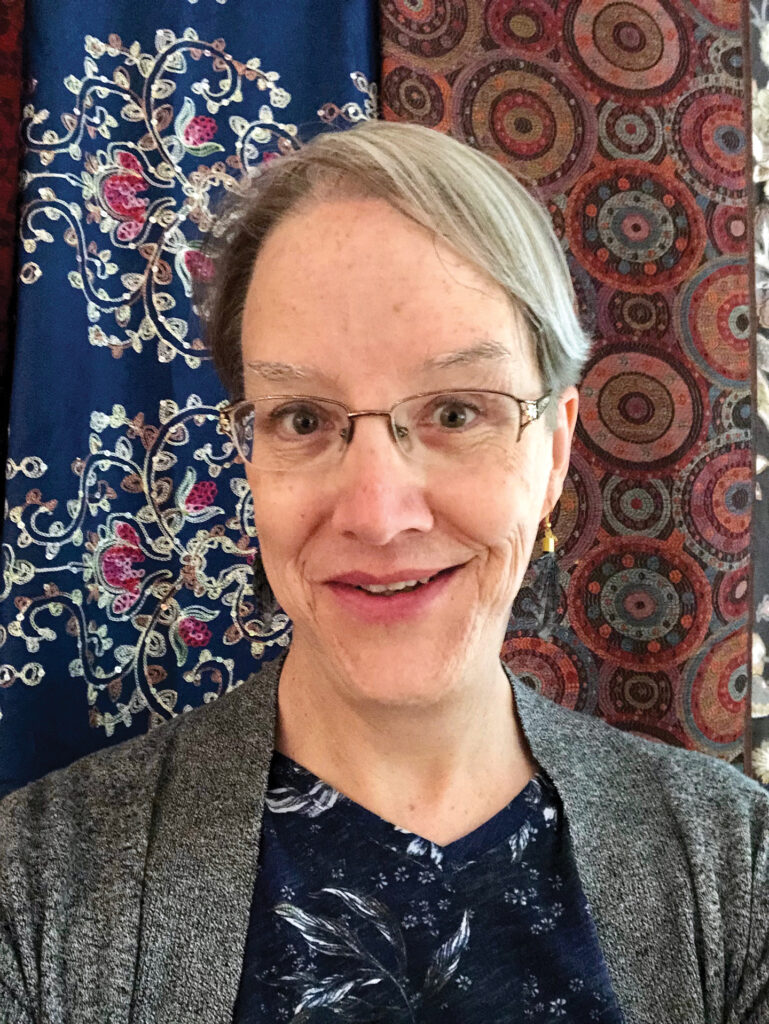
Lisa Bunker
In 2018, Lisa Bunker made history by becoming one of two transgender women elected to the New Hampshire State House of Representatives, but she’s pretty modest about this success. Instead, she’s more excited to talk about her writing. Her most recent book, “Zenobia July,” chronicles the story of a transgender girl living as a girl for the first time—a story that Bunker hopes gives gender-variant kids a representation of themselves in a wider cultural lens. “When I was a young unexpressed trans girl, I couldn’t find myself in any of the stories I read,” she says. “There were no trans characters. I’m proud of having a hand in changing that for the generation growing up now.” She hopes to represent the same diverse perspectives in the legislation she sponsors in the New Hampshire State House, challenging how we define terms like “normal” to create a society built on justice, acceptance, and compassion. “Being out and transitioning has allowed me to live my best life,” she says. Now she wants the chance to help others do the same. —RK
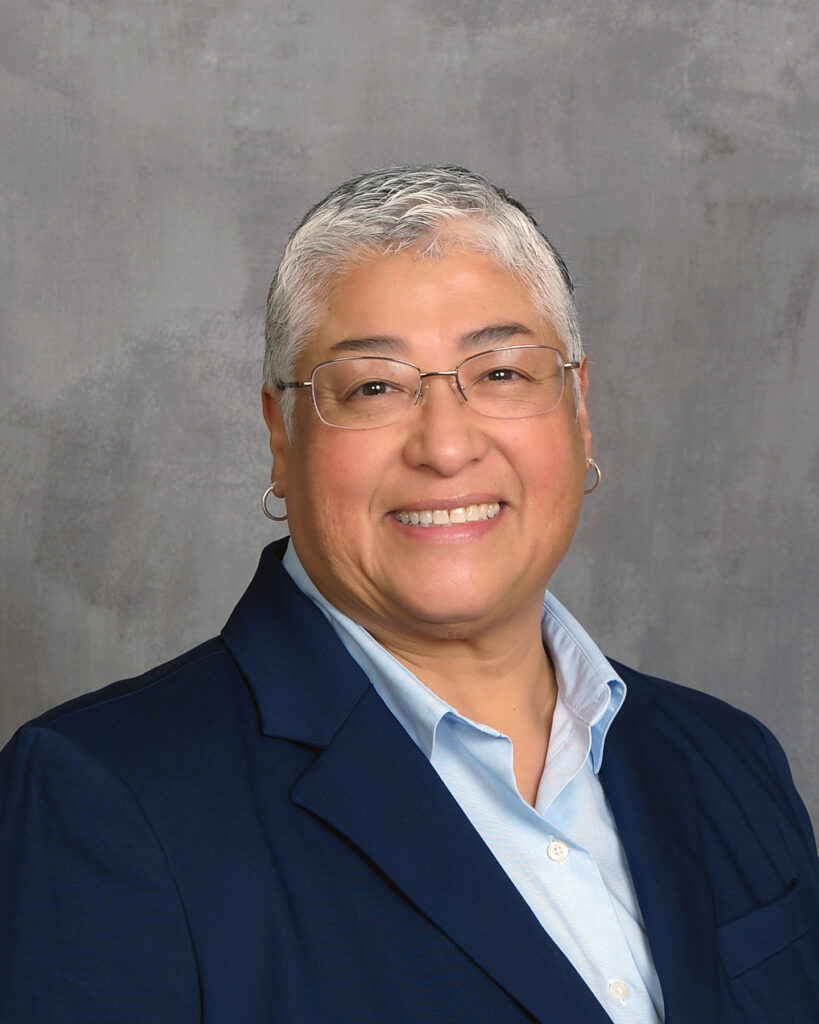
Susan Ruiz
Susan Ruiz understands the gravitas that comes with being an elected official. “I often get the microphone to address multiple social issues that most citizens never get to publicly address.” Her desire to advocate for others first led her into social work, while her interest in politics came from her father, a Mexican immigrant. “My dad took his citizenship very seriously and never missed the opportunity to vote,” she says. “Voting was an expectation and dad would tell me that if I didn’t like how things were going, I could change them by organizing and voting.” She took his advice one step further after the 2016 presidential election when she decided to run for office herself. She had gotten tired of complaining and decided it was time to take action. It’s not an easy task for anyone, but in November of 2018, Ruiz accomplished the seemingly impossible: she became the first openly lesbian woman voted into the Kansas State House. “I think by being out,” she says, “by being Latina, by addressing social issues, people see themselves in me. It’s as people have said, ‘Representation matters.’” Among her first acts in office was to co-introduce an amendment to the Kansas Non-Discrimination Act that would have given protection to individuals based on gender identity and sexual orientation. Unfortunately, Republicans in the House stalled the measure. But Ruiz isn’t one to lose hope. “Do you really want to piss off the opposition?” she once asked a crowd of young people at the Statehouse on Equality Day. “Don’t let their hateful words define you. You do you!” —RK
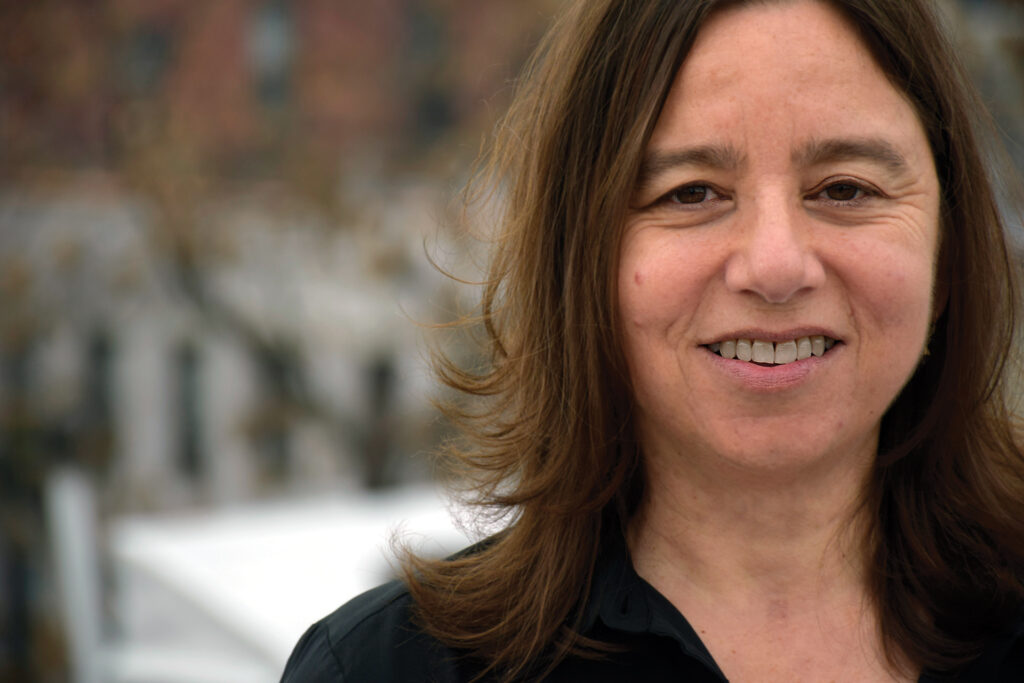
Sarah Schulman
Novelist, non-fiction writer, playwright, screenwriter, journalist, AIDS historian—and, likely one of the most important intellects of our time and community—Sarah Schulman is currently at work on her 20th book, slated for 2021: “Let the Record Show: ACT UP and the Enduring Relationship of AIDS.” She’s also collaborating with the legendary Marianne Faithfull on a theatre piece, “The Snow Queen,” which premieres at the Manchester Factory in 2022. Serving on the advisory board of Jewish Voice for Peace, the Racial Imaginary, and a faculty advisor for Students for Justice in Palestine, Schulman has been a tireless worker for all human rights, a true artist-as-activist. And she recognizes she isn’t alone in the fight. “Today, most radical movements have queer and trans people in their leadership and rank and file. Black Lives Matter, Palestine Solidarity, Abortion Rights, these are queer friendly movements with lots of out people.” Schulman sees allyship with the members of these movements almost as an obligation. “What we do as LGBT people needs to recognize and stand with Dreamers, with Refugees, with people fighting police violence, with women seeking abortion,” she says. “Assimilating into the white power structure is not the road towards the common good.” True creative that she is, with a few plays and films in the works, Schulman’s personal dream is to work more in stage, film, and television. “I think a number of my books are ripe for film adaptations and TV series, now that some of the restrictions on lesbian representation are softening. And I want to work on a number of new ideas.” —JDG
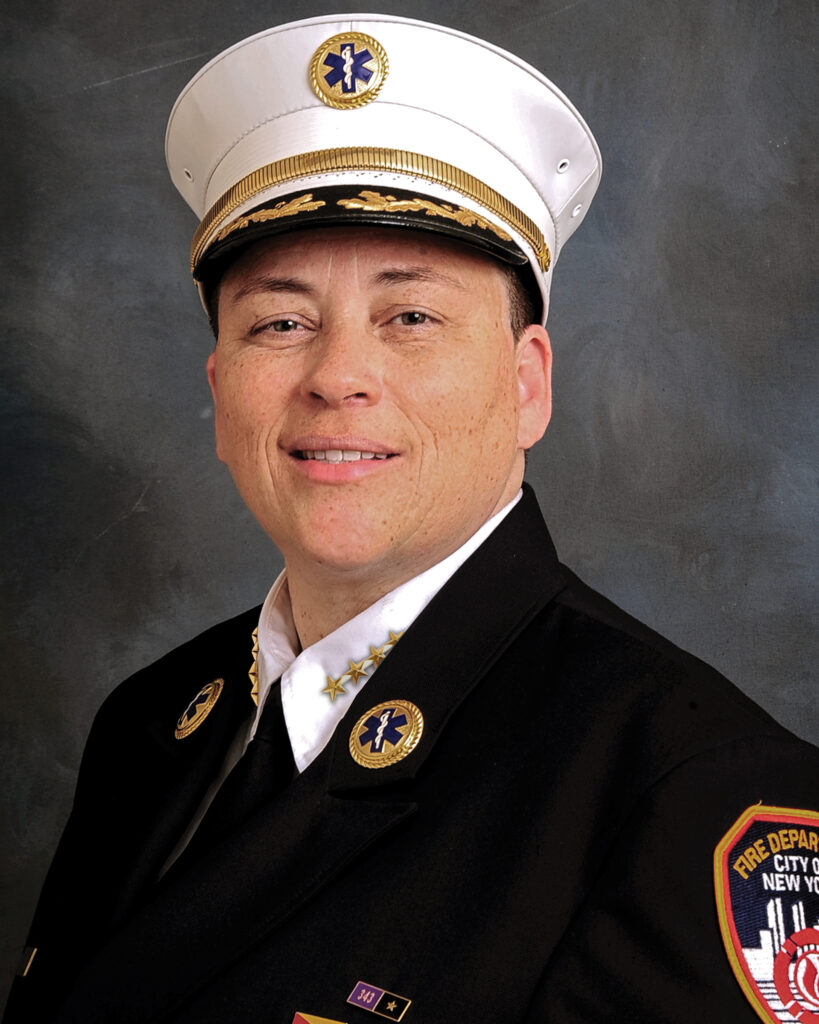
Lillian Bonsignore
“Someday we will not have to talk about being a woman or being gay when getting a big promotion,” says Lillian Bonsignore, who in May became the first woman to be appointed Chief of Emergency Medical Services for the Fire Department of New York. “But today is not that day. We are not there yet.” We are getting closer to that day, though, thanks to the efforts of women like Bonsignore. As a 28-year veteran with EMS, she worked her way through the ranks from EMT to lieutenant, paramedic, captain, and station commander. In 2013, she was a deputy chief in the EMS Academy. In 2016, she was promoted to the chief of EMS Academy at Fort Totten—the same base she’d responded from as part of an EMS convoy following the 9/11 terror attacks. Since coming out at age 30, when she was already married and a mother of two, Bonsignore has had to deal with some hassle. “There were moments in my career when I had to face off with a couple of men that didn’t appreciate my lifestyle or the fact that I was a woman in a male-driven occupation,” she says. “I continued to stand my ground and refused to take ownership of someone else’s feelings. It was simply not my problem to worry about.” Instead, she lives her life and career without apology for who she is and recognizes that, in doing so, she is paving the way for others to do the same. “It is a great honor and privilege to be somebody else’s possibility,” she says. “Be who you are, love who you are, and live your truth.” —RK
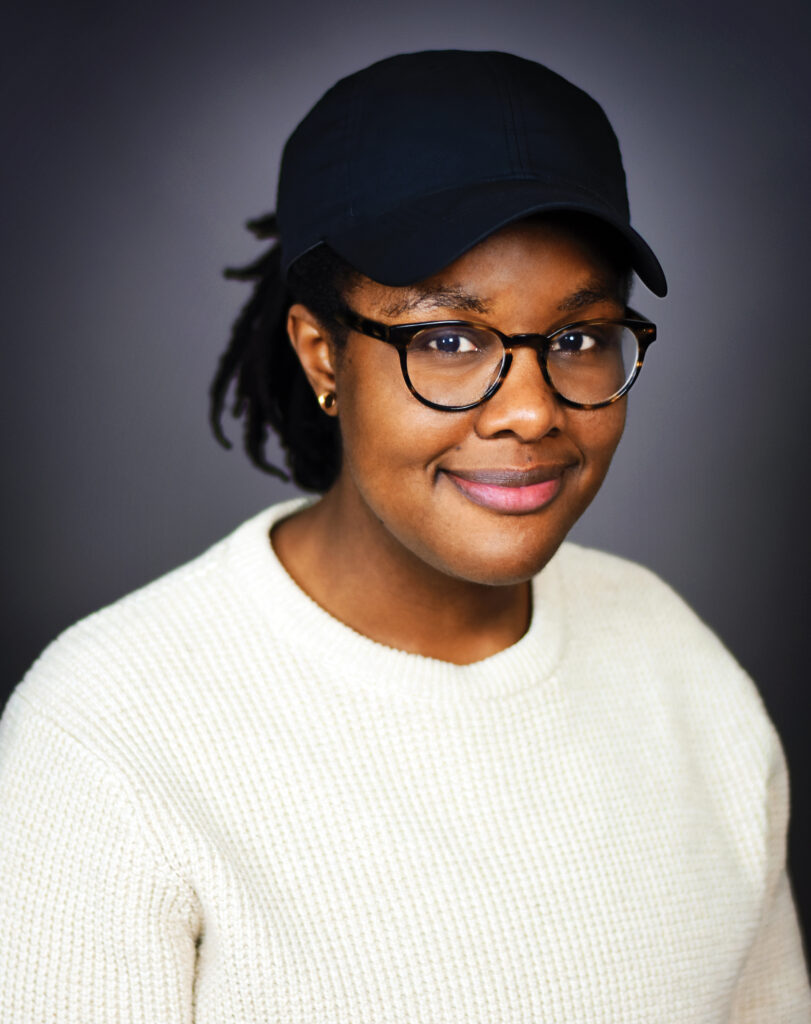
Morgen Bromell
In creating digital platforms for the 21st century, Morgen Bromell recognizes how technology is inseparable from activism and power. While Bromell is perhaps best known as the founder of Thurst, a dating app for LGBTQIA persons, the entrepreneurial New Yorker is also interested in the ways queer communities have used online media and digital platforms as modes of community-building and organization. Unlike other dating apps, Thurst is specifically designed as a safe space for queer, cis, and trans people of color, and is part of Bromell’s overall aim to make technological platforms more accessible to people of color. “I truly believe,” Bromell says, “that in order to preserve our hard-fought rights as queer people, we must first honor and acknowledge the marginalized folks, mostly black and brown poor trans people, who resisted state violence and prioritized trans safety and freedom above all else during times when queer pride was inconceivable.” Bringing those who are marginalized access to technology that they don’t currently have is a large part of Bromell’s vision as both a technologist and an activist. And, like many technologists, Bromell sees the potential for radical change in the digital platforms harnessed for social progress. “The first Pride was a riot, and in the next generation, I believe LGBTQIA+ pride is going to be a revolution.” —RK
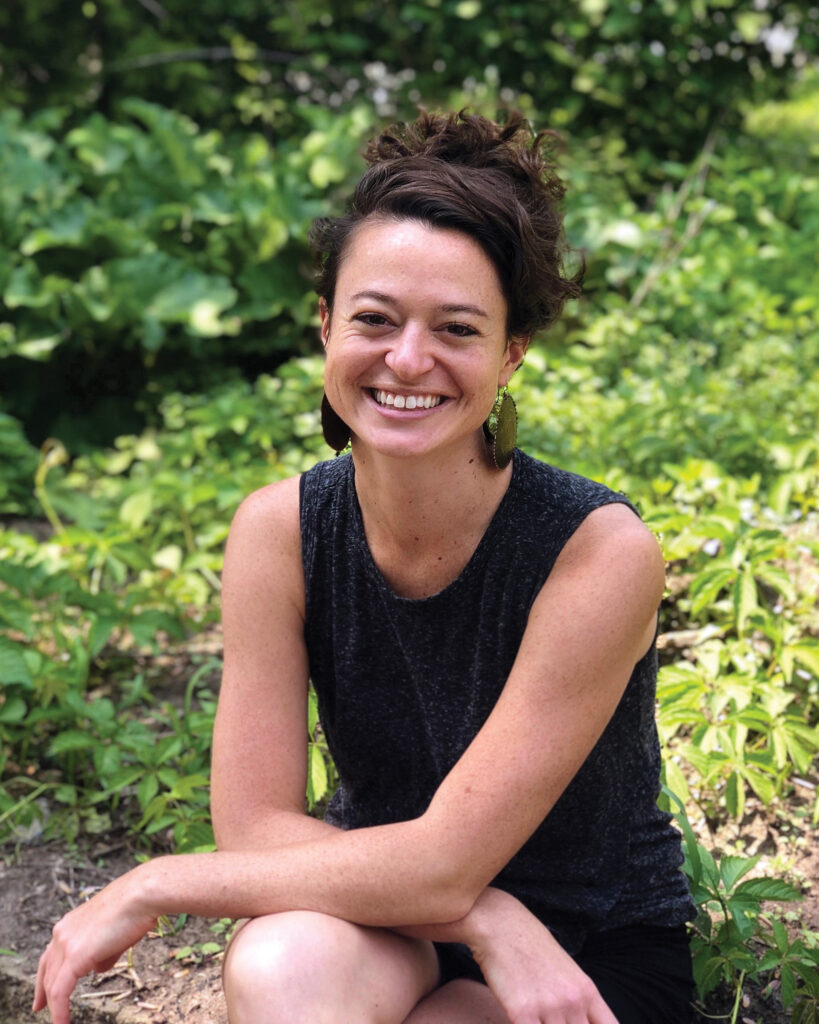
Nell Pierce
For the past decade, Nell Pierce has used the creative process as a “container for vulnerability and truth telling,” where art is a means of amplifying story. A freelancer and teaching artist, Pierce has collaborated with people of all ages through various organizations, analyzing power in dominant narratives and creating personal and collective narratives through visual art, writing, and theater. Pierce is part of two different Minneapolis-based art collectives, Poligraphix and Studio Thalo, that have painted over 20 live murals at events that center justice and healing. She recently received a grant from the Minnesota State Arts Board to create a body of work called Q’llage, a series of collages drawing connections between the resilience of queer communities and the resilience of plants. “I’m drawing from my own experience and 40 interviews with local LGBTQ2IA+ folks about their ‘coming in’ stories, how they are continuously coming into their truths around gender, sexuality, family, and love,” Pierce explains. “I revere the ways queer people, particularly BIPOC folks, have learned to take care of each other and listen to their truths in the midst of systemic violence—expanding what family means, opening up who and how many we love, and exploding the gender binary into a million possibilities. I want to shed light on these ecosystems and growth processes, and I want to call viewers in to changing the social conditions in which we all grow by redistributing resources to those who are leading the fight for our collective liberation.” —JDG
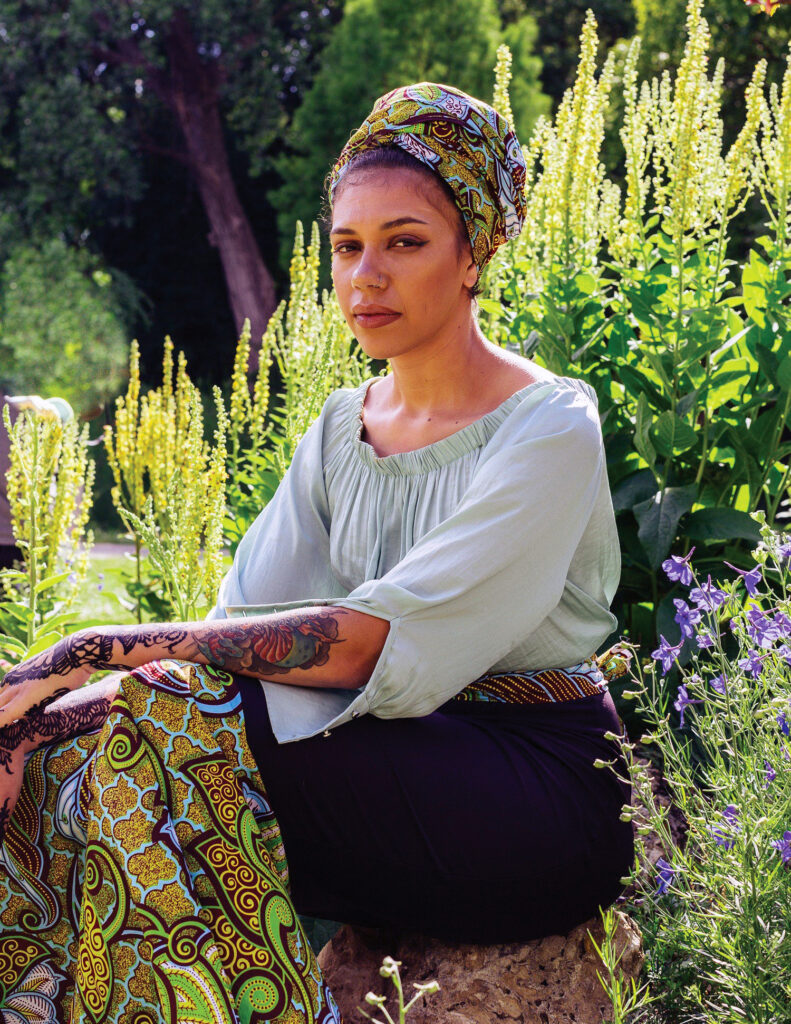
Vanessa Taylor
Writer Vanessa Taylor converted to Islam before Philando Castile was fatally shot in 2016 and spent her first Eid outside the site of his shooting. A community organizer, she had long been familiar with Black Muslim liberation theology and Malcolm X, but Islam didn’t become a reality for her until she converted. Now based out of Philadelphia, Taylor focuses on exploring Black Muslim womanhood and technology. Her articles appear in Teen Vogue, Al Jazeera English, and the Intercept, and her essays and fiction have appeared in Catapult, as Editor’s Pick in Barren Magazine, and in Belt Magazine, where she received a Pushcart Prize nomination. She was also selected to be a part of Muslim Wellness’ inaugural Deeply Rooted Emerging Leaders fellowship class, and is a 2019 Echoing Ida cohort member. Taylor came to writing through a natural progression of the community work she had been involved in, including co-founding the Black Liberation Project, a grassroots collective of Black youth in the Twin Cities. Writing is another way she can use her community organizing skills. From her perspective, she doesn’t feel like she wants to be praised for her work, but it’s quite meaningful to know that her work is affecting others. “I love seeing people interact with my pieces once they’re published, especially the fiction ones,” she says. “It’s rewarding anytime people stop me at events or message me online to tell me what a piece meant to them.” —AE
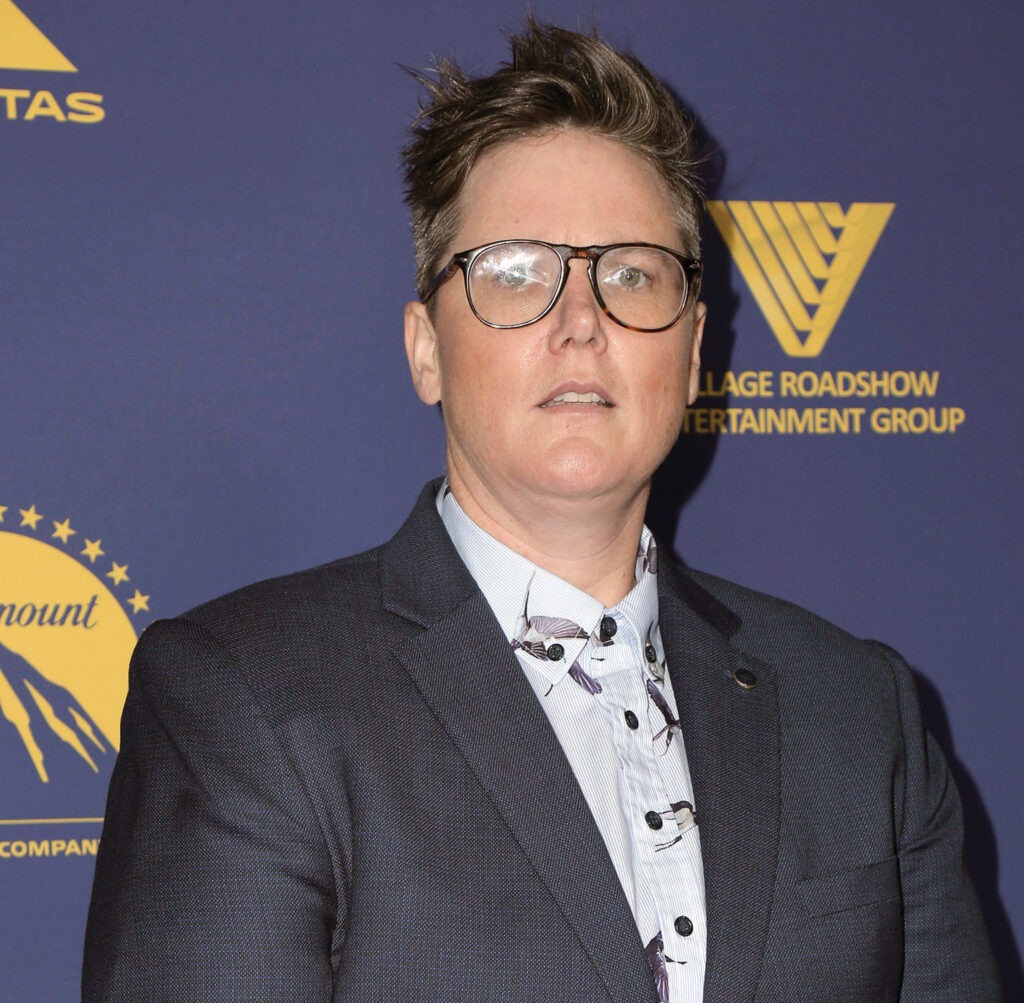
Hannah Gadsby
The breakout Australian comedian, writer, actor, and television producer Hannah Gadsby became famous overnight for her Netflix special “Nanette,” where she spent much time talking about quitting comedy. Gadsby takes issue with the very act of comedy, in fact, because so much of it has been defined by straight white guys—and arguably what she does isn’t really comedy per say. “I was breaking the contract,” she told Rolling Stone earlier this year. “They were there for comedy and then I didn’t give it to them. That tension in the room, there’s no guarantee that I can hold it. There’s a fear every time I go onstage. Every show was alive and dangerous.” While much of her special dealt with Gadsby’s unique identity (aka “not-normal,” as she has called it), her new comedy tour “Douglas” focuses more on her autism spectrum diagnosis. She’s also not afraid to get into it with the most famous of white male comedians. In a recent interview with the Los Angeles Times, she called Louis C.K. “angry and bitter.” Gadsby was raised in a small town in Tasmania, which had strict anti-gay laws until 1997, a scarily recent time. Back when she was but a young and budding comic, many of her sets were “wall-to-wall lesbian content,” but more recently in “Nanette,” she riffed on being a lesbian giving fashion advice to straight white guys: “Pull your socks up,” she said. “How’s that for humiliation?” —AE
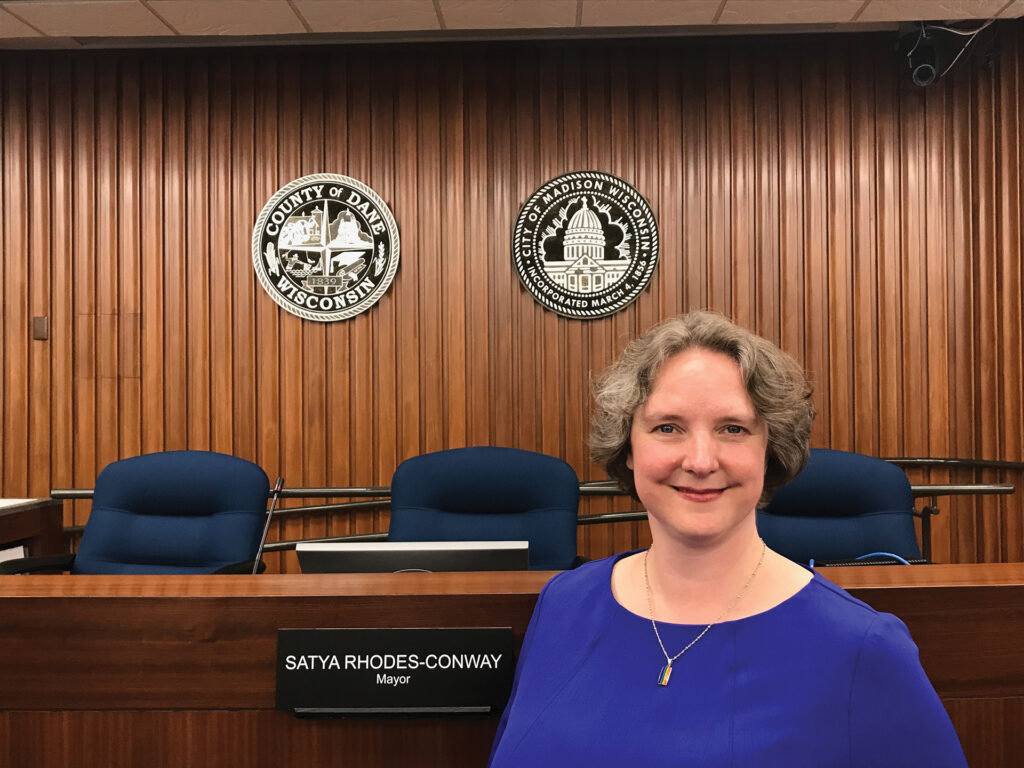
Satya Rhodes-Conway
In 2019, Satya Rhodes-Conway became only the second woman, and first openly LGBTQ person, to be elected mayor of Madison, Wisconsin, making her one of many gay and lesbian women proudly swept into mayoral office this past year. Rhodes-Conway is no stranger to the job. She served three terms on the Madison City Council from 2007 to 2013, and as the managing director of the Mayors Innovation Project while at the University of Wisconsin, Madison, she collaborated with offices across the country to promote sustainable practices and democratic accountability at local levels. She was also a member of Madison’s Food Policy Council until 2019. Although the issues she champions transcend identity politics, she is aware of how important her election is to the LGBTQ community. “One of the most rewarding things about being an out lesbian elected is the impact it has on young women, LGTBQ youth, and their families,” she tells GO. “If I can inspire just one young person to take leadership, or show one girl that she can make a difference, it’s all worth it.” —RK
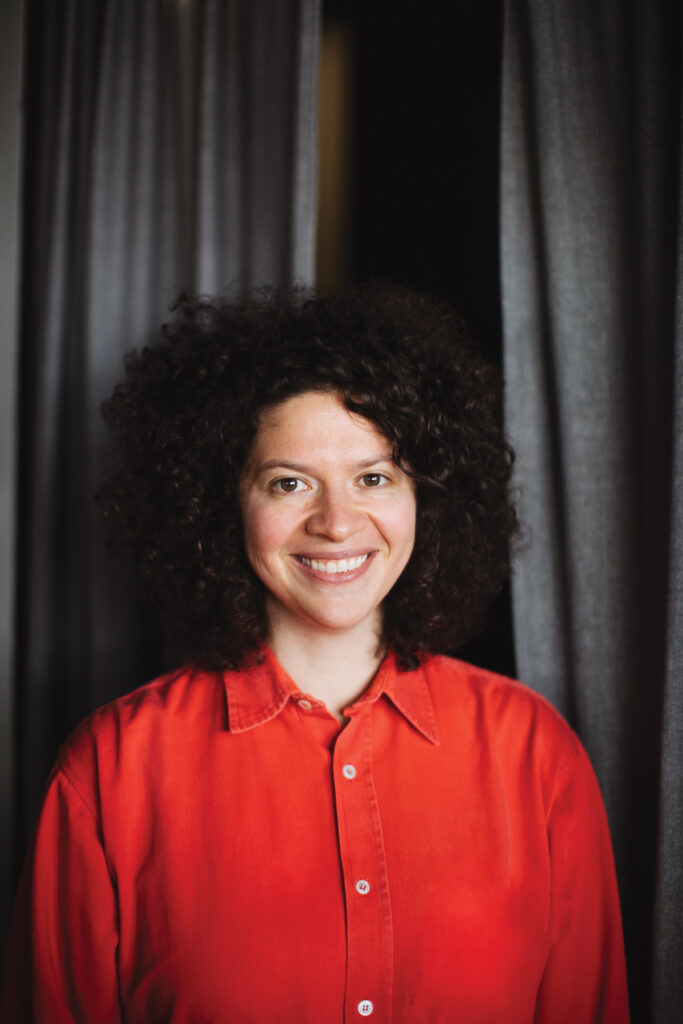
Julia Turshen
For Julia Turshen, cookbooks are an education. She used them to teach herself how to cook, which led her to a career working on them as a co-author with several big-name chefs—and Gwyneth Paltrow, too. She’s also written three of her own guides to home cooking in as many years, the most recent of which, “Now & Again,” was named the Best Cookbook of 2018 by Amazon and an NPR “Great Read.” With her own books, she is educating others on more than food. The most rewarding aspect of her work, she says, is “connecting with younger queer women about what it means to them to see the word ‘wife’ written over and over by another woman in something as familiar and accepted as a cookbook.” Turshen hosts the IACP-nominated podcast “Keep Calm and Cook On;” writes a monthly column for Food & Wine called “The Interview;” and has written for the New York Times, Vogue, Saveur, and more. As the founder of Equity At The Table (EATT), a directory of LGBTQ and POC women and gender non-conforming food professionals, Turshen is ensuring more voices like hers are brought to the (kitchen) table in a field long dominated by men. It’s an essential part of her philosophy: “No one of us speaks for all of us and all of our stories are worth sharing and hearing.” —SEJ
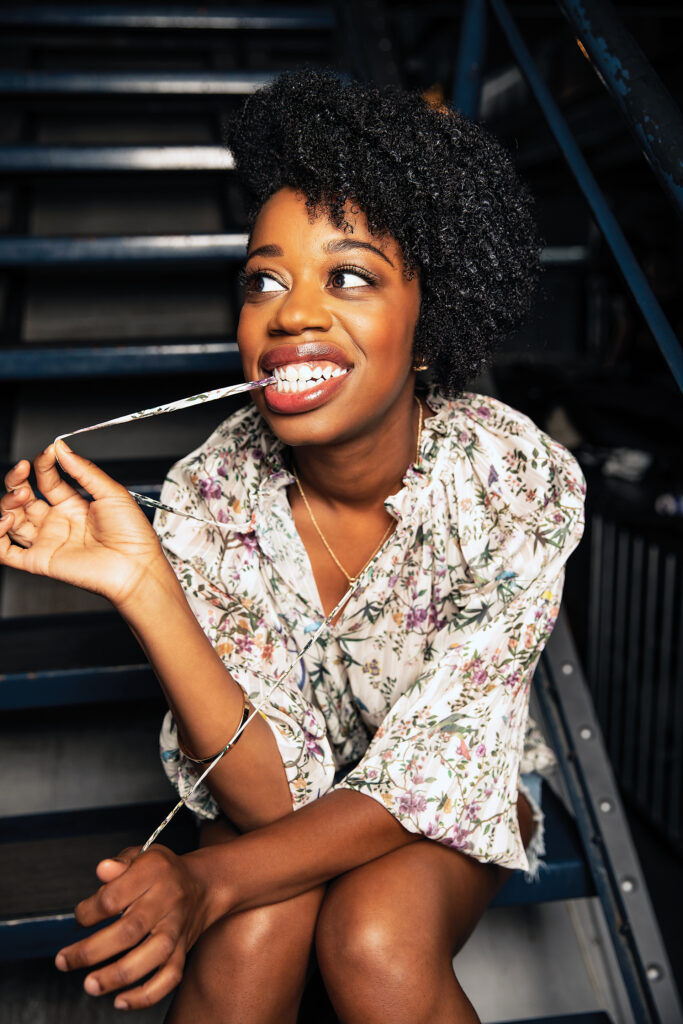
Diona Reasonover
Although you can currently catch Diona Reasonover as Kasie Hines on the hit CBS crime drama, “NCIS,” the actor and writer has some serious comedic chops. Before joining the cast of the show last year (she replaced series regular Pauley Perrette) she starred on the TBS comedy “Clipped,” and has appeared on numerous television shows including “Grace & Frankie,” “Two Broke Girls,” and “Superstore.” Reasonover, who is a graduate of Oberlin College and the California Institute of the Arts, is also a writer; her credits include “Adam Ruins Everything,” “I Love Dick,” and the Emmy-nominated “I Love You, America” with Sarah Silverman. The Detroit native now lives in Los Angeles with her wife, fellow 100 Women Class of 2019 honoree Patricia Villetto (the couple has been married since 2018). Her seamless blending of both comedic and dramatic forms shines through in the message she wishes to share with the LGBTQ community: “Take care of yourself. Stay hydrated. I believe in you.” —RK
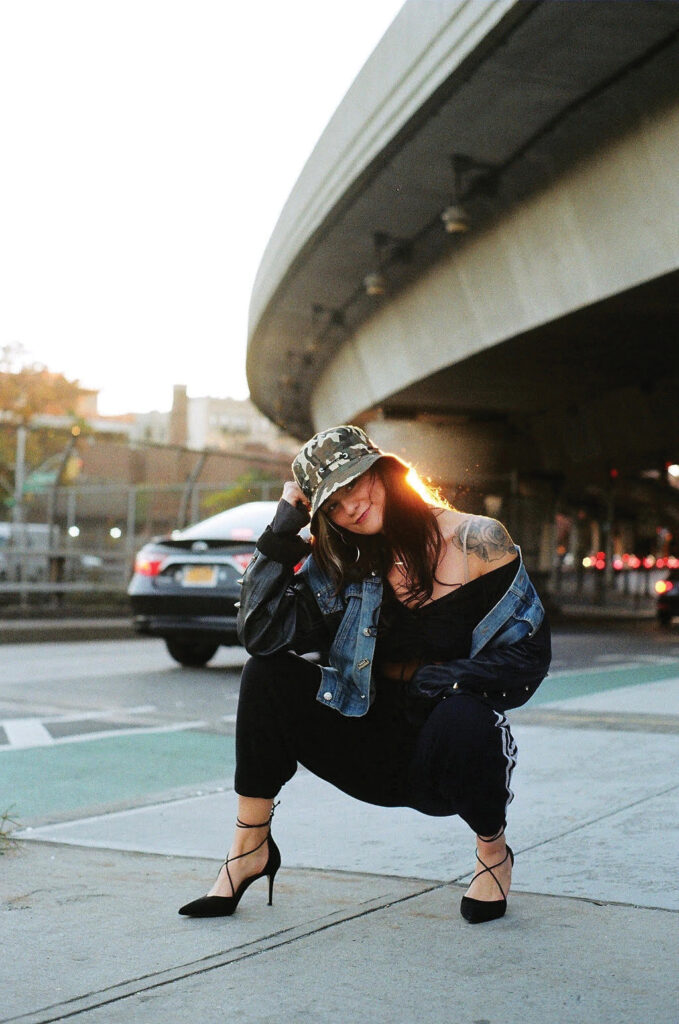
Jaime Silano
Brooklyn based DJ and talent scout Jaime Silano has built a career discovering and amplifying the stories behind emerging music. Silano manages VICE Records where she contributes as a music journalist and works on workplace community building for VICE, one of the largest media companies in the world. She is extremely passionate about her field, and it shows. “Music has saved me in so many ways, and I believe it has an enormous footprint in popular culture, and how we use that influence is crucial.” She credits an awakening to Frank Ocean, who posted an open letter on Tumblr back when Silano was in school. “I was so afraid, and he said ‘vanish the fear.’ The first woman I loved framed that poem for me. It was a symbol of the power that music and media have to shift tides for communities, and I decided then I wanted to pursue a career finding ways to create more of those moments and circulate the courage and empowerment I found in that one.” Not only is Silano passionate about music as her career, she’s dedicated to uplifting her community. “I encourage my LGBTQ community, across all disciplines, to unite in the workplace. If you don’t have affinity groups (LGBTQ, POC, people with disabilities) in your organization, be the one to organize them,” she advises. You can find Silano partnering with recording studios to host classes for LGBTQ teens on how to use music programs or orchestrating showcases for emerging LGBTQ artists at the VICE office in Williamsburg. —DT
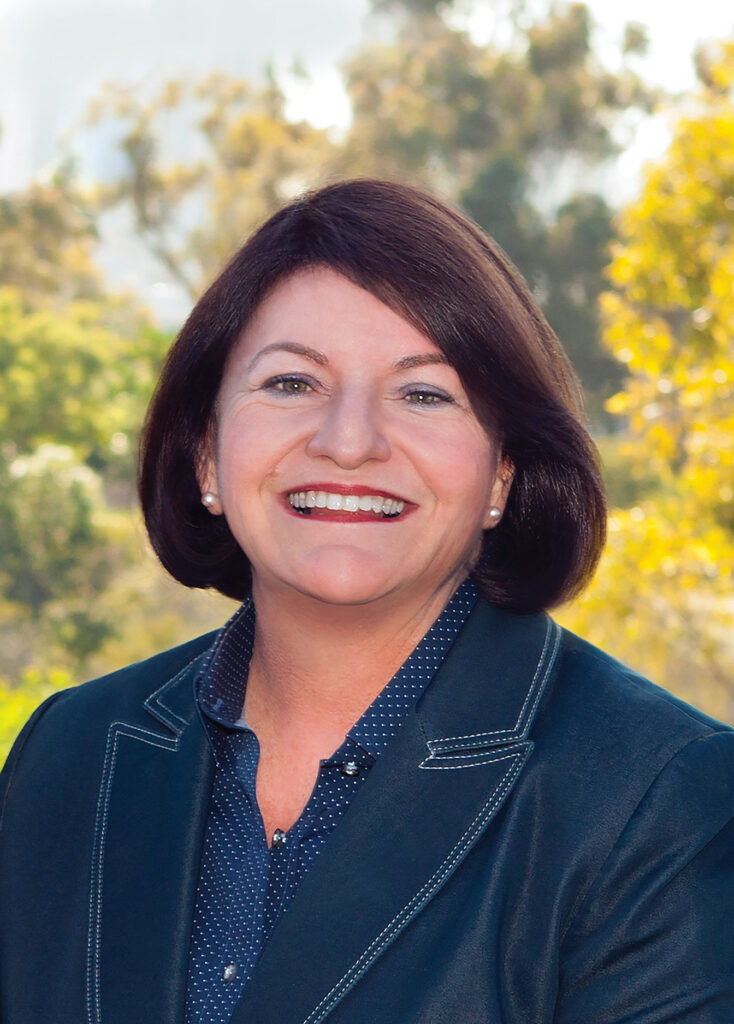
Toni Atkins
In 2018, Toni Atkins made history by becoming both the first woman and the first openly LGBTQ person to serve as the President Pro Tempore of the California State Senate. It was only the latest in a number of firsts she’s achieved throughout her political career. She was the first lesbian to be named Speaker of the California Assembly in 2014. Then, in 2017, she advanced legislation that saw California became the first state in the nation to adopt a third gender option on state-issued documents. Her own political career began when she followed in the footsteps of another first: friend and mentor Christine Kehoe, a San Diego city councilmember who was the first openly gay official elected to office in that city. From there, it was only a small leap for Atkins to run for office herself. What she finds most rewarding about politics is being able “to bring people with diverse views and perspectives together to collaborate and then have that collaboration lead to real solutions.” It’s a sentiment that echoes in her philosophy to the LGBTQ community, which can advance progressive change through unity. “Lift each other up. Keep each other safe. Always remember whose shoulders you stand on and make room for others to stand on yours.” —RK
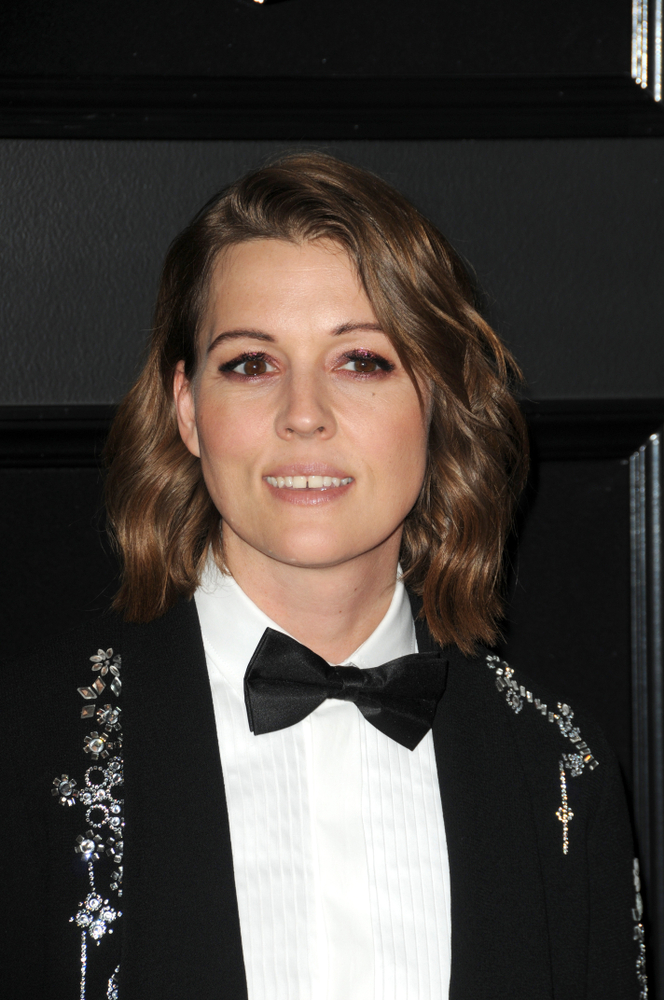
Brandi Carlile
When Brandi Carlile appeared on the cover of GO in 2015, she spoke about her latest album, “The Firewatcher’s Daughter”—which would earn the artist her first Grammy nomination—her family life, and the warm welcome she’d received as a gay artist in the Americana music community. “All this inclusiveness for a gay girl in country music,” she said, “has been a sign of beautiful things to come for the LGBTQ country music contingency.” She was right. This past year has been Carlile’s biggest yet. Her sixth studio album, “By the Way, I Forgive You,” dropped in 2018 and earned her four Grammy nominations, winning for Best Americana Album, Best American Song, and Best Americana Performance (the last two for her single, “The Joke”). “Americana music is the island of misfit toys, and I am such a misfit,” she said in one of three acceptance speeches of the night, adding that after she came out at 15, she’d never been invited to a party or a dance. “To be embraced by this enduring and loving community has been the dance of a lifetime.” —RK
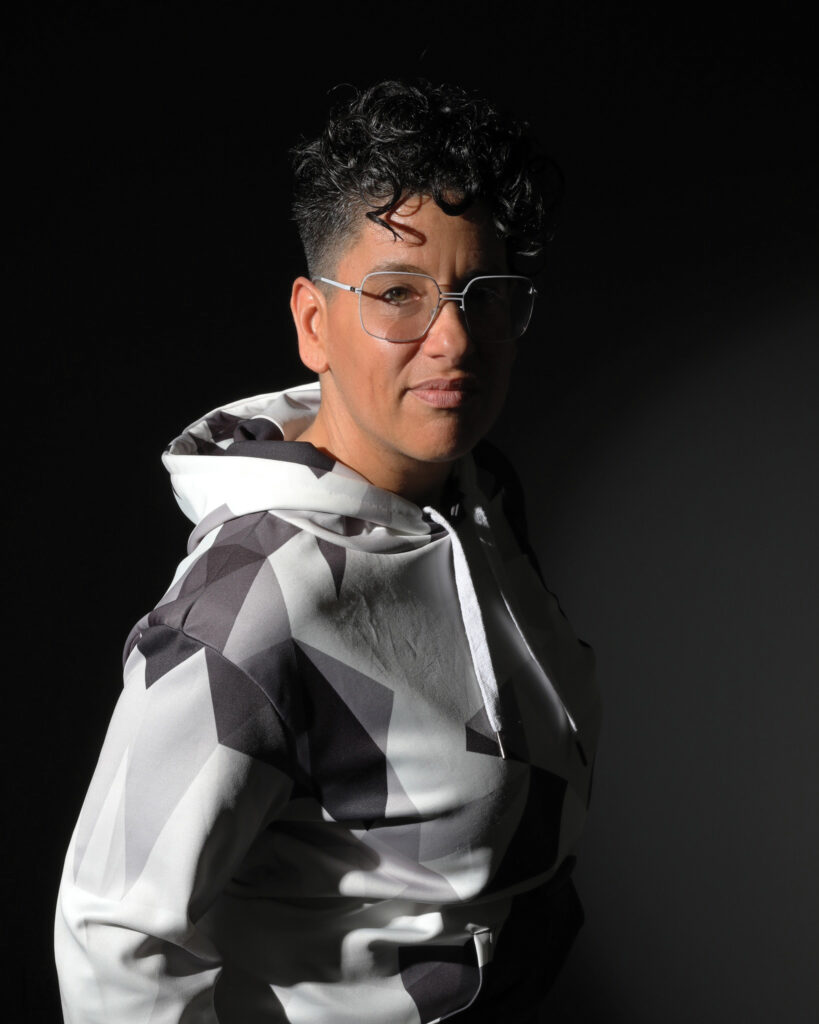
J. Bob Alotta
Since 1977, the Astraea Lesbian Foundation for Justice has been advocating social justice for marginalized people worldwide, and for its current executive director, J. Bob Alotta, job titles are irrelevant. “The most rewarding thing to me,” she tells GO, “is the magic of congregation. My purpose is to exist in, instigate, envision, strategize, and build from and for our joyous community.” The filmmaker-turned-technologist-turned social philanthropist first joined Astraea in 2011 and has since navigated the foundation—which has awarded over $40 million in grants to community betterment projects around the world—through the changing technological and political landscapes of the 21st century. Under her stewardship, Astraea has become a leader in merging technological development with social activism and has also launched the world’s first intersex human rights fund in conjunction with intersex advocates. She’s also a fierce public speaker, as much at home in front of crowds in Lesbians Who Tech summits as she is on stage at Joe’s Pub in New York City. Alotta has recently announced that she will be stepping down from Astraea, but will remain executive director through the summer. —RK

Betty Jean Pace
Betty Jean Pace is the reason they changed the application form for the Ms. Senior America Pageant. “They asked for the name of my husband; I crossed it out and put WIFE.” In that moment, Pace became the first out lesbian contestant. The pageant, held yearly in Atlantic City, New Jersey (the same state Pace hails from), is for women who have reached, as the pageant describes it, the “age of elegance.” Meaning they have passed the threshold of 60. Challenging what beauty for women of that age is, Pace, who is 60, has made a habit of defying appearances, even when she first came out. “Many people who I was close to didn’t understand at first and it got kinda ugly. I didn’t ‘look gay’ to them. I really didn’t know there was a particular look one had to have in order to be marked ‘gay.’” Pace did not have an easy time coming out, describing the process and reactions to her as “terrible.” And while the other contestants didn’t find out Pace was gay until the first day of rehearsal in June, she plans to follow one simple rule: “always be true to yourself. The more we come out, the easier it gets…I wasn’t put on this earth to hide.” That’s why she entered the competition in the first place. “I want to show the world that it doesn’t matter if you’re gay or straight to have fun, show off your talent, take chances and really just live.” —JDG
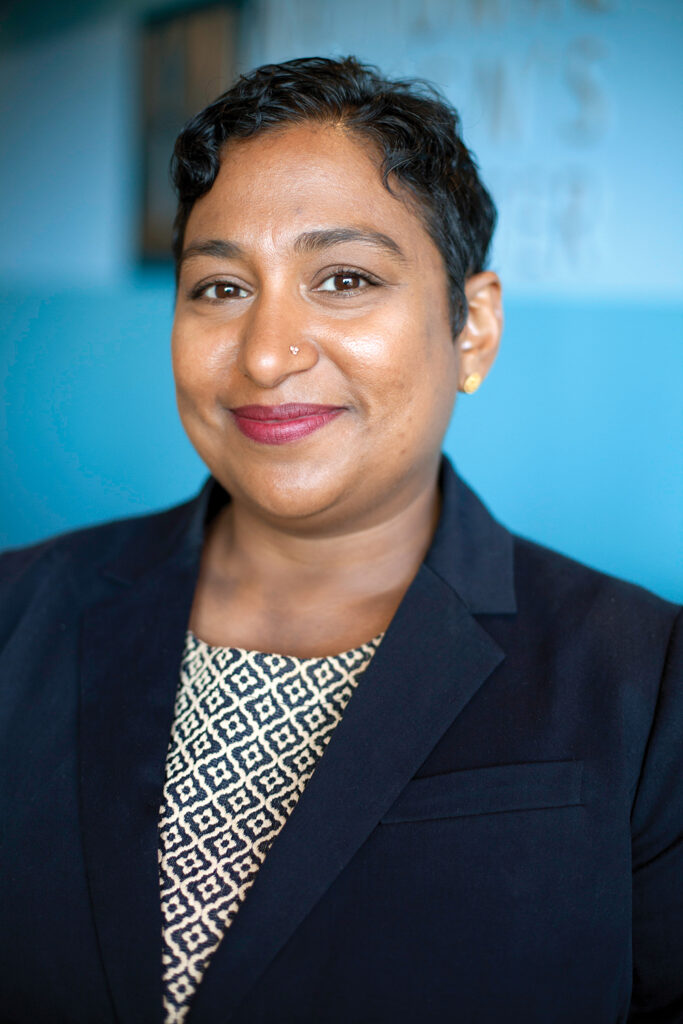
Sunu Chandy
Sunu Chandy has a way with words, whether testifying in Congress to strengthen LGBTQ legal protections, providing testimony with the U.S. Commission on Civil Rights on sexual harassment and #MeToo, or writing her own poetry. That’s right, the legal director of the National Women’s Law Center also has an M.F.A. in Creative Writing from CUNY/Queens College. “I’m proud to be a queer woman of color poet and a civil rights attorney,” Chandy tells GO. “I want to send love to all the culture change artists who create joy and community building, including through Split This Rock, a social justice poetry organization that’s so close to my heart.” Chandy sits on that organization’s board of directors, as well as the board of the Transgender Law Center. Her work has taken her from labor law, representing individual workers and unions, to the U.S. Equal Employment Opportunity Commission, to being a member of the White House Initiative on Asian Americans and Pacific Islanders Regional Working Group. In her current role at NWLC, she oversees the Center’s litigation efforts while providing strategy to create better outcomes for women and girls in all spaces, and she helped build the policies and procedures guiding the Time’s Up Legal Defense Fund. She says she’s grateful to her “terrific colleagues” at the National Women’s Law Center. “We use the law in all its forms to advance the rights of women and girls,” she says, “and to prevent and address sex discrimination, including as faced by LGBTQ folks, immigrants, people with disabilities and people of color.” —JDG
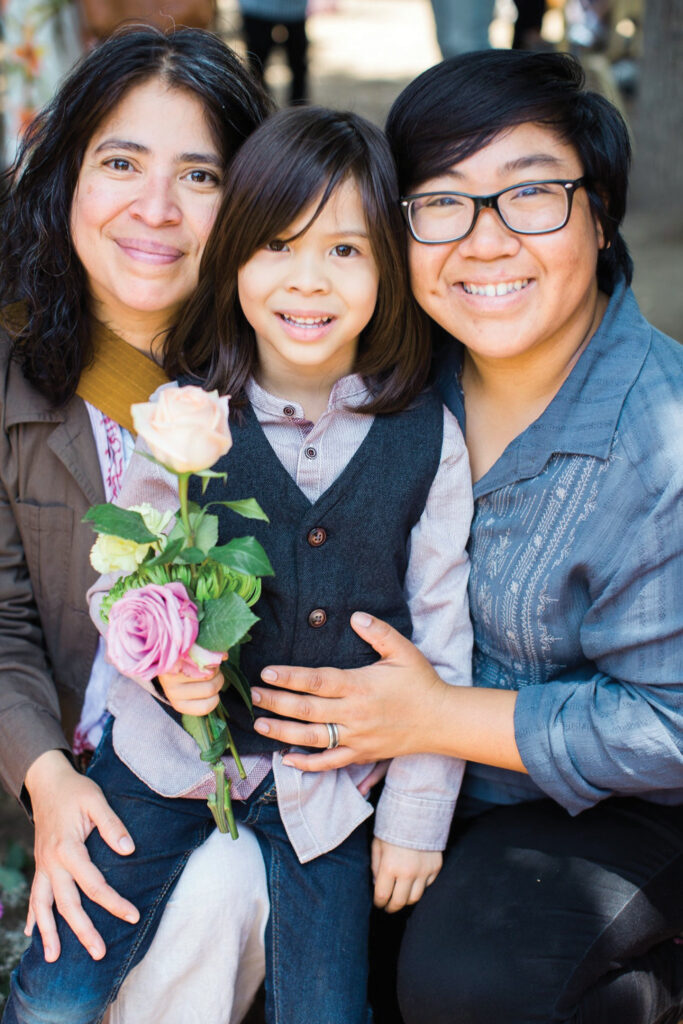
Krystal Banzon
Krystal Banzon (right) started out as a theatre director where, she tells GO, she became “curious about the power of storytelling to create change in queer communities and communities of color.” This curiosity led her to the corporate side of the entertainment industry. The first-generation Filipina-American last served as the Manager for the Programming Talent Development and Inclusion at NBC Entertainment, responsible for cultivating talented and diverse writers, directors, and actors for the network’s scripted programs. She then went back to her creative roots and made the jump into the writers’ room, staffing as a writer for the Amy Poehler-produced sitcom, “I Feel Bad.” Her personal life, much like her career, has taken a somewhat unexpected trajectory. While she says that she “once thought being a lesbian was the best form of birth control,” she and her wife now live in Los Angeles with their cat, Lobo, and their three incredible kids who are “the best thing she never thought she wanted.” She finds time to write relationship-driven dramedies “between the hours of 10pm and 2am, when my beloveds are snoring.” —RK
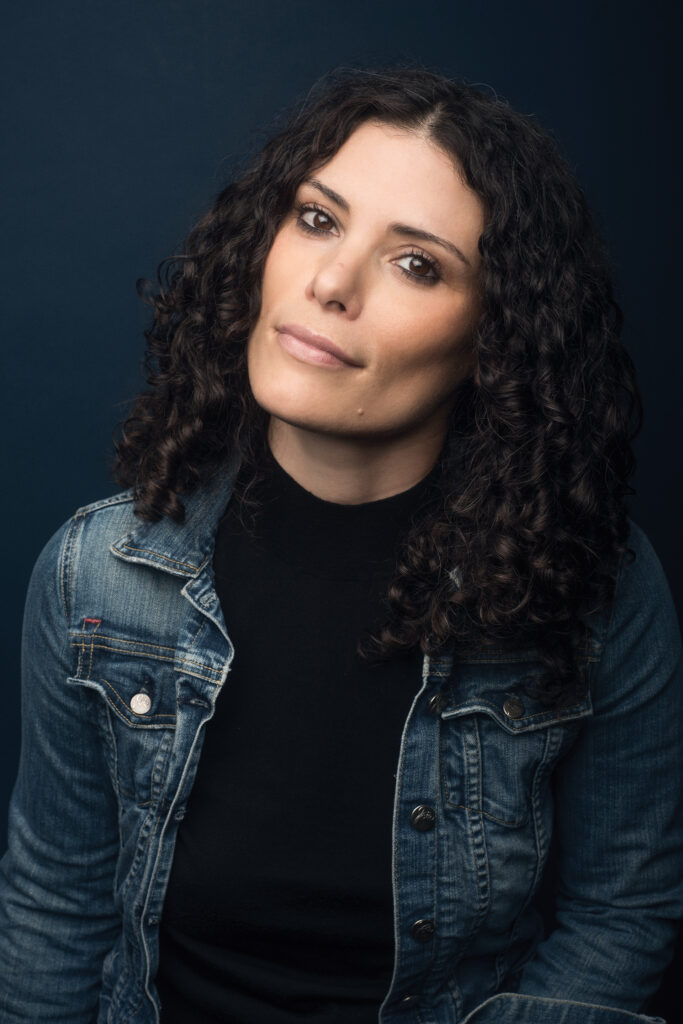
Chani Nicholas
The moon, stars, and current events are all intertwined. That’s what L.A.-based astrologer Chani Nicholas knows to be true in her heart and her queer feminist politics. A counseling astrologer for more than 20 years, Chani sees astrology as a way not to passively accept one’s fate, but as a catalyst for action and change within one’s self and the world. She’s also the astrologer for Spotify and Oprah Magazine, and her book “You Were Born for This: Astrology for Radical Self-Acceptance” (HarperCollins), out January 2020, will guide readers on how to interpret their own birth chart to radically embrace who they are and create space for their life’s purpose. But her magical, radical path wasn’t always so clear. Growing up in Canada, she received her first astrology reading at age 12 and has been a student ever since. It took many years to embrace astrology as her vocation. “When I finally hung my astrology shingle, I was almost immediately overwhelmed with business,” she says. With more than 200,000 Instagram followers, her posts range from inspirational, feel-good quotes to explanations about how the Alabama abortion ban happened on a week with a full moon in Scorpio and Venus conjunct with Uranus, which especially impacted people who could become pregnant. She’s also a happily married queer woman. She says that she and her wife, Sonya Passi, who is the CEO of the nonprofit FreeFrom, share a dedication to creating spaces where healing justice can occur, and is one of the foundations of their marriage. “Being with other queers helped me to radically accept myself which led me down a path to eventually radically accept my work with astrology, find my wife, all of which has all allowed for much abundance,” she says. —AE
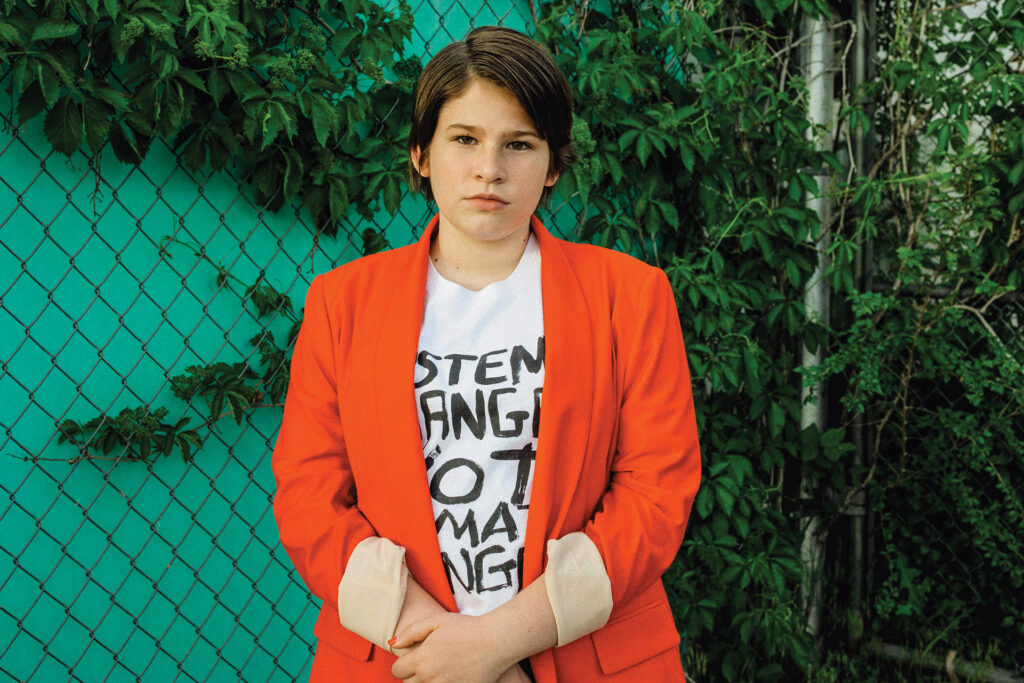
Haven Coleman
Climate change is one of the most urgent issues of our time, and yet many of us, including elected officials, won’t be the ones to deal with the more drastic global effects. It makes sense, then, that the young who inherit our world are taking action today. Leading the charge is 13-year-old Haven Coleman, a climate activist and co-founder of the US Youth Climate Strike, a global movement which, in March and May of this year, organized two day-long school “strikes” for student demonstrators to demand action be taken on climate change. Coleman and other leaders hope that the strike will foster young people’s engagement with environmental issues and force legislatures and policymakers to affect change now rather than later. Her activism began when she was 10 and started to learn about the consequences of climate change. However, the activists she saw leading the charge were nothing like her. “All I could see were mostly cis, male, straight people leading the movement,” she says. “I was sad that the LGBTQ community was not seen in my work, not in the leaders of organizations.” Rather than accept the status quo, Coleman decided it was time to take action. In addition to founding the climate strike, she speaks about social justice and environmental activism at schools across the country with the help of Climate Reality Project. She also collaborates with other environmental action groups like the Sierra Club, Sunrise Movement, and 350.org. While saving the world is a lonely task, especially when legislative action is slow, Coleman wants those who care about enacting responsible change to know they are not alone. “It may seem like it, but you are not. The climate fight, every fight in this world, has people like you. You may not see them, you may not know that they are even like you, but we are here.” —RK
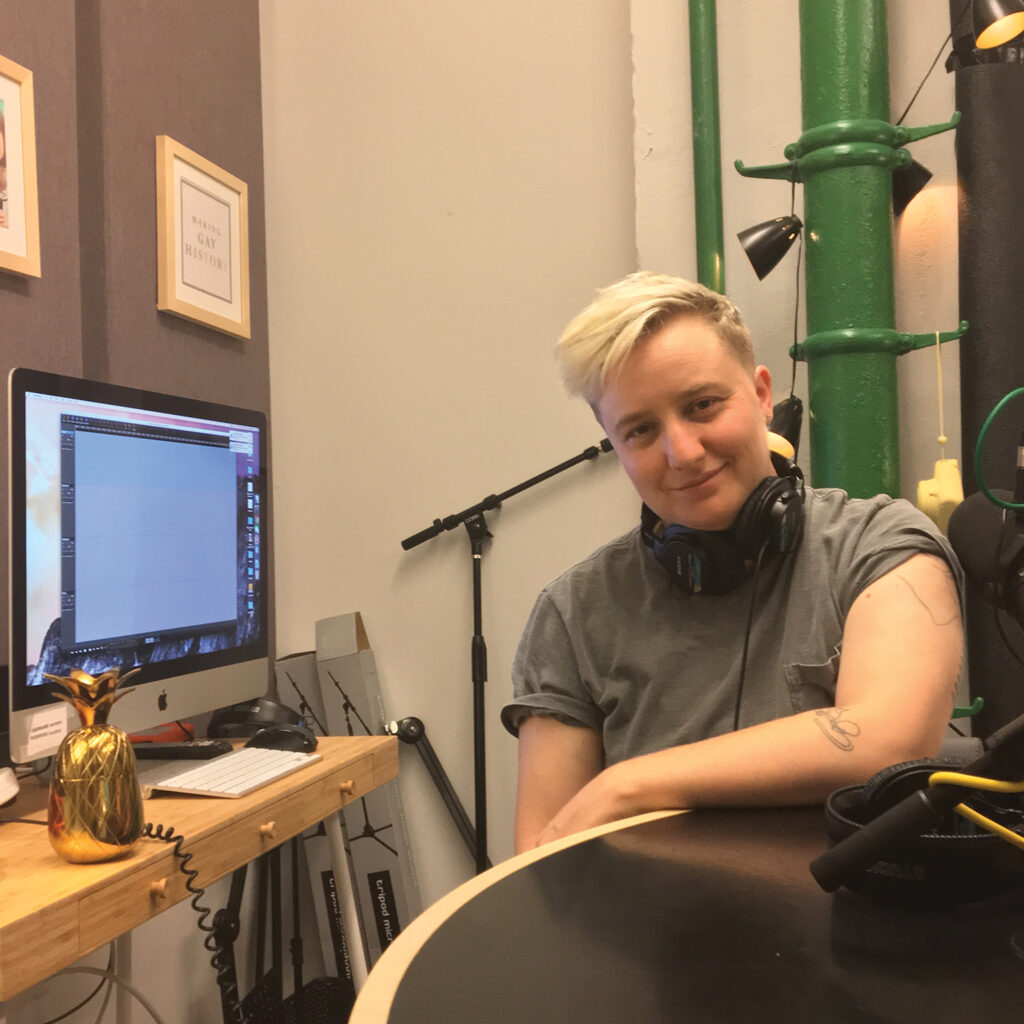
Jenna Weiss-Berman
Jenna Weiss-Berman is a master of podcasts. She is the co-founder of Pineapple Street Media, a full-service and self-financed podcast company that helps potential podcasters get comfortable with this burgeoning audio form. The company has made shows like “Missing Richard Simmons,” the serial-style miniseries about the disappearance of the fitness diva, and the New York Times culture podcast “Still Processing” with staff writer Jenna Wortham and critic-at-large Wesley Morris. Pineapple has produced other buzzy podcasts too, like the behind-the-scenes look at Hillary Clinton’s election year in “With Her” and a talk show with Lena Dunham. Weiss-Berman honed her auditory skills at the Moth and StoryCorps, and also started a podcast department at Buzzfeed. An out and proud queer person, Weiss-Berman says that she “never exactly ‘came out’—my early obsessions with my babysitters and requests for ‘Prince Arthur’ haircuts made the situation pretty clear,” she says. Growing up in the very queer city of Northampton, Mass., which Weiss-Berman acknowledges was “an incredibly lucky break,” her supportive parents took her to gay a cappella as a kid. She first discovered her interest in music and radio while making Ani DiFranco mix tapes and loving musical theater. At Oberlin College, she achieved auditory success running the radio station. But it was moving to New York after school and joining StoryCorps that opened her eyes to the diverse life experiences of folks across the U.S., and truly got her hooked on storytelling. “I would have been happy being a broke public radio producer and never thought podcasts would become such a hot medium,” she says. “I took some risks starting a company but I’m so glad I did.” —AE
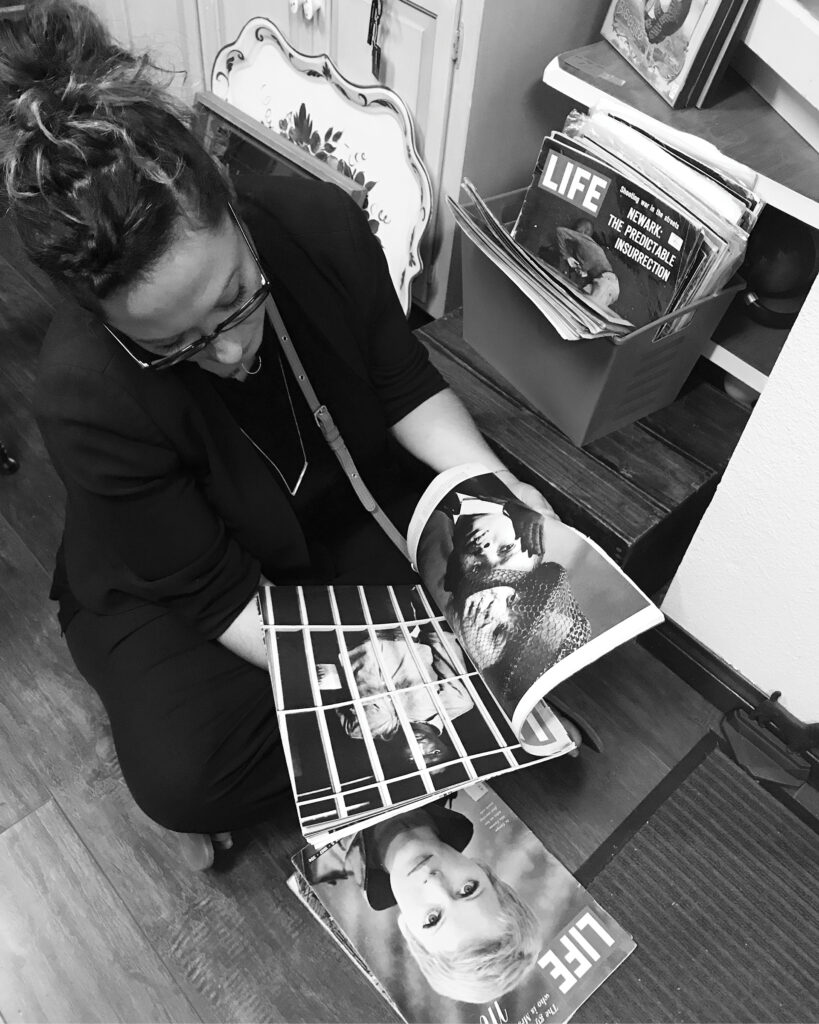
Kiki Castel Landon
As a child growing up in a working-class family in the South of France, Kiki Castel Landon (aka Kiki Collagist) was encouraged to use her imagination. This was how she began to piece together odd things, to take one object and re-imagine it as something different. And while she might not have always appreciated the usefulness of this ability as a child, this skill would come to define her career as an artist. “It took me years to have the confidence to believe I truly had something worth saying,” she admits. “I didn’t go to any fine art schools and I feared criticism. However, much like being out, there is a peace and freedom that comes with claiming your authentic self.” Her 1 million-plus Instagram likes prove that what she has to say is worth saying. After moving to Los Angeles, she landed an internship at the BG Gallery in Santa Monica; her work was noticed by curator Om Bleicher, who began featuring it in the Los Angeles gallery. Later, she was asked to present her work at the prestigious Los Angeles Art Show. A devoted Surrealist, she is drawn to the movement by its inherent similarities to college. “For me,” she says, “Surrealism is actually a way to express a richer, more complex and truthful depiction of reality—putting together two or more seemingly unrelated things and exposing the interconnectivity of all things.” —RK
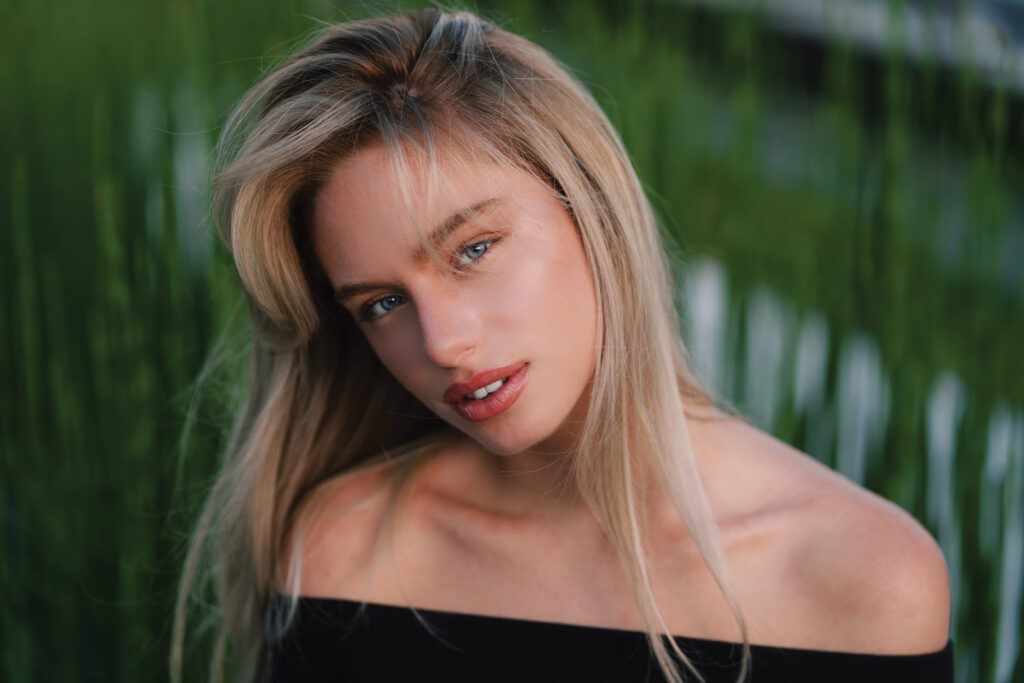
Faithlynn Gianna C
Holistic health is a passion for Faithlynn Gianna C, who works with private clients in New York City and Los Angeles. “It’s something I felt called to from a very young age,” she says. At 15, she became one of the youngest 500-hour yoga teachers on the East Coast. She is currently in the works of coming out with a product derived from all organic ingredients from around the world. Out and proud now, she didn’t always have an easy time accepting who she was. “I was constantly told that being a homosexual is a sin. I had such a tough time coming out to myself. I was homophobic toward MYSELF,” she says. Coming out to her mother, a born-again Christian, was hardest. But she feared her father’s reaction, too. “After I was outed to him, he quickly came to me and said ‘Faithlynn I love you, I’m so proud of you. As long as you’re happy, I’m happy. Ever since you were a baby, what did I always tell you?’ I replied with, ‘You be you.’” It’s a phrase that this model and an actress now lives by. After coming out to herself and her family, she had to contend with society. “I’ve felt very discriminated against by the LGBT community for being a femme lesbian. I was told there was no way I could be gay or that I had to be bisexual. Not a good feeling,” she says. “Don’t let anyone tell you who you are or who you can and cannot love. Let’s love EVERY DAMN LETTER and be community!” —DT
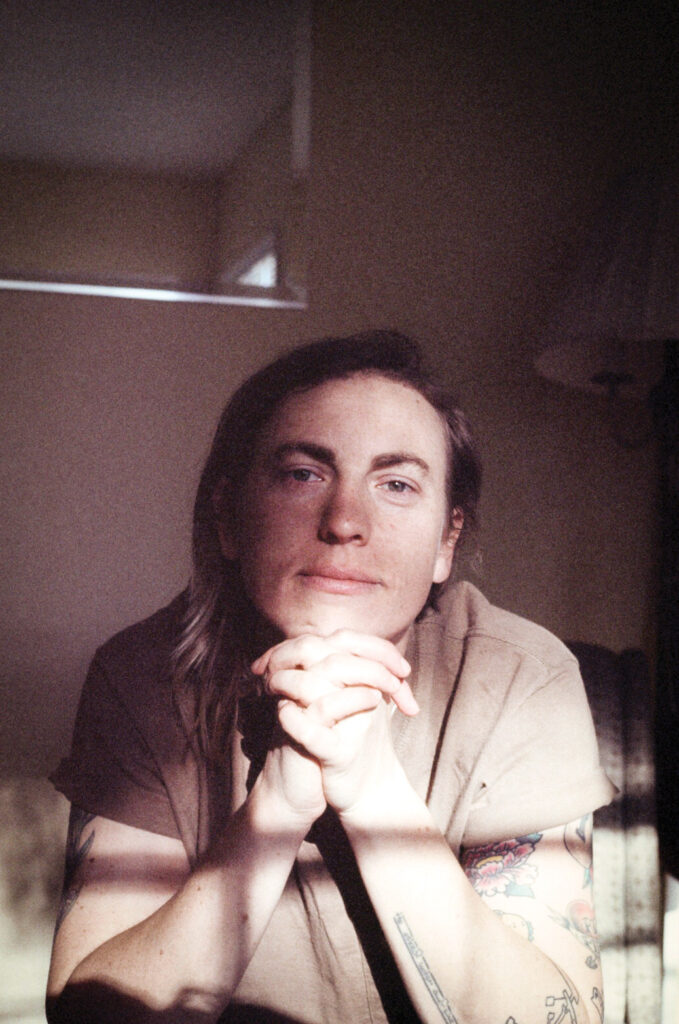
Johanna Chase
Not many people can say they were offered help by Madonna’s business team at only 16 years old. Even fewer can say they turned the pop legend down. But Johanna Chase wanted to allow her music career to evolve in its own way, and it did; she emerged from the Christian rock scene in Seattle to come out as queer and non-binary, and now she’s an award-winning indie singer-songwriter who was once dubbed by a judge at an LGBTQ lip sync battle the “Susan Boyle of lesbians.” (That judge, incidentally, was Page Hurwitz, Wanda Sykes’ co-producer.) Now in the studio working on her eighth album, Chase sings about everything from the mundane (“sitting in traffic”) to her experience growing up in an evangelical household. “I was very involved in my religious community, invested in the inner work of spirituality and the communal aspects of it, especially the music programming,” Chase tells GO. “It was hard to let go of the future I had so easily imagined for myself, but finding out what a true and secure romantic connection and partnership felt like, allowed me the safety and support to know I was just moving along my path in the right direction.” Chase is proud of her work with kids via a school music curriculum she created. “The joy of teaching music has surpassed the bounds of what any sort of religious position might allow for,” she says, “and I get to be completely me.” And while her own young adulthood can seem far in the past (she’s 33), she keeps her story close as “a reminder that even a close-minded, religiously zealous teenager can be transformed into a super proud queer because of love.” —SEJ
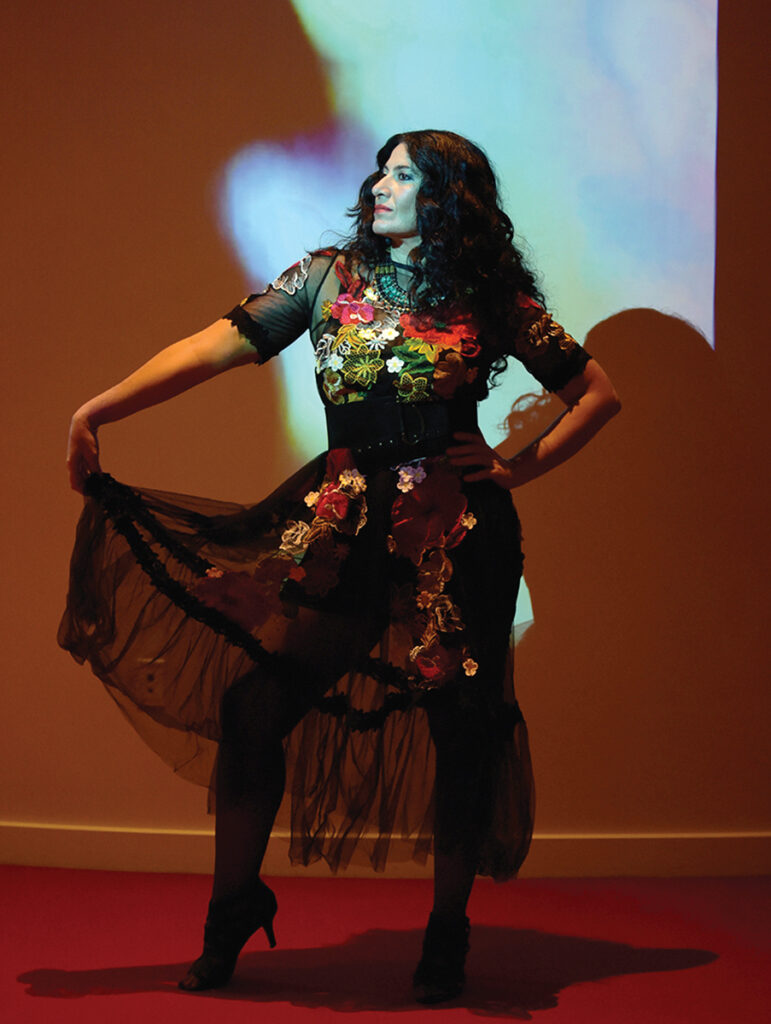
Parisa Parnian
The classic salons of French intelligentsia of the 17th and 18th centuries are getting a 21st century makeover thanks to Parisa Parnian. In 2017, the L.A based artist and designer launched Savage Taste Persian Suppers + Salon, pop-up dinners that Parnian hosts in her Silver Lake home with food she prepares herself inspired by her Iranian ancestry. Fully inclusive affairs, these dinners have become popular gathering places for L.A-based LGBTQs and people of color, providing a safe community for them to meet and share ideas with like-minded individuals. Savage Taste is part of Parnian’s label, Savage Muse, which also serves as a design studio and lifestyle brand for intersectional markets. No stranger to queer fashion, Parnian became known to the community with Rigged Out/Fitters, one of the first queer fashion labels in Brooklyn in the 2000s. It was even featured on “The L Word.” The world of Savage Muse is one into which Parnian seems to have been born. “Whether I am illustrating/designing something for a client or hosting a group of people at my dinner parties,” she says, “I get to work and be around exactly the kind of people I want to surround myself with: beautiful, intersectional, diverse, kind humans who want to celebrate inclusivity with me in style.” —RK
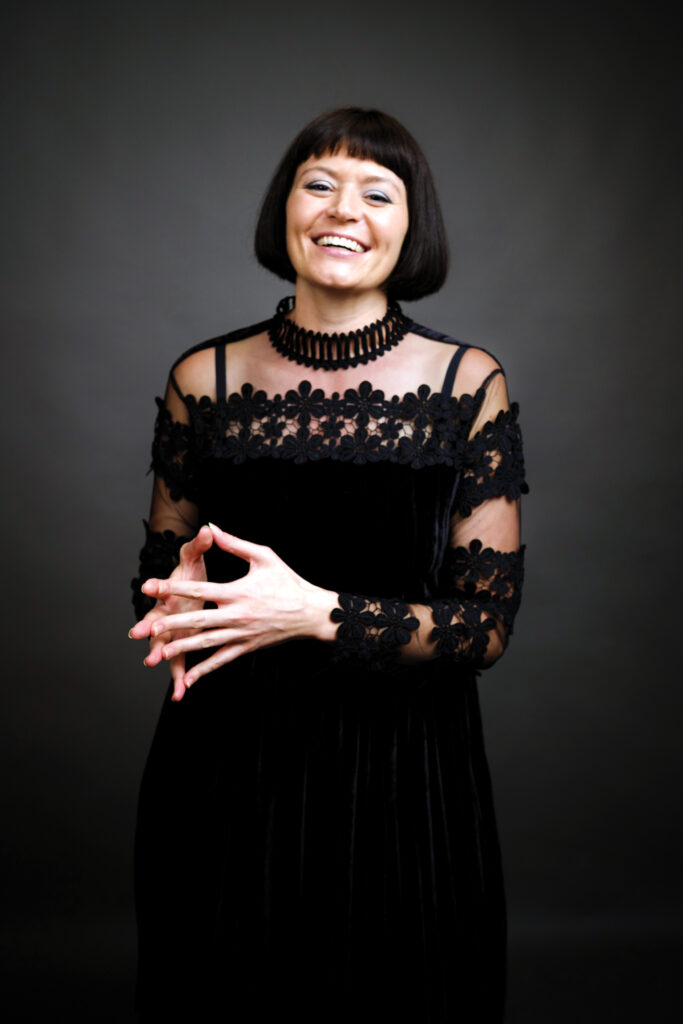
Erin Cech
When Erin Cech was an undergraduate studying electrical engineering, she was sometimes only one of two or three women out of a class of 50. “Sexual identity,” she tells GO, “was virtually off the table as a topic of conversation inside or outside of classrooms.” The experience made her curious to know more about how sexual identity affected a person’s role in professional and academic communities. Today, she’s a sociologist at the University of Michigan and is known for her groundbreaking examinations into the systematic biases that LGBTQ individuals face in STEM fields. Her research was the first to document how implicit beliefs and cultural systems create a cycle of discrimination in professional settings, leaving many LGBTQ employees marginalized and often suffering both professionally and personally. Her decision to move away from engineering and into sociology was a result of her undergraduate experience, and the realization that, in order to both acknowledge and fix discrimination, empirical evidence was needed to prove such discrimination existed. “Researchers are only beginning to understand the myriad ways these disadvantages can manifest, and understanding them is the first step toward taking action to undermine them.” For Cech, the most rewarding part of her work is that it “allows me to give voice to the experiences of LGBTQ persons who might not be in a position to be able to stand up to supervisors, co-workers, or professions, and provides clear data to start conversations within organizations and institutions.” —RK
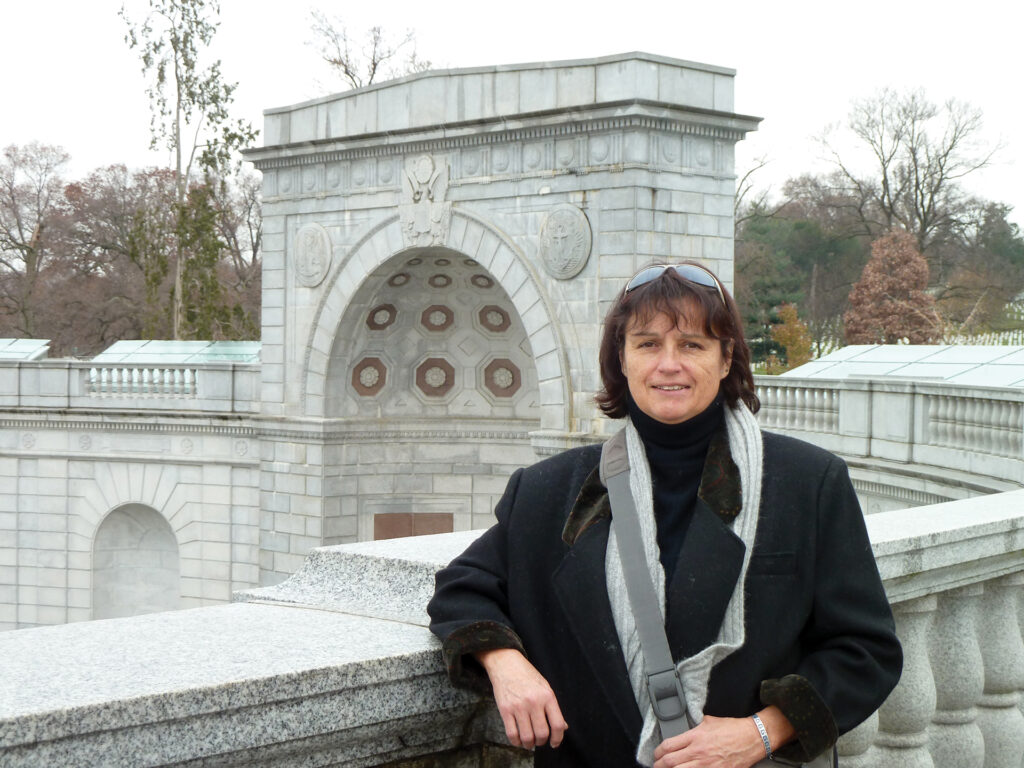
Julz Carey
Julz Carey, president of American Veterans for Equal Rights (AVER), knows firsthand the support that LGBTQ military veterans need. By all accounts, her 20-plus years with the Coast Guard were a great success. In 1977, she was one of 24 women selected to service aboard military vessels. She later served as an instructor in maritime training academies, a team leader for Pacific Area Training, and manager of search and rescue cases on Puget Sound. However, the harassment she witnessed of LGBTQ servicemembers kept her in the closet about her own sexuality. “As time went on,” she tells GO, “I realized I might someday have to choose to stand up or become another statistic of the Don’t Ask, Don’t Tell disaster. I vowed to myself I would stand up.” Now retired, Carey leads AVER, a nonprofit organization that advocates for equal treatment of LGBTQ servicemembers. Founded in 1990, the all-volunteer organization led the fight to repeal DADT and now works to ensure that LGBTQ servicemembers are protected from further discrimination. “The range of issues affecting our LGBT military family is pretty routine,” Carey says, “ranging from housing, medical, and family care concerns. The current climate that excludes trans individuals is not only harmful to the military but is a step backwards for the entire military community.” But as long as the military environment remains exclusive, there will be veterans like Carey willing to fight for change. —RK
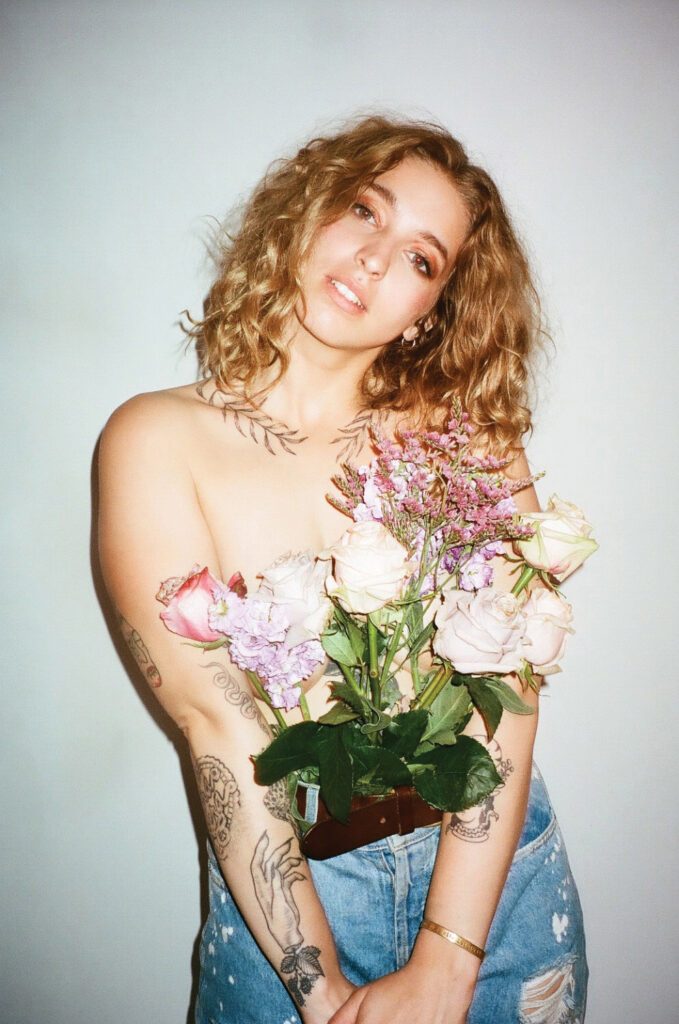
Mira Mariah
For Brooklyn-based tattoo artist Mira Mariah, art is a mission of reclamation. As women, she says, “we are often prodded, objectified, and our autonomy put in jeopardy. Through tattooing we often say, if not to the world, then to ourselves, ‘This is mine. I am mine.’” But for Mariah, who has designed for the likes of Ariana Grande, Piper Kerman, and Ilana Glazer, the reclamation of the body transcends ink. As a disabled artist, she advocates accessibility, both spatial and emotional, for people with disabilities. And while consulting for some issues may be routine, others might not be as obvious. “Is there a quiet room where people can take a short break from the chaos of the body? Will there be strobe lights? If there’s a video playing, will there be subtitles?” Asking these questions helps Mariah to understand the relationship between bodies and the spaces they occupy, with the aim of making people more comfortable with their surroundings—not unlike how a new tattoo could make one more comfortable in their own skin. —RK

Scarlett Snow
Scarlett Snow (given name: Miranda) is a North Carolina grown, Florida raised, New York City transplant. She’s built her career with a foundation of classical dance training and molded herself into a tiny, fiery, modern burlesquer and LGBTQ entrepreneur. Working within nearly 100 percent queer establishments across the East and West Coasts, Snow’s projects are flourishing. Her troupe, Honey Burlesque, which she described as “the gay girl gang of nouveau burlesque,” is made up of mostly LGBTQ ladies who only perform in queer community spaces. In addition to Honey’s monthly residency with gay party staple Hot Rabbit, Snow introduced a new night for LGBTQ womxn fondly named, “Dip Me in Honey.” The troupe’s party now has a monthly spot at Bizarre Bushwick, with plans to expand their parties to more queer spaces across the city. “For me, these parties are more than just parties,” Snow says. “They are safety, expression, and so filled to the brim with love it’s insane.” In her line of work, Snow feels fortunate to see people who are not out in their everyday lives being able to live freely. “Even if it’s just for a weekend or a couple hours at a gay, little shindig. Those moments are so precious, and I’m just happy I get to be a part of them.” Up next: catch Snow dancing throughout New York City with Honey Burlesque, in Florida with Les Vixens & Pandora Events, and in California at The Dinah. —DT
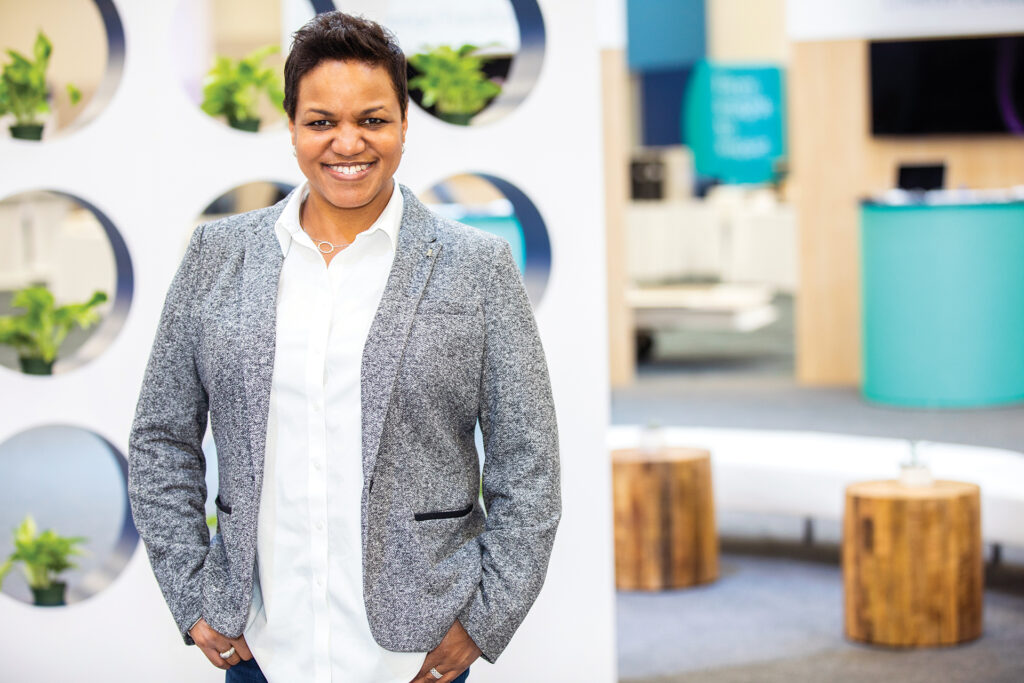
Rosanna Durruthy
When Rosanna Durruthy began her career as a diversity leader for large corporations, “diversity didn’t exist,” she tells GO. “But I’ve been fortunate to be a good listener, a problem solver, and someone who believes people hold great talents deep within—we just have to unlock the hidden potential.” Durruthy became an influential mind in the diversity and inclusion space, bringing broad, cross functional, human resources leadership experience in attracting and developing high performing talent. She has been the diversity leader at companies like Cigna, Vivendi Universal (Seagram), and Merrill Lynch. Now at LinkedIn, her focus is “empowering all employees, members and customers to realize their full potential” by “foster[ing] spaces to welcome, appreciate and value ourselves, and others.” Durruthy is part of building a strong culture that creates a sense of belonging for everyone. “It’s truly awesome,” she says, “opening the doors for people to be better versions of themselves and helping people see the possibility of their greatness through what they accomplish with others.” Durruthy expands on this outside of her job; she’s also served as a member of the HRC Business Advisory Council as well as on the Board of Lambda Legal. Additionally, she is an angel investor and an advisor to startups such as Viridis Learning, Emmy-nominated Encantos Media, and Strive. She applies the same high standards to all the arenas she touches. “The path to equality challenges us to be strong, courageous, and loving,” she says. —JDG

Tara Belmont
As a young gun Queens-based art director, Tara Belmont is passionately taking on the perpetual boys’ club that is the advertising industry with little mercy for tendentious marketing jargon and heaps of dark humor. “I once thought that my dream would be to produce work that felt rewarding, that made a difference and felt wholly personal,” Belmont tells GO. “Yet, as I progressed in my career, the intersection of art direction and my sexuality became central to my identity… I began to find clarity and purpose for helping others to find comfort in their skin, wherever that may be.” Although she specializes in both luxury fashion and beauty on the corporate side of her career, Belmont has been taking her creative vision over to the world of short film, garnering high praise and acclaim with multiple small festival awards already under her belt for art direction and production design. While Belmont is comfortable in herself enough now to give others space to express themselves, she didn’t really come to peace with her sexuality until she was 25. It was then that she adopted a “f*ck it” attitude, immersed herself in the New York City lesbian scene, and discovered a community of people just like her. Through that community, Belmont learned to always make her professional spaces safe and open. “In an industry that can often be harsh, unforgiving, cruel and misogynistic, I hope that I can be a small beacon of light that provides a constant stream of fun, talent, love and—as always—a sprinkle of dark humor.” —DT
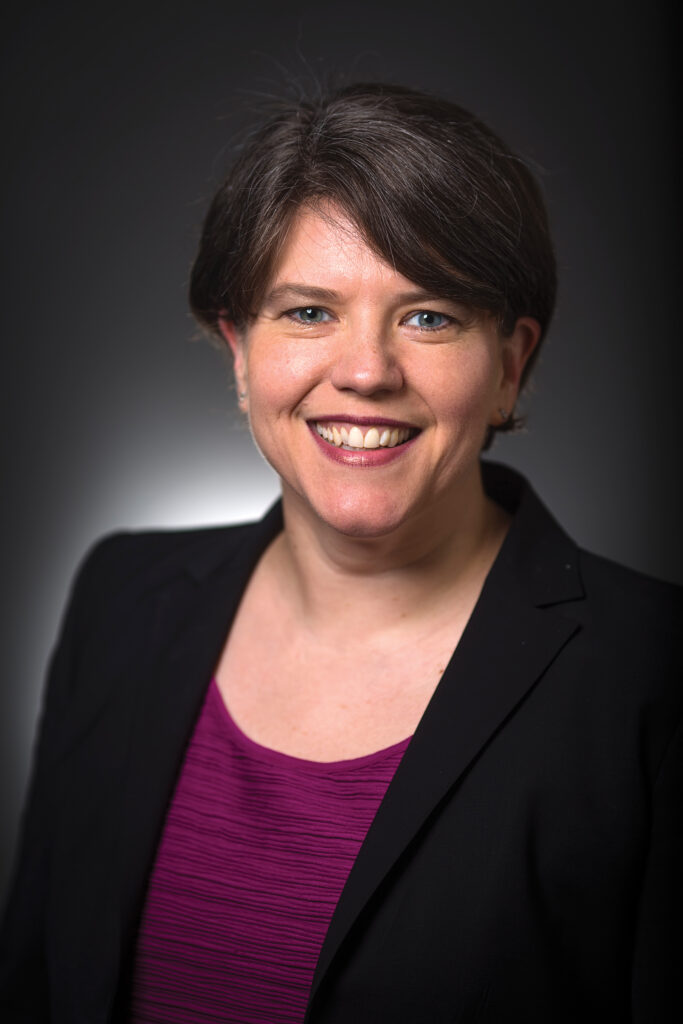
Sharon McGowan
Sharon McGowan’s early career was marked by two landmark victories. She was part of the team that brought Lawrence v. Texas to the Supreme Court, which struck down sodomy laws still on the books in 13 states. She was also later lead counsel in Schroer v. Billington, which ruled transgender or transitioning individuals were guaranteed protection under existing sex discrimination laws. These cases marked the beginning of her career as a legal champion for LGBTQ rights. While with the Justice Department in the Obama administration, she was critical in reversing the Department’s defense of DOMA and in crafting the argument for marriage equality that advanced to the Supreme Court. She promoted the protection of gender identity under existing sex discrimination laws and, while with the U.S. Office of Personnel Management, saw the implementation of policies protecting same-sex benefits and transition-related health care. She is now the chief strategy officer and legal director for Lambda Legal, where she and her team continue to fight against discrimination in both military and civilian sectors, including by opposing the appointments of anti-LGBTQ judges to federal positions. Although it might be tempting to let today’s current political and judicial climate get us down, McGowan reminds us that “[w]e are brave, beautiful, and resilient, and we cannot let the forces of hatred and fear break our spirits.” For her good fight, she was among the winners of the American Bar Association’s 2019 Stonewall Award. —RK
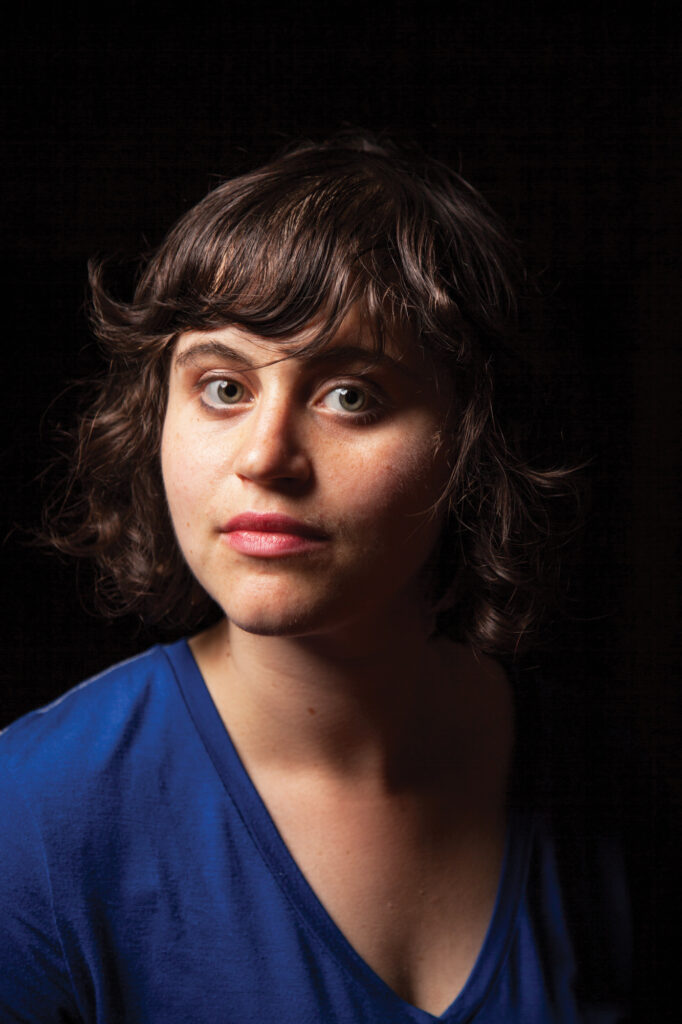
Alicia Eler
Selfie connoisseur Kim Kardashian and writer Alicia Eler have a lot in common. Eler is the author of “The Selfie Generation: How Our Self-Images Are Changing Our Notions of Privacy, Sex, Consent, and Culture” (Skyhorse, 2017), a close-up take on the selfie cultural phenomena that Kardashian basically invented. In her groundbreaking book, which was reviewed worldwide, Eler unpacks the selfie on all levels, from how teens are using the visual language of funeral selfies to why for some queer people of color it’s been a mode of self-representation. “To be seen and heard is powerful,” Eler says. The paperback version along with a new afterword is due out this coming August. When she’s not musing about the selfie phenomenon, she is covering art in the Twin Cities for the Minneapolis Star Tribune, where she currently works as the visual art critic/art reporter. A native of Chicago and a longtime resident of Los Angeles, she’s contributed to numerous magazines, writing personal memoir essays like “What is the Lesbian Dick Pic?” for New York Magazine, and “I don’t call myself bisexual — I let my stories tell themselves” for the Guardian. She’s written for countless art publications such as Artforum, Hyperallergic, Art21 Magazine, and Aperture Magazine. The selfie is only one form of expression that appeals to this language buff. Eler speaks Spanish and is currently learning Turkish to connect with her Turkish identity (her father is from Istanbul). —JDG







